Nov. 19, 2007

I'm not gone, just busy. News you've been breathlessly awaiting:
» We hosted a Halloween party. Ellen was a corked bat, I the Black Sox scandal. Howard Hughes, Bob's Big Boy and disgraced NASA astronaut Lisa Nowak all showed up. (The theme was "Scandal!" It turned out to be harder to dress for than we thought, since most scandals are perpetrated by white men in suits, and it takes a special person to make that fun.) We had way too much food and enjoyed a net gain of 12 beers.
» We bought a tandem. I still haven't taken a picture yet, but it's a 35-year-old Schwinn, canary yellow, made in Chicago. The brakes could use some modernizing but otherwise it runs great. We should all run so well at 35. There are two great things about a tandem: You cannot help but smile when you are riding it. Likewise it is impossible not to smile when you see two fools riding one down the street. It is a smile maker.
Between us we now own 10 bikes: Two mountain bikes, three racing bikes, a track bike, a cyclocross bike, a touring bike, a fixed-gear bike and the tandem.
» I've gotten better at cyclocross. I'm still terrible at the technical aspects, but I'm learning to ration my energies, and several of the courses have been well suited to my inabilities.
I've discovered one more reason why it appeals to me: It's slow. It's an odd confession for a bike racer, the fact that I don't actually enjoy going fast. But it's true: I've always preferred to go up mountains than down them, and motoring across the grass at 15 mph is a much happier time than riding elbow-to-elbow in a criterium at 30 mph. Plus, falling is less traumatic.
» I've taken on the redesign of my team's Web site. It's a difficult job: The site has to be complex enough to meet our needs but simple enough that even a cyclist can use it.
It's been about 12 years since I taught myself Perl and HTML -- back in the days when we bloggers had to write our own darn CMS's, back before we even had the word "blog", back when Pico was my text editor of choice and 28.8 baud felt fast -- and I haven't taught myself much since. I feel a little bit like unfrozen-caveman coder. So much has changed!
The challenges that pop up are great, but the greater a problem, the more satisfying the "Aha!" moment at its resolution. Several times I have leaped from my desk to celebrate a minor victory. I bounce into the living room and try to explain to Ellen why being able to rescue a deleted MySQL table is a big deal for me, if not a minor miracle.
As if this isn't enough to keep me busy, I'm also on a task force to improve safety at races. And I'm part of a four-man team to guide the development of new racers. And I'm trying to keep CBR fresh. And I'm trying to finish my test for my Level 2 coaching license. And I'm trying to get back into serious training-mode.
» I didn't write about it at the time because I didn't want to alarm my mother more than I already had, but I lost a second teammate this summer in a freak racing crash. One of the many cruelties of the loss was discovering what amazing young man he had been. We had hints while he was alive, but few of us were lucky enough to have seen him in full bloom.
Among other things, Pieter was an accomplished photographer, I came to learn, and this week his work went on display at a Michigan Avenue gallery. He was his own subject in many of his photos, so visiting the exhibit was like a reunion with an old friend. And as I rode by on my commute this morning and saw him through the window, I had the urge to wave hello.
Photo taken by E. Wight: Nov. 3, 2007
Sept. 28, 2007

After two years of spectating I finally did my first cyclocross races Sunday. My goals were modest: Don't hurt anyone, finish in the top half.
Everything I knew about cross I'd learned from watching a few online tutorials. While Ellen studied contracts and torts in the living room, I would be studying barriers and "suitcasing" in the dining room.
Amazingly, I had no problems with the obstacles. My mounts and dismounts were clean and quick, and I'm quite proud of my shouldering skills, thank you very much. I fell only once.
What killed me was the bike handling. There were several tight U-turns and chicanes that gave me fits every time, especially as the ground deteriorated and turned to dust.
In the 4's race I got a good position at the beginning of the race and hit the first barriers in the top 10. Each time through the chicanes, however, I would lose a position or two.
On the third lap I dropped my chain and had to get off to fix it. This turned out to be a windfall, because it set me back with the slower riders, and I spent the rest of the race passing people. Turns out that passing people is much more fun than getting passed. I should drop my chain in every race.
I went home not knowing how well I did and not even really caring. That's the great thing about cross: It's fun no matter what. Last place has as much fun as first. Most everyone in the 4's is there for a good workout or to dabble in a different discipline. There's none of the pressure or tension of road racing. It's just go go go, fun fun fun, wheeze wheeze wheeze. I think I'm hooked.
(Two days later I found out I got 13th out of 79.)
It takes a lot to bother me, but some of the reaction to last weekend's road rage incident has left me dispirited. Some have used the attack as an opportunity to launch angry, hateful rants against cyclists, in particular those who don't obey traffic laws with the to-the-letter vigor that drivers do. It's a blame-the-victim mentality that doesn't make a lot of sense. It's like taking a mugging and turning it into a discussion about jaywalking.
I turned off the comments on Chicago Bike Racing after one person wrote a particularly degrading comment, taking issue with the size of my testicles and insulting the two teammates who have died this year.
I responded as any rational person would: I invited him to lunch. On me. I figured if he felt that strongly, he'd welcome the opportunity to insult me and my dead friends in person. We could enjoy a burger and have a civilized conversation about what a humorless idiot I am. I promised him I would not cry.
So far he has not responded, He has declined, which I take to be a white flag vis-a-vis the question of who has the bigger cojones.
Photo taken by E. Wight: Sept. 23, 2007
Sept. 25, 2007

Jeff was on the phone to 911 and battling bad cell reception.
"What was the license plate?" he asked me.
"Foxtrot, echo, 'S' as in Sam, 4-3-3."
"Say it again?"
"Foxtrot, echo -- What's 'S'?"
"Sierra," Peter said.
"Oh, right. Foxtrot, echo, sierra, 4-3-3."
Five minutes earlier about 15 of us had been in a single-file paceline near Libertyville. We'd just turned onto St. Mary's Road and were ramping our pace up over 25 mph. Suddenly a white truck passed us, moved to the right and slowed. My initial thought was that he was turning. But when he came to a halt, I realized there was no road, and he was not turning.
This was an attack.
The first few riders were able to ditch into the gravel, but the rider in front of me endoed over his handlebars. On his way down, the truck's tailpipe sliced his shin, and I think it was his foot that swung up and broke the truck's taillight. About five others went down in the ensuing pileup, but fortunately the wounds were minor. (Bob would be taken to the emergency room for precautionary X-Rays, but they came back negative.)
I stayed upright myself and pursued the truck far enough to get its plate. I started yelling it so I wouldn't forget -- "FES! 433! FES! 433!" -- and immediately txt'ed it to myself. (Unfortunately, I couldn't make out the state. Our guesses included Utah, Arizona and Idaho. It turned out to be Florida.)
Everyone was OK, thank goodness. I have the rest of the tale up over at Chicago Bike Racing. Long story short: The guy turned himself in, as is apparently common with hit-and-run's, and the outstanding Lake County sheriff's deputies who responded to the scene didn't buy a word of his story (he claimed he was avoiding a squirrel). He would spend the next 48 hours in jail and now faces felony charges.
It helped immensely that two other drivers returned to the scene to give statements. They were able to confirm to the deputies that we had been riding single-file and as far to the right as possible.
It's an amazing feeling to see and hear the handcuffs put on someone who has just tried to do you harm. Most car-on-bike attacks don't end this way, so we are of course thrilled with the outcome thus far.
The positive reaction from the bike community has been wonderful. Yesterday set a record for visits to Chicago Bike Racing. People are promising to help see that the driver is not undercharged. It's nice to know that as a group, we refuse to be bullied.
The best outcome will be publicity. Cars and bikes need to be reminded to share the road. Reckless driving needs to be stigmatized, but cyclists also need to be aware of the impact we have on local residents. We demand patience, but we must return courtesy. Every time we ride more than two abreast or take up more than our share of the road, we aggravate drivers unnecessarily, and more cases of road rage will be inevitable. Next time it might not end with cuffs, and next time it might not end with everyone riding home safely.
Photo taken: Sept. 22, 2007
Sept. 9, 2007

After spending a week at home with my family, I have come to speculate that the joys of being a happy 3-year-old, and the joys of being around a happy 3-year-old, could very well be the reason God came up with people in the first place.
There are many adorable things my nephew does. He picks flowers for people. He makes cell-phone calls to his uncle at the dinner table. He goes pee-pee in the woods, and then beckons loved ones to come admire the wetness on the stump.
But the most adorable thing he does comes when he is doing something he really likes, such as playing in the park or eating a cookie. He'll ask, in his whispered, lispy voice, to tell him the story of whatever it is he's doing.
"Will you tell me about when we had ice cream, pwease?" he will say, said ice cream not even finished yet. And so you will tell him about how you drove downtown, played with the pigeons, walked to the ice cream parlor, asked about what flavors there were ... and so on.
He will sit rapt during the telling. And if it's an especially good time, he will ask you to tell it to him again. (Suzie tells me he did this even before he could speak. To hear a story, a story about the present, he would lean over and pat his fingers on her mouth.)
Stories about cookies and trips to the park don't have much in the way of plot development, but they make up for it with the characters, strokes of genius each.
Photo taken: Sept. 3, 2007
Aug. 30, 2007

On the last day of my trip, I spent three hours wandering through Caracas, killing time before it was time to go to the airport. Gazing across the city from a small hill, I saw in the distance what had until this point been a rare sight in this car-crazy country: A road bike. Then another. Then a pack of them.
It was a race! It looked to be a criterium of some sort. I scrambled down as fast as I could while carrying all my luggage. Meanwhile, my mind raced, trying to conjure a way to enter. In my bag was a Clif Shot leftover from Superweek. Would someone lend me their bike? Who would watch my bags? Would I be OK in a T-shirt and street shoes? How do you say "One for the Cat 3 race, please" in Spanish?
Alas, my heart sank as I got closer and saw the numbers painted on the riders' arms and thighs.
It was just a silly triathlon. Pbbbt.
Photo taken: Aug. 5, 2006
Aug. 21, 2007
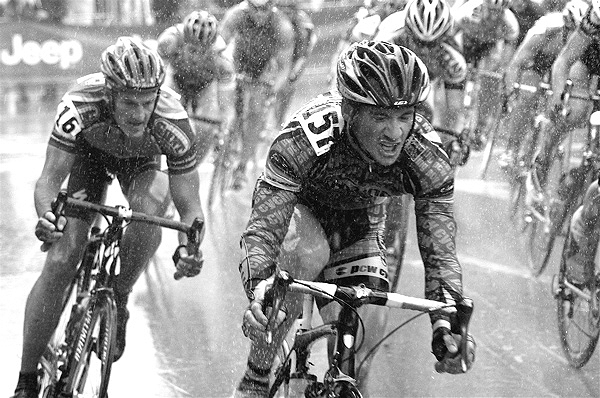
Standing at the start line, I knew this was a test. The lesson from Snake Alley was that it was OK to pull out if I didn't feel right. And here I was, not feeling right. I'd practiced on the Downers Grove course that morning, but then the rain started with the first race, and things looked dicey.
Could I pull out with everyone looking at me? What about Matt, behind whose hopes of winning the team was throwing itself?
I decided to stay in and see what would happen on the first lap. In my pre-race visualization, I attacked on the first lap and stayed off long enough to benefit Matt. I even pre-visualized his podium interview, in which he thanked me and my Web site. Heck, I even visualized winning myself and apologizing to Matt from the podium. (A guy's got to dream.) Surely I could give it one lap to see.
Well, by Turn 3 it was obvious that this was not going to happen. On the wet roads I had trouble getting any acceleration, and as we came down the descent into Turn 5, I knew I wanted no part of it. "Pulling out! Pulling out! Pulling out!" I headed straight into the wheel pit, my bike pitching from left to right as I applied the brakes. Somehow I stayed upright and didn't clip anyone behind me.
"Get back in," the official said. "You can still get on the back!"
No, I told him. I was done.
A lap later I was in dry clothes and taking pictures, in time, unfortunately, to watch Matt wipe out in Turn 1. He's one of the most experienced riders on our team, but he'd break his collarbone, our fourth this year. (Mine is the only one to have been self-inflicted out of personal negligence.)
And so it went. Nobody looked to be having any fun. The rain fell harder on Sunday, but with national championships on the line, the riders who stayed in raced as aggressively as ever. I count seven crashes that I saw myself, but I expect the actual number was five to 10 times that. As I've mentioned before, there are two, coincident sensations in watching a crash. On the one hand, it's unnerving to watch, the sound shakes your spine and your heart goes out to the riders. On the other, it's exhilarating and almost comic, and I am quick to the swing the camera to the unnatural sound of wreckage.
Next week: My team's criterium in Sherman Park. Maybe a crit on the North Shore the next day. I should be out riding right now, but it's still wet, and as they say, the hay is in barn. It's quite possible these are the last races of the year.
Until cyclocross.
Photo taken: Aug. 19, 2006
Aug. 15, 2007

People ask how the clavicle is. The clavicle is fine, I tell them, it's the rest of the body that has gone to shit.
I've been back on the bike for five weeks now, equal to the time I was off it, but I haven't been training well. I've been eating junk. I haven't gotten enough sleep.
Most of the sleep has been lost to the Web site, which has an endless to-do list. People have offered to help, but I want to keep it under tight control for now, and managing helpers would probably be more work than doing it all myself.
This weekend there were big, international-caliber races in Elk Grove. Because Ellen is still in Venezuela and thus not here to tell me go to bed, I stayed up until 2 a.m. each night editing photos and posts.
I could just dump my photos online, but I like to adjust each one individually and make sure they all have enough information to be useful. People don't realize how much labor goes into this. Taking pictures may not be easy, but at least it is not time-consuming. It usually takes only about 1/250th of a second. It's the post-capture production that kills a guy.
Fortunately I love what I'm doing, and the response from readers has made everything worth it.
Yesterday I took a half-day off work and went down to the practice crits in Matteson. I could tell the fitness was lacking and considered dropping out during the first two races. In the third race, however, I got in a three-man break that took off from the whistle.
There's nothing more beautiful than a successful breakaway. Andy from Clif Bar was in it, as was a kid from South Chicago Wheelmen whom Andy had told me was strong. Coincidentally, the last time I was at Matteson I was in a three-man break with Andy. He won that time, but afterward told me the secret to winning a three-up sprint. Here we were again -- and for the life of me I couldn't remember what he had said!
Sure enough I could only get second. Afterward he reminded me: Gap yourself and then start sprinting from off the back, thereby passing the others with too much speed to be caught. Of course!
Photo taken: Aug. 12, 2007
Aug. 8, 2007

I know barely enough Spanish to order a plate of carne asada, and unlike Europe, Venezuela is not a country that makes allowances for American ignorance. Fortunately Ellen is fluent and makes enormous allowances for my ignorance, so we got by just fine. I'm not much of a talker anyhow.
At the end of the week I would return to Chicago while Ellen stayed behind. My return would entail a 12-hour overnight bus trip from the remote city of Mérida to Caracas, from where I would take the Metro to a second bus, which would in turn deliver me to the airport.
Ellen was concerned about my ability to find my way, but I was not. I'd already made the necessary legs at least once. Besides, all week it was I who had kept us from ever getting lost. All I needed to do was be able to buy my ticket in Caracas. "Uno para aeropuerto, por favore." We spent a few minutes rehearsing.
"What could possibly go wrong?" I boasted. "Nothing!"
Ellen trembled.
A surly teenager in a sparkly pink halter took my bus ticket in Mérida and told Ellen that I would be sitting in seat 15A. (Because we'd bought the ticket at an agency, this somehow meant I did not get a ticket receipt.) I kissed Ellen good-bye and boarded.
And found a gangling 10-year-old girl in 15A, a window seat. I looked at her. I looked at the seat number. I looked at her. Seat number. Her. Seat number. She giggled and bounced in the seat with a copy of what appeared to be the Venezuelan equivalent of Tiger Beat.
I tried to communicate that I owned that seat, but I wasn't sure how to say "15."
"Cinco, cinco, cinco, ah," I said.
"¡Oh!" she said. "¡Cinco!" And she pointed up the bus toward Row 5.
"No. ¿Cinco dieci? ¿Dieci cinco?" I may have been sputtering Italian here.
Two female relatives in the seat ahead of her turned around to see about the commotion. The seemed to be asking to see my ticket. "Non habla espanol," I said, and helplessly pointed out the bus to indicate where my ticket was.
I gave up. The bus was still fairly empty, so I settled in across the aisle. One of the women asked where I was going. "¿Caracas? ¿Valencia? ¿Caracas?" "¡Caracas!" She smiled and turned around.
Eventually someone came and wanted my seat, so I left the bus to find the girl in the pink halter.
"Excuse me," I said, "could you please tell me what seat I'm supposed to be in?"
Except I said it in Spanish. Clear, unequivocal Spanish.
"¿Dónde yo?"
She shot an angry, puzzled look. So I spoke louder. Maybe she was hard of hearing.
"¡Dónde yo! ¡Dónde yo!"
She wrote "15A" on her clipboard.
I pointed into the bus. "¡La niña! ¡La niña! ¡La niña!"
This somehow made her even angrier, probably because it meant she'd have to leave her station, board the bus and come sort it out.
Sure enough, the girl had been in the wrong seat. She moved to the aisle seat, 15B, freeing up 15A for me.
I sensed the girl had wanted the window seat and offered to swap. I pointed at my seat: "¿Preferado?" She declined, and she declined again when I offered some of my Cocosette candy bar as a peace offering.
A few minutes later the bus driver turned the lights off and the salsa music on. At 8:30 p.m. it was too dark to read and too loud to sleep ... and I obviously had no conversation partners.
This is not yet, by the way, the part of the story that answers the question of what could possibly go wrong.
At 5 a.m. the bus pulled into a small terminal. The driver stood at the head of the aisle and said something quick. We'd stopped for snacks and restrooms on the way to Mérida, so I figured that was what this was, or maybe we were dropping off passengers in Valencia. I pulled my hat down and tried to go back to sleep over the music, which had been playing all night.
That's when one of the women shook my shoulder. "¿Caracas?" She stabbed a finger toward the front of the bus.
And this! This is what could have possibly gone wrong: A transfer! I had no idea. Ellen had no idea. But thank God I'd established a rapport with this family, because they had an idea, and if it weren't for them I'd still be trying to make my way to Caracas.
The rest of the journey passed without incident. I had three hours to wander the city. I bought some cachapas for Nikki and stumbled upon a triathlon, then successfully made it to the airport, where I heard the most English I'd heard all week: Three hours of American tourists whining about how slow and long the lines were. Ignorance had been such bliss. ¡Ay carumba!
Photo taken: Aug. 4, 2007
Aug. 6, 2007

Near Los Nevados, Venezuela.
Photo taken: Aug. 2, 2007
July 25, 2007
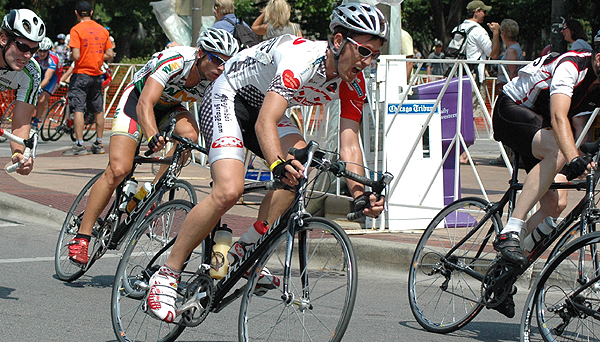
I told Sandy and Sarah that if they wanted to see me in Sunday's criterium in Evanson, they'd better be there in the first 20 minutes of the 40-mile race. I didn't expect to last much longer than that. By then I'd have either run out of fitness or have crashed on the course's technical turns.
Happily I stayed upright despite a few close calls, and happily I lasted a full hour, much longer than expected. Looking at the photos that Ellen took, however, it was obvious I was in over my head. My mouth was agape the entire time, and I lurched precariously from the tip of my seat in a desperate effort to grind every extra watt out of my body. Even if I could have lasted, I would have been useless to help set up the sprint.
With 10 laps to go I was able to make my way to the front and pulled for a block to help chase a break. By the next lap, however, I was back in the rear and when I took a tricky corner extra conservatively, a gap opened. Teammate Chris was also on the back and gave me a push, but it wasn't enough. I was done. I took a few laps of shame, then pulled out in time to get the camera to shoot Ed's victorious sprint.
It was fantastic to be able to race so close to home. I cheated and used Ellen's car, but I easily could have ridden or even walked to the course. All day long, curious and enthusiastic spectators watched the races, something we amateurs are not accustomed to. Technical crits aren't my bag, but I can't wait to return next year.
The next day was more up my alley: a 70-mile road race through the rolling hills of Wisconsin. The sole objective was to support Ed and defend his lead in the overall. Unfortunately there were only two of us to do so, and we lost Matt around the 50th mile. I didn't race smart at all. I drilled it at all the wrong spots, and when it came time to chase a break, I didn't do it smoothly or cooperatively. Instead I twice found myself off the front by accident, where I would be useless. Meanwhile, other riders counted on the vast army of XXX riders -- both of us -- to be doing all the work.
There was a tricky, milelong stretch of chip seal where the road was covered with loose, sticky gravel. It began with an off-camber turn that hit us immediately with steep climb. Then came a long, straight descent that we took single-file at close to 40 mph. Gravel flew up in our wakes, requiring us to close our mouths lest we lose a tooth. I took several off the bridge of my nose. Someone remarked that the gravel bouncing off bikes sounded like storming a beach at D-Day: Ping! Ping! Ping!
Each time I had trouble turning into the hill. I'd always find a bad line and end up climbing up last, then scrambling to regain contact on the descent. The 7th time up, after 60 miles of racing, the gap was too big and I couldn't reintegrate. I rode the last lap alone and at times with another dropped rider before rolling in for 23rd place. (About 45 had started.)
The breakaway was never caught, and Ed had to settle for 8th place. It's a shame I didn't quite have the tactical know-how or fitness to make this work. I love races of attrition like this, and in many respects it wasn't all that different from April's great Hillsboro Roubaix. Oh well. Maybe next year.
Photo taken by E. Wight: July 22, 2007
July 19, 2007

Were I in proper fitness, Tuesday's race through the rolling roads of the Whitnall Park botanical gardens is another one that should have been up my alley. (I got fifth here in April.) Happily, early on I could tell that I was feeling better than the previous day. I was lingering at the back, sure, but I was able to make up dozens of positions on each climb.
But 4 miles in, I felt a strange wobble in my rear wheel. I might have been bumped. I might have slipped on a groove in the road. It might have been pyschosomatic. Regardless, I didn't feel right, and I didn't feel confident taking turns at speed. I didn't want to risk falling on my glass shoulder, let alone take anyone else out with me.
"Brian," I yelled to a teammate. "Is my rear wheel shaky?"
"Yes!" he said emphatically.
So I pulled off and tightened my skewer. I chased for a bit, but even with motopacing from the support vehicle, there was no hope of catching. I rode on for the training. Friends and teammates encouraged me on, but others merely averted their eyes as I rolled past in shame. After five laps I called it a day.
Brian, an honest man and a chaplain by trade, later told me he had lied. My wheel didn't look shaky at all, but he knew an emphatic "Yes" was the answer I needed at that moment. Sometimes there is greater truth in the lie.
Nonetheless, I spent the rest of the day in a dark place mentally. Watching the pros, with their lean legs and their Zipp wheels and their dexterous turns, I didn't feel like a cyclist myself. I felt like a guy with an expensive bike and better things to be doing.
I wanted to imagine this being fun again. I wanted to imagine having confidence.
Wednesday was more fun. Wednesday I was more confident. Wednesday I had fewer things I'd rather be doing.
After reeling off two consecutive second-place finishes, Ed woke up in first place overall. Nico and I would be riding in his defense at the proving grounds, the course where I cracked a rib two years ago.
It's not something I've had much chance to do, but this kind of riding is an aspect of the 3's I was looking forward to. In some respects, playing a role and riding for someone else is more fun and more satisfying than riding for yourself. It's just as hard -- harder? -- but there's less pressure and tactically it can be more interesting, and I've enjoyed watching the more experienced Nico selflessly and expertly thread Ed through crowded packs.
In the second of six 10-mile laps, I was sitting near the front and feeling good. The pack had just reeled in a two-man break, but I rode tempo to make ground on a solo rider who remained away. The guy who'd won the previous day on a long flier was off the front and out of sight.
"Take it easy," Ed said.
"No, that time trial dude is off the front. We gotta bring him back before he gets too far."
"No he's not," he said. "Look, the pace car is here. The pace car stays with the leaders. That means there's nobody off."
"The pace car could be wrong," I said. I was certain I'd seen this guy's bright yellow jersey slip away. "Look, you stay here. I'm going to float back and try to find him."
As the pack strung out on a descent, I coasted back, back and further back. Sure enough, riding last was my yellow jersey, and as I floated back one more position, it became me who rode last.
I spent the next three laps weaseling my way back up to the front. It was hard on the congested roads, and I can't deny I crossed the centerline, mostly out of necessity, occasionally out of greed, all the while knowing full well the danger, knowing full well the hypocrite it made me.
Finally I was near the front again, keeping an eye out for any last-lap attacks. I motored up to a few, but the one time I made a sudden acceleration, I cracked hard after a mere 5 seconds of hard effort.
Eventually a rider in green got away by himself. A handful of people traded pulls at the front, including Ed. I went up to relieve him. "That was your last pull," I said as he coasted by me. I wanted him to save himself for the finish.
When it was my turn, I slowly accelerated. Next thing I knew, I looked back and nobody was with me. I didn't mean to attack, I swear, but there I was in no man's land. This would be my last chance to be useful, so I plowed ahead toward the green beacon on the horizon.
I got about halfway across the gap when a Brone's rider I knew to be strong bridged to me. "I'm happy with third," I quickly conceded in order to keep him motivated, but it was wishful thinking. We were soon joined by a third, and after a single rotation we were swallowed by the peloton.
The effort cooked me, but I'd like to think it contributed to catching the escapee a few miles down the road. I stayed with the group until the final mile, where two tricky turns led us back into a racetrack for the finish. As expected, several riders tangled up on the first of these turns, and the gap it created was just the excuse I needed to soft-pedal the rest of the way.
As I crossed the finish line, I heard the announcer say "Oak Park," and I knew that Ed had won.
Photo taken: July 17, 2006
July 17, 2007

I'm back, sort of.
Ordinarily today's road race at Alpine Valley would have been my favorite of Superweek. But after two uncharacteristically challenging group rides last week -- getting dropped when I ought not to have gotten dropped, wheezing when I ought not to have be been wheezing -- I knew that I'd lost quite a bit of fitness since the Snake Alley crash in May. I'd be lucky to be pack fodder.
Within the first 5 of 60 miles I was on the brink. My heart rate soared to 193 in the flats. One single hard effort sent me floating to the back, where I clung to keep contact. I had mechanical worries, too. I got a bad case of speed wobbles on the first descent, and the bumpy second descent loosened the screws of my bottle cage.
Just as I was contemplating how to safely secure my cage, I heard a loud "Pisssssh" and felt pressure give away behind me. "It's me," I said and raised my hand for a new rear wheel from the support truck. Unfortunately I hadn't put a wheel in and there were no compatible wheels available. I wouldn't have been able to get back in the race anyhow, but it would have been nice to get a training ride in.
A rider from Austin, Texas, stopped to give me a lift back to the start/finish. I had a nice chat with him, then balanced the karma by taking Ed's car and giving an Australian rider a lift up the feed zone.
Maybe there's a good race in my future, but I doubt I'm going to get the fitness back this year. I haven't had any quality intensity in six weeks, just spotty endurance rides. I don't feel that taut invincibility that comes with being in shape. Maybe I'll be fine by August, but those are all short crits, and even at my peak I'd have trouble.
The good news is that the shoulder is fine. It didn't even cross my mind during the race, and it is now rare when it twinges or throbs.
And that's all fine. What I have lost in fitness I have gained in perspective. I felt happy out there, and I felt safe and protected in the fold. Maybe next year.
Photo taken: July 16, 2007
July 11, 2007

Waiting for Floyd
Photo taken: July 10, 2007
June 12, 2007

When life hands you lemons in June, I always say, buy a bike for the November cyclocross season.
This comes to me from Brian, who sold it to me for a song. Now I have no excuse to not race this winter, and it takes some of the pressure off of recovering in time for the road season.
The clavicle is healing well. I have almost full range of motion, although it often feels as though someone were pinching me. I still wear the sling, mostly to remind me not to reach for that top shelf, and to remind others not to pat me on the shoulder.
The worst part is the commute.
I must face away from the lake as I ride the bus. I can't bear to see so many people riding bicycles. I especially can't bear to see so many people riding poorly. "Booo!" I want to yell. "You shouldn't be out there! Yes, you! Riding that stupid cruiser with your iPod and flip-flops! That should be me out there!"
And then there's the time suck that the CTA is.
There are two kinds of commuters in Chicago: Those who like to get around town quickly, cheaply and conveniently, and then there are those who choose not to ride a bicycle.
Unless Ellen gives me a ride, I must budget an hour for the commute that would take 30 minutes on a bike (26 minutes if there's a tailwind). Ordinarily I can leave work at 6:30 p.m., get a 90-minute workout in and be home by 8. Now I still get home around 8, but by the time I've changed, filled my water bottles and pissed away some time at the computer, I'm getting on the trainer at 9 and finishing, dejected and unmotivated, around 9:45.
I've heard of people whose joints become barometers, warning of weather patterns days away. My shoulder has become a tachometer of sorts. As soon as my heart rate rises above 150 on the trainer, it begins to throb. I don't know whether it's the blood pulsing around the wound or whether it's the nub of the clavicle floating around. I'll ask my doctor at my check-up tomorrow.
Photo taken: June 13, 2007
May 27, 2007

"A strange game. The only winning move is not to play."
WOPR, "War Games"
Snake Alley. Probably my favorite race of the year.
It takes a big man to win Snake Alley.
It takes a stronger man to sit it out for the sake of torrential rain.
I'm neither of those men.
I had a bad feeling about the race, not to mention a nightmare or two during the week, but I hadn't driven four hours to stand under an umbrella.
The rain stopped right before my race, but the roads were still soaked, and it disrupted my pre-race routine.
I'd been sulking over the weather ever since I left the house before dawn. I wasn't visualizing the climb or going over the mechanics of descending. It didn't even dawn on me to under-inflate my tires because of the rain, and I passed on Pieter's suggestion to use vinegar to keep the oil off my tires. (I don't know if this would improve grip, but he's Belgian, so he should know.)
My head was so unscrewed that I couldn't even clip in properly at the start. What was more troublesome, however, was how unbothered I seemed to be by it. A cyclist depends on urgency and lust, and I had neither.
I found the Snake impossible to climb, mentally so more than physically. My legs were fine. It was my head that couldn't work fast enough, and it frustrated me to not be able to pour my everything into my pedals.
Normally I would get out of the saddle, yank on the handlebars and bound like a gazelle. The bricks yielded too little traction, however. Too much force in any direction sent a rider sliding. Even sitting I had fits, and yanking on the handlebars would pull my front off the ground. Damn my new light bike! A pox on my 680-gram wheels!
Obviously other people were figuring it out because they were passing me. I lost even more ground on the turns of the descent, worthless, tentative descender that I am. On the second lap I braked heading into one turn and sent a spray of water into the rider behind me, who scolded me accordingly.
On the third lap I was gapped so badly by the bottom that I had nobody to follow and had to make my own line on the last corner. The turn worried me so much that I spent one second too many worrying about it and one second too few actually executing it. This was a physics test and by hesitating, I was failing.
I tried to lean to save the turn, but given the speed and slickness I lacked the nerve to lean far enough. My caution would be my downfall, literally.
As soon as I knew I wouldn't make it, I had two choices: Try to continue the turn and skid out at 35 mph? Or do I jam on the brakes and continue going straight?
I continued straight, straight into a hay bale. The bale saved my bike but I tumbled over, landing squarely on my left shoulder.
As I limped to the first-aid station, a second rider plowed into the exact same bale. But he was lucky: He shredded his skinsuit, but other than road rash he was fine. I would be another story.
An hour later I walked out of the hospital with my left arm immobilized. In my good hand I held a prescription for Vicodin and a diagnosis of a broken clavicle and separated joint.
(The immobilization device included a large foam strap around my waist. Two of me could fit in it, and the nurse struggled to fit it to my 150-pound frame. "It's not designed for cyclists," she said, part apology, part compliment. "It's for us corn-fed people of Iowa.")
I'll see an orthopedist this week, but the ER doctor said to expect to be out 5-8 weeks, plus 5-8 weeks more if surgery is required.
People will say, "It's a shame for things like this to happen to the nice guys." And they're right! It is a shame, and on behalf of nice guys everywhere, I'll note that it's really starting to piss me off.
And so now I spend Sunday morning listening to the Adagio in G minor, reading the Giro d'Italia ticker and generally feeling sorry for myself. I'm going through photos of people cycling and thinking, "That looks like it might be fun." I see a picture of someone raising both arms in the air and think, "That looks like it might be fun."
I'm trying to think of a worse time for this to have happened. In September, this would be a get-out-of-painting-free card and a welcome excuse to be lazy. But now, after hundreds of hours of winter training and spring preparation, I'm close to being on form. The season is coming into bloom. The weather is almost pleasant. I feel like a groom left standing at the altar.
Somewhat on a lark last week, I ordered the correspondence course to become a licensed cycling coach. I have no desire to coach, but I thought it might help me as a rider, and since I'm always doling out advice to newer riders, it might make sense to know what the hell I was talking about.
Suddenly I'll have plenty of time to study, as well as work on this other new project of mine, and do all the fun summer things that normal people do. And just think of all the entry-fee money I'll save. Yay.
Photo taken: May 26, 2007
May 23, 2007

Someone had some time on her hands.
By the next day she'd raided her own library to fill out the entire bookcase from red to purple.
Photo taken: May 20, 2007
May 20, 2007

On our fourth and final approach to the milelong, 700-foot climb of the Denzer road race, riders started saying their farewells and exchanging their final pleasantries, like prisoners on the morning of their trip to the firing squad, or soldiers heading once more into the breach. Many had had to catch back on after being dropped on the prior lap -- I was one of them -- and knew they would not be so fortunate this time.
All eyes were on Seth, Get a Grip's ace climber. It was no secret he'd be attacking on this climb. He advertised as much leading up. Sure enough, he set off early in the climb and the field shattered in his wake.
Ed and I urged each other on. I told him I didn't think I could hold on and thus it was up to him. He told me he didn't think he could hold on and thus it was up to me.
I was standing on the pedals and close to cracking when Ed started fading in earnest. Seth was floating away, but I knew I'd be OK if I just stuck with the lead bunch. I started to pre-emptively organize. "Let's take it easy and stay together," I said. "At the top we can paceline up to Seth and drop all the mopes behind us."
Indeed, a group of six formed at the top and we caught Seth, who'd sat up to wait for us. Ed was not among us. A half-mile down the road, the course took a soft, gravelly right at the bottom of a hill and hit a steep climb. It was here that Seth attacked again. And it was here that my gears misfired, costing me just enough momentum to lose the move.
I ended up alone between Seth's group of three and a group of three chasers. "Seth!" I screamed in desperation, but that just caused his group to accelerate. (I'd given the guy a ride two weeks earlier, and this was the thanks I get?) I made progress but I knew if I pushed any harder I'd risk cracking and lose everything, so I fell back to the chasers.
And that's how we finished. I thought I was doing a good job sucking wheel and being patient for the sprint for fourth place. When I jumped I unleashed a fury I've rarely unleashed in a race before. I felt great. Finally! Finally I was going to beat people in a sprint!
Alas, I unleashed it 2 seconds too early. The fury ran out 10 meters before the line. A rider came around my right. "Damn! Fifth place!" A second rider came around my left. "Damn! Sixth place!"
"Nice leadout," one of them said to me afterward, about as back-handed a compliment as one can give to someone you just beat in a sprint. I know I can work on my jump and be less stupid, but one needn't rub it in.
Ed said later that this was the first time he'd been dropped since our first ride at camp last year, when Randy, George and I rode away from him. He also said that that experience motivated his training for the next 12 months. I can only speculate how getting dropped in a race will motivate him.
Photo taken by Newt Cole: May 19, 2007
May 16, 2007

"Everybody hates for a crash to happen," everybody says after a crash has happened, but it's not completely true.
Within a race, for example, there's no sweeter sound than that of mangled components -- if the sound comes from behind you. The surviving riders feel a small euphoria, for each crash means fewer people trying to take your prize.
Opportunistic riders accelerate at the sound of metal scraping against pavement. Part if it is the survival instinct, to get as far from danger as possible. But it's also a natural point of attack, to drive the stake deeper into the unfortunate.
The unscathed rider doesn't look back but secretly imagines the entire balance of the field writhing in a heap. He counts n riders ahead of him and fancies that the race has been reduced to n+1. Alas, even the worst-sounding crashes typically take out only one or two riders.
And photographers love crashes. We train our long lenses on each sprint, secretly hoping this will be the one that provides the perfect shot. The image of the unfortunate rider floating helplessly away from his bike is a decisive moment that carries as much portent and energy as Henri Cartier-Bresson's classic shot of the man leaping across the puddle. The proper crash photo, in which a hovering rider has not yet hit the ground but is about to, is a piece of kitsch that every cycling photographer dreams of adding to his collection.
In this case the unfortunate rider is Ansgar, one of the area's best sprinters but one who sometimes underestimates his own strength.
Ansgar was one of the first friends I made in racing. I confess that I enjoy crash porn such as this, but I do so only by knowing he walked away unscathed.
According to the time stamps on my photos, it took only 20 seconds from the time he started going down to when he was upright on the curb and beginning to laugh it off. In those 20 seconds his skipped across the ground like a plane ditching into a field. He must have gone 15 meters. If he'd gone 5 meters more, he might have salvaged a top-10 finish, but he ground to a halt just short of the line.
Something I enjoy about this series is the reaction of the spectators. Some recoil in horror. Others stand agape in disbelief. Some don't react at all. A father shields his children.
Speaking of wrecks, my body is a bit of one at the moment. At my team's practice time trial this morning, I had one of my worst times ever, 10 percent slower than this time last year. My head wasn't in it, and neither were my legs. I'm not sure what's going on. Perhaps staying up until 2 a.m. editing race photos wasn't a good idea?
Photo taken: May 13, 2007
May 14, 2007

Mind your safety pins, please.
Sunday's pro/1/2 race was my third of this years Monsters of the Midway, a popular criterium at the University of Chicago. My goal was simply to hang on as long as I could.
By the third lap I was lagging and having to get out of the saddle to close gaps I'd let form. Suddenly a loud clicking sound started coming from one of my wheels. It sounded like a baseball card slapping against the spokes. I figured one of my zip ties had come loose.
While I fussed with the noise, a gap grew to 10 meters, then 20 meters, and soon it was out of reach. Even if I could catch back on, the racket my bike made would make me an unwelcome guest.
I swung into the wheel pit. I checked my tires. If the problem was a flat, maybe I could steal someone's wheel (I hadn't put in any of my own) and jump back in. But both tires had full pressure, so no free lap for me. I walked over to the officials and drew a finger across my throat. I was done.
My first voluntary DNF.
When I got to my team's tent I examined my wheels more closely and found the source of the problem: a safety pin in the rear. Five minutes later the tire was completely flat.
I didn't have much to show for the other two races of the day, but they were still fun and productive for my team.
As we staged for the 30+ race, I saw a familiar face in a Delta Faucet kit. "Hey, wow, it's the Druber!" As in Mark Swartzendruber, national caliber time trialist and entertaining True Sport columnist. I'd been a fan of his ever since I got into this sport. His rants against "feckless weenies" were influential in my early development as a racer.
"Who's that?" someone asked.
"That's who's going to win this race," I said. "Hold his wheel and you might have a shot at second."
Sure enough, the 30+ race quickly established itself as a game of Follow the Druber. He led the field around the Midway like the Pied Piper leading so many rats.
With about 5 laps to go, Druber was off the front with three other riders. They seemed just the right distance away: far enough to be viable, but close enough to be reached. I got away from the peloton in the headwind and a lap later had successfully bridged. Phew! I had it made! My most triumphant, gutsiest move of the season!
But Druber was already pulling back the throttle. He was taking an unusually long pull but wasn't going terribly fast (I had caught on, after all), and the other riders in the break, myself included, weren't doing enough to encourage a faster pace. Sure enough, the pack caught us a lap later, with 2 to go.
As soon as we were caught, Druber instantly unleashed his real attack and solo'd the rest of the way. I and many others tried to catch his wheel as he departed but it was like catching a rocket with a butterfly net. I then tried a flyer with 1 to go but it went nowhere, and I rolled in at the back of the pack, not even bothering to get out of the saddle in the sprint.
There's not much to say about the 3's race. My job was to cover breaks, but none threatened to stay away. In the final laps I'd hoped to help string it out to give our sprinters room to work, but I didn't have enough leg left to even get to the front, much less get there and drill it, so I was pretty much useless. The team, however, got second, fourth and seventh, the best collective result of the season.
Next week: Another crack at Baraboo.
Photo taken: May 13, 2007
April 29, 2007

After not racing for a month, I persuaded Ellen to lend me her car so I could go to Milwaukee and do the Whitnall Park criterium, mostly just to stay sharp ahead of next week's target race in Baraboo.
Whitnall Park is a milelong crit course with three small climbs in quick succession. The first comes after after a sharp right turn, the second puts you into a stiff headwind, and the third deposits you at the start/finish line. King of the Mountain points are available on laps 4, 7 and 10.
With the wind as stiff as it was, I didn't expect anything would stay away. Since I was without teammates, I knew my only chance was to sit in and be patient. I knew it would be a waste to burn any matches early. I knew I should stay as anonymous as possible.
Knowing all this, then, it surprised me to be trying to cover anything that moved in the first few laps. What can I say? Sometimes in a race my body has a mind of its own. Why do I chase everything? For the same reason the scorpion strikes the frog: It is our nature, doom us though it may.
About three laps in a Homegrown Racing rider was alone off the front. I hopped onto the wheel of a second Homegrown as he moved to bridge up. Just as we got clear I noticed the first guy was already fading. Great. Another wasted move. Ten minutes in I already felt my race was done. I started to anticipate the ribbing I'd face from racing friends afterward. "What were you thinking? Who let a bonehead like you into Cat 3?"
When we caught Homegrown No. 1, he revived. But even though the three of us worked well together, I didn't expect us to get anywhere, for surely the pack wouldn't let two teammates get off together. Since we were approaching the first King of the Mountain lap, however, I figured I'd help keep the break going for that and score some points, then try to get lucky later on, after we'd been absorbed back into the pack's unsympathetic maw.
I won the KoM, and in the next lap we lost one of the Homegrown riders. He was replaced by four more riders in the pack, including two Get a Grip riders. One of them would be dropped, so we ended up with a group of five: me, Homegrown, Steven from Get a Grip, a Baraboo Shark and an unattached.
It took a while but we got a good paceline going. Our gap rose and fell: 30 seconds one lap, 20 the next, then back up to 30. Each time we headed up the first hill we peeked back to see how close the field was. If they were closer than the previous lap, we went faster. If they were farther away, we let up a bit.
Steven urged us to be neutral for the second KoM lap. Many a break has died when the riders get greedy for primes. But I wanted the points, so Steven arranged for me to take it uncontested. This kept our momentum going and effectively clinched KoM for me.
There's a point in every breakaway where the objective stops being to stay away and starts being to win. There's a point where even I have to stop being nice and go for the throat. In most of my successful breaks -- all four of them -- I am late to realize that this point has arrived. While I'm trying to keep the tempo up and cajoling others into working together, everyone else is smartly skipping pulls and plotting their endgame.
Coming up the hills on the penultimate lap, it finally registered with me that we were away for good and that I should start scheming. I decided to experiment by soft-pedaling and letting a gap open in front of me, thereby letting Steven and the unattached rider float away. Homegrown and the Shark had been conserving their pulls, so I wanted to make them work.
They showed no interest in chasing, so the gap grew. As the bell rang ahead of us, however, the leaders were stalling on the final hill, so I jumped. I got clear and caught them by surprise. With a lap to go, I was on my own. This was a brilliant, brilliant move.
Or it would have been, had it worked. Instead, Steven caught me on the descent. We worked a little bit together, but not well enough to hold off the others.
As we started up the three climbs, the cat-and-mouse game started in earnest. Steven was first, I was second, the three others sat on my wheel. We slowed to a crawl as we hit the wind. In front, Steven kept looking back as though he'd dropped something. Suddenly he jumped. I hesitated and missed my chance to grab his wheel.
At this point I had a choice. Do I chase, or do I sit? I could chase after him, but in this wind, all that would accomplish would be to pull the other opponents to the finish. So I thought: "Well, Steven is a nice guy. He worked hard in the break. I'll let him go. Either he'll stay away, or the others will chase and I can grab their wheels and let them tow me to victory."
Fortunately for Steven but unfortunately for me, the other opponents didn't respond until it was too late. I jumped with them, but I couldn't pass. Steven crossed the line with arms raised. My throw was too late, so I settled for fifth, last in our group.
I could have won, I know it, but I'm not sure exactly how. I'm still trying to unlock that puzzle. (As I've mentioned before, it's puzzles like this one that make cycling so fascinating.) In any case, knowing that it is possible to win is one of the most important steps in a racer's development, and I'm glad I got there so early in the season.
Fifth place earned me $10, and King of the Mountain earned me a $10 gift certificate and a box of Clif bars. After the entry fee and the flowers I'd buy Ellen for giving me the car, I just about broke even for the day.
Photo taken: April 28, 2007
April 26, 2007

One of our destinations in Milwaukee was the Lakefront Brewery. Five dollars gets you a tour and tokens redeemable for 32 ounces of beer. Bartenders casual about taking tokens gets you 32 ounces more.
The tour is about 10 minutes long. About one minute is devoted to learning about hops, wort and the biological miracle that is beermaking. The other nine minutes consist of the tour guide cracking wise about bungholes, making fun of the frat boys just there for the cheap beer (especially those who had already been on the Miller tour that morning), and dancing to the theme song from "Laverne & Shirley."
Her shtick was pretty funny, and the guy standing next to me was in stitches. He had a very distinctive laugh, a resonant, appreciative laugh. His laugh, in fact, sounded a lot like that of Dan, a guy I knew in college. He even bore a passing resemblance. But it couldn't be Dan. Dan was in Ohio.
As we moved on to the next round of taps, I said to Sandy, "Does that guy resemble Dan, or what?"
"Hey, that is Dan!"
And so it was. Of all the breweries, in all the towns, in all the world, he walks into ours!
Photo taken: April 21, 2007
April 22, 2007

At the Milwaukee Art Museum
Photo taken: April 21, 2007
April 2, 2007

Upon returning to the city from Saturday's race, sweat salt still caked on our brows, Mike and I headed to Logan Square's Mutiny, a dive bar renowned for having a urinal the size of a phone booth, for the debut of IRO Sprints, an event put on by the local messenger/hipster/fixed-gear scene.
We were both out of our element -- our element being considerably quieter, squarer and less smoky -- but it felt like an important cultural exchange, like America shipping teenagers to the Soviet Union during the Cold War. Our team is trying to help messengers get involved in sanctioned racing, and the messengers no doubt feel out of their element whenever they're surrounded by gratuitous Lycra and carbon fiber. Participating in one of their events was the least we could do in return.
The format was simple: Two track bikes are positioned on rollers, their forks mounted to a stationary stand, their rear wheels wired into a laptop. The rollers offer zero resistance, so the contest is to see who can most quickly spin 36 times, the equivalent of a 250-meter sprint at the velodrome. The spins get ridiculously fast and violent. Progress is projected onto a wall. Winners advance to the next round; losers go drink some PBR. Meanwhile, a rowdy, inebriated crowd is screaming at the riders to go faster.
The set-up was very impressive, as was the stone-soup way in which it came to be. As I understand it, one person wrote the computer code from scratch, someone else designed a GUI, someone else got the frames donated from manufacturer IRO, and various others cobbled together the necessary parts and know-how and put it all together, all in less time than it takes an Amish village to raise a barn.
The bar was crowded and hot, the punk music was deafening, and two days later my jeans still reek from the cigarette smoke, but it was the most fun I've ever had on one wheel.
I didn't even do that well. What do you expect from a climber? I squeaked by the first round, then got crushed in the second. (Between heats I sneaked to Ellen's car to wolf down a Clif Bar, which I think violated IRO Sprints etiquette on multiple levels.) Mike got into the quarterfinals, but after he got beat at 2 a.m., we were both too exhausted to see things to their end.
Photo taken: March 31, 2007
April 1, 2007

The Hillsboro Roubaix is one of most anticipated road races in the Midwest. It fills up fast and draws riders from Missouri to Wisconsin.
Its inspiration is Paris-Roubaix, perhaps the most legendary one-day race in the world, otherwise known as "Hell of the North" or "Queen of the Classics."
Like Paris-Roubaix, Hillsboro's principle feature is a long stretch of brick, unmaintained brick littered with ruts and potholes and gravel.
Riding over the brick is bad enough, but you also enter it coming out of a long descent and, on this particular day, aided by a 20 mph tailwind. One second you're screaming down a hill at 40 mph and then you hit the "pavé" and suddenly your bike is bucking you like a mechanical bull at a Texas honky-tonk.
Between the bricks, the hills and the ridiculous crosswinds, I knew this race, a combined 3/4 field, would be a brutal affair. It would also be my first serious race as a Cat 3 and at 66 miles my longest.
I couldn't help but think of a training ride I went on with a local Cat 3 team last fall. They dropped me in the first 10 miles. That was a casual training ride. How on earth could I fare any better in competition?
Hovering over all this uncertainty was the threat of thunderstorms, the chance of which hit as high as 60 percent. The only thing I knew for sure was that his would be a race of attrition that would spit people out the back from start to finish. I just wanted to be spit out last. My strategy would be to sit in, hang on and hope for the best.
I spent most of the first lap near the back. The roads were narrow and the field was large. It was impossible to move up through the congestion. At the back we felt the brunt of the frequent braking and surging, and we had to fight the hardest to not get gapped in the crosswinds.
I touched base with Seth from Get a Grip. We shared the same frustration over the braking. "Are all Cat 3 races like this," I asked, "or is this just because there are so many Cat 4's in the field?" He could only shrug. Fortunately Seth is a smart, agile rider. As we approached the two hills that led into town at the end of the first lap, I followed his wheel as he navigated his way up to the front. I suddenly had breathing room.
Approaching the same two hills at the end of the second lap, I predicted to Ed that Seth, an excellent climber, would attack. Sure enough, he did. I scrambled up the second hill to catch him, as did Ed and a few others. We rattled our way across the bricks with no regard for bike, limb or dental fillings and soon enough were with Seth and tried to get a paceline together. As soon as it had begun, however, Seth saw that the field was right on our heels and smartly called off the effort. The good news was that the pack exiting town was a little bit smaller than the pack that had entered it.
It was on this trip through town that I learned that there was someone well off the front. I had no idea.
Starting the third lap I rode some tempo and attacked once. At one point we had a very viable group of a dozen, including myself and two teammates, but none of the others wanted to work, and the field caught us. By this time, however, the field was down to about 30. Mark, Ed and I were the only ones from our team.
Two and a half hours into the race, I kept up the pressure into the headwind, figuring that there were some dangerous riders that could catch back on if the pack relaxed. But 20 seconds into any hard effort my left hamstring and quads would cramp up. I would make do with those 20-second bursts: I'd go to the front, drive the tempo, cramp up and retreat back into the sanctuary of the draft ... and then I would do it all over again.
During one such effort someone asked, "Are you attacking, or are you just going faster?" I think he was making fun, and indeed it's one of my weaknesses: It is sometimes hard to tell whether I'm attacking or "just going faster."
Riders started to slip off the front. I was in no condition to chase or bridge. When Seth and a Mesa rider got a good gap together, I asked Ed whether he wanted to be up there with them. I figured I could jump and get him halfway there. But he declined. Sure enough, they would stay off, thanks to some solid blocking from their teammates, and I think both Ed and I would regret his decision.
Normally I would think about trying to wait to lead Ed out at the end, but with my cramping I didn't think I would be useful in a sprint. So I reported my condition to Ed and went back to driving the tempo as well as I could, hoping to pop more and more riders off the back.
Finally we neared town. Quietly Ed sneaked off the front and started to drift away as we hit the hills. Mark and I went up front to soft pedal, the only job a guy with cramped quads can perform, thus vexing the chase. Few had the energy to come around, and I moved into the path of any that did. Ed's lead grew. "Go, Ed!" I screamed into the wind. "Go!"
Finally people surged past us as we hit the bricks. I mentally urged Ed on. Mark and I were sacrificing our results and we were happy to do so, but it would only be worth it if Ed could hold people off.
Which he did, of course, finishing a few seconds ahead of everyone else to get sixth place. I held my own in the sprint and despite getting boxed and not knowing where the finish line was got 11th.
Given the situation it was textbook teamwork. What impresses me most is how it came to be almost telepathically. We never talked about what we would do in such a scenario. Nonetheless, Ed knew exactly when to go, and Mark and I knew exactly what to do in response. It's only a shame that five people had already gotten away.
So, a successful start to the season. This was one of the hardest races I've ever done, but the Hillsboro Roubaix earns its designation as "spring classic" and joins Snake Alley and the Circuit of Sauk in my list of favorites. I need to figure out why I cramped up, but I think I can stop worrying about getting dropped.
Photo taken: March 31, 2007
March 28, 2007

Belmont Harbor.
Photo taken: March 24, 2007
March 25, 2007

When the audience enters the theater for a performance of "Too Much Light Makes the Baby Go Blind," cast members ask them their name to put on a nametag. The cast member is listening to very loud music on headphones, however, so the name written on the nametag is a random word that has no bearing on whatever the person actually said.
Last night my nametag read, "Hello, my name is Road Rash."
I considered that an anti-omen and wore it to today's races, the last of the Parkside series.
The first race after a crash is always terrifying. It becomes impossible to conceive of any outcome other than a crash. Your mind files through all the possible bad ends: Skidding out on gravel. Hooking handlebars. Crossing wheels. It becomes an act of faith that, yes, you actually enjoy doing this.
Fortunately, the anxieties recede once you are rolling.
The masters race seemed a little faster than last week's, and after many aborted attempts, a small break got off. Randy, tired from a long break in the 40+ race, successfully slingshot Mark up to a chase group. I hopped on to a strong wheel and got a free ride up to Mark. If we could catch the leaders, this would stick.
At Randy's tactics seminar this week, he emphasized one point more than any other: When you are in the break, Don't. Get. Dropped. This was on my mind as we traded pulls, but when I took a long pull out of Turn 2, thinking a long pull with the wind would absolve me from working into it, my mind was writing a check my legs couldn't cash.
Both Mark and I were soon dropped. We fought hard in no-man's land, but soon the pack swallowed us up, and our team now had nobody in what would indeed be the winning break.
The 3's race, my first since upgrading, was fairly uneventful. I tried to stay patient and sit in the pack. I think I tried only three doomed attacks, which may be a record low. Each of them withered upon hitting the wind like a vampire stepping into the sun.
It was hard to sit in. I felt a lack of control and power. I had to keep reminding myself that given the wind and the composition of the field, any attempts to go off the front would perish as surely as mine did.
On the last lap I was able to position myself ahead of two teammates, another goal for the race, but I jumped way too late, and they didn't have the gas to come around anyhow. We rolled in 12th, 13th and 14th.
Despite two mediocre placings, I was happy with my sprints, and especially happy to have kept the rubber side down, the shiny side up. I timed them poorly, but I was on top of my gears and navigated well. Not a single person passed me. I just didn't pass enough of them.
Afterward the Get a Grip rider who held me off in the 3's said he read my blog, the second person to say so on the day. "I like it," he said. "I reminds me of when I was just starting out."
Just starting out? This is my third year with this nonsense. But it's true: I still don't know what the hell I'm doing. I wonder whether it's my writing or my riding that betrays that fact.
Parkside is a good fitness check. I obviously have a lot of work to do to get on form.
Parkside's also a nice indicator of progress. Teammates who got spat out the back last year were involved in the sprint this time around. Teammates who finished in the pack last year were now involved in the podium. Everyone had a lot to be proud of, and everyone who was just starting has a lot to look forward to.
Photo taken: March 25, 2007
March 23, 2007

I wasn't always a weight weenie, but here you go. Supposedly the bottle cage on the right, one of many great deals Marcus at Yojimbo's helps us with, saves me a few grams, but the difference is too slight to register on the kitchen scale. And yet having them makes me happy.
My bike is already back following Sunday's crash. Johnny Sprockets was able to turn me around in a single work day, this despite a workshop and basement stacked with bikes brought in for spring tune-ups and cobweb removals.
I don't know whether it's because I'm a racer or because I sometimes bring them beer or because they know I'll blab about them on my blog, but they're always conscientious about getting me back on the road as soon as possible.
There was good news: No major cosmetic damage, and only the right shifter needed to be replaced. Just my luck, Shimano had mis-sent a bunch of right Dura-Ace shifters, so they let me have one on the cheap, and they advised me to continue crashing on the drive side.
Photo taken: March 18, 2007
March 19, 2007

Like all race reports, this one would be much better if I could remember everything.
The Parkside criteriums are insignificant races -- they're short, and there's no money on the line -- but they're eagerly awaited because after five months without racing, everyone is keen to shake the off-season out of their legs. And since the riders are so rusty, it's an excellent chance to get the annual crash out of the way.
For me, it would be my first chance to, as one of my favorite cycling expressions goes, "turn the pedals in anger" on my new racing bike.
My first race was the masters open. It was a big field, although absent was Robbie Ventura, the former pro who the week before had been there with his Vision Quest minions. It was only 40 degrees and windy. Reportedly he's a fair-weather Parksider.
The race was fast but smooth. I stayed active near the front and got in one break that I thought was viable, but by the time the bell was rung, it was clear that things would be settled in a bunch sprint.
With a half lap to go, Ed was a few spots ahead of me. I didn't have any other teammates nearby, but I was in good position, about eighth wheel. Four were off the front and were about to be reeled in. We strung ourselves out in chase.
Two bikes ahead of me, a Team Mack rider started to fade. A gap opened ahead of him. I accelerated up the right to leapfrog him into the next draft. He, meanwhile, looked over his left shoulder for help and drifted to his right, right into my path. I had nowhere to go. I tried to bail onto the curb but failed, wiping out at 30 mph and tumbling onto the grass.
My shifters splayed at unnatural angles, but I was fine. People asked if I was OK. I frantically waved them on to the finish line.
Mike Stanley stopped to help and offered his bike to use in the Cat 3 race. I joked that I supposed this would be my free lap. We walked back to my team's staging area.
It's there that I said, "Guys, I'm starting to forget things."
At least, this is what I'm told I said. From the point Mike and I started to walk back, I remember nothing up until when I found myself strapped onto a board in an ambulance.
I hadn't passed out but I was very sleepy. By now I couldn't remember anything about how I got there. I could remember the crash -- Team Mack, argh! -- but not how I got to the race, or what I did that morning, or what I did the previous day. I could remember what day it was, but only because like all race days, March 18 was indelibly circled in my mental calendar.
I could remember I did not like my job but I could not remember how to do it, so I figured the upside of this would be getting a sick day or two.
Things started to come back by the time I arrived at the hospital. I waited in an examination room, anxious for Ellen to show up so she could help fill in the memory holes. Also, so I could put on pants. I was getting cold.
When she arrived I told her about the last time this happened. "When I was 13 I crashed while dirt biking and had a concussion," I said. "This feels a lot like that."
"Honey, you already told me that. Twice."
Surely if I'd told her that I would have remembered it. "Don't be ridiculous!" I roared. "Now you're just making fun of me." I thought it pretty funny of her. Nurses peeked in to see why I was laughing so hard.
They took a few X-rays and a CT scan. Then we waited in the exam room for an hour, eating figs and watching college basketball.
Finally the doctor popped in and confirmed I was fine. Probably a minor concussion, but nothing to worry about. Contrary to my expectation, Ellen wouldn't have to wake me up every two hours to make sure I was still alive. This relieved her greatly.
There was nothing the emergency room could do about my shifters or ripped shorts, so we headed back to the city, first stopping for frozen custard, the highlight of any trip to Wisconsin.
I recently read "The Echo Maker," an excellent novel about Capgras Syndrome, a disorder marked by the inability to recognize loved ones. In the book, the victim emerges from a brain trauma and can't recognize his sister or his dog. He insists they have been replaced by an impostors. Despair ensues.
Even though I couldn't find my keys this morning, I'm so far recognizing everyone, loved and unloved. This episode, however, was a fascinating peek into the mysteries and fragility of the brain. I certainly didn't feel crazy, but to Ellen my insistence that I'd never told her about my spill on the dirt bike was as sane as the guy with the sandwich board who strolls Michigan Avenue insisting that our government has been replaced by Russian spies.
A day later I hurt only in the shoulder where I received a tetanus shot. Weather permitting I'll be back out there next Sunday. I'll be the one giving Team Mack a wide berth.
Photo taken: March 18, 2007
Feb. 21, 2007

I bumped into this guy on my ride this morning near Diversey Harbor, whose sheet of ice was still thawing and breaking up. His name is Ioseph. "I am from Russia," he said, "but I am a Jew." He also said he swims there every Saturday, but it's hard for him to find friends to join him.
It was a pleasant encounter, and it almost made up for the rear axle that broke on me. And the banana that exploded in my bag. And the treacherous black ice and ominous radio warnings of "freezing fog," which sounded like a spell out of "Harry Potter."
Photo taken: Feb. 21, 2007
Jan. 18, 2007

A year later: a new color in the hallway, better hair and a smile.
Photos taken: Jan. 16, 2003; Jan. 16, 2004; Jan. 16, 2005; Jan. 16, 2006; Jan. 18 2007
Jan. 14, 2007

"We've already established what you are, ma'am. Now we're just haggling over the price."
George Bernard Shaw
If I've been quiet lately it's because I've spent the new year shopping for a new racing bike, and it's hard to type when you are wringing your hands.
Ellen chides me not just for wringing my hands over such things -- instead of wringing, I in fact wave my hands at my sides; we call them, lovingly, the "jazz hands of anxiety" -- but also for spending so much money on a new bike when I'm too cheap to hire a plumber to fix my toilet, which has had flushing problems for more than a year and whose solution has eluded me.
But that's easy to reconcile. I hope to spend 10 to 15 hours a week on any bike I get. I won't spend nearly that long on the toilet, knock on wood.
A person must keep his prorities in order.
Choosing the right bike is important, and not just in terms of finding the right mix of speed, comfort and value. It has to say something about you, and it must speak clearly and accurately.
When we all dress alike and conceal ourselves behind sunglasses, our bikes are our nametags. For the several years you ride a certain bike, it will define you, making you either a Trek man or an Orbea man or a Fuji man or an [obscure Italian manufacturer] man, a man made of either carbon or aluminum, steel or titanium. It shouldn't matter, but it does.
Then there's the route you take to buy it. To some, there is cachet in finding a good frame and building it up yourself, like Roy Hobbs and his mystical baseball bat. To others, the fun is the hunt, scouring the secondary markets of Craigslist, eBay and that friend of a friend who works for the cycling magazine.
I'm neither of these. I'm not a tinkerer, and I find value in supporting the local bike shops. So I limited my search to two or three shops that have done good things for me in the past. I wanted something already built up that I could test ride, and from a source I could hold accountable should anything go wrong.
Buying my first racing bike two years ago was easy. Back then I didn't know anybody or anything. I simply walked to the corner shop, stated my price range and rode three frames that fell within my boundary. The result was a Jamis Quest with Ultegra components. It was steel and I would eventually come to loathe its weight, but it has crashed well and proven to be an outstanding starter bike.
Now, however, I still don't know anything, but my boundary is a little higher, and I'm friends with dozens of bike snobs, each of whom has his own biases and each of whom is happy to tell me exactly what to do.
I received much counseling from one particular teammate, who loved carbon, and my Cat 1 co-worker, who thought I'd be a fool to ride anything but aluminum. "Don't ride anything," he would say, "that, when you crash, will make you cry."
Just when I was convinced I needed to go carbon I'd go to work and be swung in the other direction. Then I'd talk to my teammate again and be convinced that aluminum would on the first long ride rattle my arms right out of their joints.
It was an unnerving yo-yo, and I quickly tired of any sentence that began, "What you need to do is ..."
One bike I tried was a Cannondale Six13. Its frame was both aluminum and carbon, which would make everyone happy, maybe even me. It felt great and had great components. But even with a generous discount from the shop, it was a little bit out of my price range.
Then I found the same bike on eBay, new, for $1,000 less. I forwarded the link to Ed, just to see what he thought. I wanted to support a local shop, but $1,000 was a lot of money. It could hire a lot of plumbers. I like to support local bookstores, too, but like George Bernard Shaw's female conversation partner, I can't say no to Amazon, if the price is right.
That night I got a voice message from Ed. It was broken up but it sounded like he was giggling. It also sounded like he was telling me he'd just bid on the Six13 for me and hoped I didn't mind.
It was an audacious thing for him to do. A normal person would have been outraged, but somehow I felt relief. For the moment I no longer had to make any decision about which bike to get or from where. With 24 hours to go in the bidding, my fate was now in destiny's hands, exactly where I like it.
With an hour to go we were outbid, and I declined to make further offers of my own. I was willing to use eBay to save $1,000 over a local shop, but not $500. (What do you take me for, Mr. Shaw?)
I continued to wring my hands all week. Then on Friday I called my guy at Johnny Sprockets, the corner shop, to ask about the Specialized Tarmac I'd ridden and liked. I nervously told him that I'd found it at a rival shop for $300 less. Could he match the price?
He called me back the next morning. Since the other shop's bike was a different size, he couldn't match the price, but he could sex it up for me. And so he did: Dura Ace where there was Ultegra, Ultegra where there was 105, 200 grams where there were 220. These were exactly the sort of upgrades I was going to ask for anyhow and for which I was prepared to pay more.
Her name is Leslie.
She's two years old and is not going to turn any heads, but I'm not going to cry when I crash at Parkside and she splits in two. I couldn't be happier.
I will grant each of my advisers exactly one chance to criticize my purchase. If they bring it up further, I will politely tell them to kiss my hairy ass.
Speaking of which, I'm now going to try again to fix that toilet.
Photo taken: Jan. 14, 2007
Jan. 1, 2007

9 dinner guests, 7 menu items, 2 fondue pots, 1 smoke-filled kitchen. Happy 2007.
Photo taken: Dec. 31, 2006
Dec. 26, 2006

For several years I have been saving my pennies, emptying my pockets each night before bed. In doing so I have filled a pickle jar, a peanut jar and about 10 percent of a Carlos Rossi wine jug.
For several months Ellen has been asking me to get rid of those silly penny jars. She wanted me to redeem them at the Coinstar and then do something fun with the proceeds.
I was reluctant. I harbored this fantasy that one day my nephew would visit. What if it rained and we couldn't go to the zoo or the park or the bar? We could stay home, count pennies and learn about the rewards of thrift! Because surely nephews love counting pennies, almost as much as uncles love nephews who do chores.
Finally I relented, but stealthily and without Ellen's knowledge.
As I walked to the grocery store, my messenger bag groaned from the weight of the jars. The Coinstar there was defective and counted only one of every five pennies, of which I had thousands. Every few minutes I had to take handfuls of rejects and reload them into the intake hopper. The transaction took about 45 minutes. Meanwhile, the machine shook like an epileptic R2 unit, hemorrhaging pennies into the aisle.
The clatter reverberated through the Jewel. I scrambled to nab coins that had rolled away. I heard clerks and shoppers raising their voices to be heard above the disturbance, and I felt their accusing stares: "Who's that asshole with the pennies?"
This asshole with the pennies ended up $50 to the good. I took it in the form of Amazon credit, which enabled me to afford Ellen's Christmas present: an iPod. I miss my penny jars, and if my nephew ever visits on a rainy day we will have to play poker or fold laundry instead of any penny-related merriment, but it was worth it to see her face light up Monday as she tore through the newspaper in which I had wrapped my gift.
Then it was my turn to open her gift, and my greatest fears were realized: She had sold her entire CD collection -- in order to buy me a coin-sorting machine!
Ho ho! That last part is not true, but a day later my witty reimagining of the "Gift of the Magi" still makes me laugh. (O. Henry? Oh, brother!)
In truth, Ellen and her family spent the weekend burying an undeserving me with chocolates, casseroles and various wrapped delights. The highlight was a scarf made with yarn Ellen and I had selected this August at a rural Arizona truck stop/trading post/yarn emporium, a magic scarf that somehow keeps me warm even when it does not slither around my neck.
Homemade gifts are always the best, of course. I had hoped to make her an MP3 player out of twigs, plastic bottles and other found objects, but I could not find enough lithium ions for the battery and had to abandon the project just as I'd finished soldering the circuit board.
Photo taken: Dec. 23, 2006
Dec. 4, 2006

Mom, from behind a model plant in the children's room at the Garfield Park Conservatory.
Photo taken: Dec. 4, 2006
Nov. 25, 2006

Women's cyclocross, Jackson Park.
I went riding Thursday, enjoying what was surely the best weather we'll have until May. I haven't ridden more than an hour in six weeks, so it was going to be a short, easy ride with Mark. Then Ansgar joined us, and nothing is easy when Ansgar is pulling. Then Soren showed up in Highland Park, and it's never short when Soren is leading the way. It turned into a challenging 4-hour ride -- and one of the year's best.
Afterward I celebrated Turkey Day by eating at the Turkish restaurant around the corner.
I'm not yet excited about the long, boring rides of base training. I've been following Seth, a collegiate Cat 3 studying and training in Germany. Last week he rode 31 hours. Between the weather, work and my inability to stand more than two hours on the trainer, I'll be lucky to get in a few 15-hour weeks this winter. 31?
Photo taken: Nov. 12, 2006
Nov. 14, 2006

Cyclocross in Jackson Park. Just like last year, I wished I were out there. Even the people who got lapped seemed to be having fun. Heck, even the guy puking against a tree after his race seemed to have had a good time.
My excuse for spectating was that I don't have a proper cross bike, but the course was flat enough that if it were a little drier and I hadn't forgotten my cycling shoes at work, I would have pulled a Super Rookie and ridden it on my Steamroller, fixed gear be darned.
In other cycling news, the off season is officially over. Ellen took me to the Y this morning and introduced me to the weight-lifting regimen I should be doing for the next 12 weeks. Afterward I didn't puke against a tree, but I was a little wobbly riding my bike to work.
Photo taken: Nov. 12, 2006
Nov. 9, 2006

The people I know who used to sit in the bathroom with pornography, now they sit in the bathroom with their IKEA furniture catalogue ...
You buy furniture. You tell yourself, this is the last sofa I will ever need in my life. Buy the sofa, then for a couple years you're satisfied that no matter what goes wrong, at least you've got your sofa issue handled. Then the right set of dishes. Then the perfect bed. The drapes. The rug.
Then you're trapped in your lovely nest, and the things you used to own, now they own you.
Chuck Palahniuk, "Fight Club"
We've been decorating.
My apartment's previous owner was an artist. Judging from the work she did in what would become my home, it made sense for her to hold a day job.
The worst atrocity was the living and dining area: orange, yellow and red walls ... in sponge paint. "Tuscan hell," Ellen calls it.
Instead of painting one room one hue and the second room the other, the artist organized the color scheme diagonally, thinking the resulting optical illusion would make the rooms look bigger. (She thought wrong.) She also had either the negligence or the hubris to paint over the light switches, vent registers and, intentionally or not, half the woodwork. Despite all efforts to eradicate them, specks of red and yellow will forever remind me of her talents.
Few house guests have entered and not commented. Kind people say, "Your paint is ... interesting." Honest people say, "What ugly walls you have. And what idiot painted on the diagonal?"
But I have high tolerance for such atrocities. Yes, each time I looked at these walls was a small pain, but that small daily pain multiplied over the four years I've lived there did not approach the big pain and time suck I expected a painting project to be. I'd rather ride my bicycle.
Ellen adjusted the calculus. When I wasn't looking she spackled and applied primer, and soon enough I was playing with online color pickers. Good-bye, Tuscan hell. Hello, "Rejuvenate" green and "Blue Fox" blue.
Several weeks later, I must concede that the new rooms look great. We haven't even finished touching up or moving furniture and they look great, and I'm grateful that Ellen had the courage and patience to put up with my fussiness and hand-wringing.
But Pandora's box has been opened. Now that the living area looks livable, the yellow hallway stands out like a yellow, gangrenous thumb. Once we tackle the hallway, I expect the bathroom will need work. And then the bedrooms. And then the kitchen. By then it may be time to rejuvenate "Rejuvenate."
It didn't end with the painting. This week we went to Ikea. I had the brilliant idea of going on a Sunday afternoon while most of Chicago would be watching the Bears game. Surely we could be in and out within three hours.
What I'd forgotten is that while one can go in Ikea in three hours or go out of Ikea in three hours, nobody in the history of low-cost home furnishings has ever done both, not even on a game day. We returned home at 6:30.
Much time was spent considering drapes to go with the new color scheme. It came down to a question of boring. Ellen is anti-boring. I, however, am emphatically not.
What she sees as boring I see as "neutral." I see nothing wrong with being neutral. Neutral is flexible. It doesn't offend. It doesn't have to be replaced every few years.
Switzerland is neutral. Who doesn't love the Swiss, from their watches to their misses? I spent 24 hours in Zurich once. It was indeed boring, but nice. I'd spend the rest of my days there if I could.
And just as a neutral country never risks being on the wrong side of history, so do neutral aesthetics avoid falling on the wrong side of fashion. A person who never goes out on a limb with the cut of his pants never has to look at 10-year-old photos and say, "What on earth was I thinking?" (Then again, a person who does not blog never risks having to say that either.)
There were tense moments among the drapes when Ellen was holding fast to flamboyant patterns while I clung to understated solids. "Why do you hate everything I suggest?" one of us said, taking the words out of the other's mouth. In the end we compromised: solid orange layered atop white-on-white floral prints. She got her flamboyance, I got my solids.
And they will be the last drapes I will ever need in my life.
Photo taken: Oct. 25, 2006
Nov. 1, 2006

Photo taken: Oct. 21, 2006
Oct. 30, 2006

Ellen has often said that there's nothing wrong with me that $200 in clothes and a proper haircut couldn't fix, a diagnosis that reveals either her charity or her lack of imagination.
A few visits to Banana Republic have addressed the first problem, but the hair ... the hair ...
In the 25 years since I last hopped onto the kitchen stool for a haircut from Mom, I've patronized white man's barbershops exclusively, independent joints with baseball on the radio, ashtrays by the coffee pot and porn under the Newsweeks. I've been seeing the same guy for six years. He isn't interesting or funny or even very good, but he is as close as he is cheap, and the end result is always adequate for me. I don't have to look at it, after all.
But Ellen does, and in six months she has earned the right to veto certain grooming and lifestyle decisions. (See also "beard, off-season" and "whities, tighty.") Thus when I returned from the barber a few months ago with a speck of blood behind my ear -- it was just a nick; didn't even notice it myself -- she promptly vetoed any further visits to my guy, barbers' proud heritage of bloodletting notwithstanding.
Last week, then, I made my first appointment to a salon. Ellen's hairdresser recommended a spot near the Belmont El, a trendy place where one can also get tattoos, dyes and whatever it is that the goth kids inflict upon themselves. It sounded intimidating. (It's true: I'm 31 and am still frightened of the cool kids. Zombies? Mummies? Amway reps? Pish. It's student-body presidents and punk rockers that keep me up at night.)
I was nervous from the first step up the narrow stairway to the second floor. Given a choice, I'd climb the gallows with greater mirth. Entering the salon, it was clear that, as is often the case, I was the square in the room. I fidgeted in the waiting area, as if I were waiting for a dentist or a first date. As I was escorted to my stylist's station, I bumped into someone I knew -- someone who has always had very good hair, it should be noted -- but I was too jittery to make conversation. "Hey! Good to see you! Gotta go!"
My new stylist had a shaved head himself and looked like the type who ate live bats for lunch, but he was jolly enough. He asked what I wanted.
"Short and low maintenance. And my girlfriend says what I need is 'texture.' I assume she's talking about my hair."
"Don't worry," he said, patting my shoulders. "I'll take care of you."
"What kind of product do you usually use?" he asked a few minutes later.
"'Product?' None." I didn't volunteer that I usually shampoo with Suave, don't own a hairdryer and use conditioner only when I am the guest of someone who owns some.
"Don't worry," he repeated. "I'll take care of you."
And so he did. After a while he commented on how quiet I was. "My girlfriend says that, too." But I wasn't sure what commonalities we had to discuss. I could only presume he didn't care to hear about my cycling, and I wasn't all that curious in what he used to wax his eyebrows.
The rest was fine. He even washed my hair, something I like but that my guy doesn't do. All in all the experience wasn't that different from any other haircut. The main difference was that it cost twice as much as my guy. He certainly didn't take twice as long, nor did he cut it twice as short. Is it better? Sure. Probably. Maybe. (I'm not a very good judge of new haircuts.) But is it twice as good?
At least he didn't make me bleed. Now, however, there are ominous rumblings about something called "product." Sounds high maintenance to me.
Photo taken: Oct. 25, 2006
Oct. 26, 2006
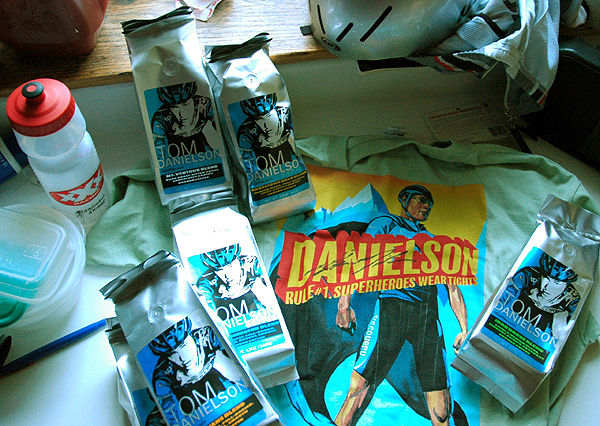
A Durango, Colo., coffee roaster recently inquired about one of my Downers Grove photos. He's marketing a line of coffee for Tom Danielson, Discovery's climbing prodigy and the top American finisher at the 2006 Vuelta, and wanted a generic cycling photo for a piece of marketing. As a fan of both locally roasted coffee and locally grown climbing specialists, I was happy to oblige, especially since he was polite enough to ask. All I requested in return was some coffee and, if Tom happened to be around the shop, a signed sock or something.
A few days later, 6 pounds of coffee and an autographed T-shirt arrived. Not a bad haul for 1/500 seconds of work.
Photo taken: Oct. 24, 2006
Oct. 25, 2006

Photo taken: Sept. 21, 2006
Oct. 23, 2006

I ran a marathon this weekend. Which is to say, I ran in a marathon.
Levi was running the Indianapolis Marathon, and since Ellen was due to visit family nearby, we drove down early Saturday to watch.
It's been almost a year and a half since my last serious run -- a happy, regret-free year and a half, I should note -- but I've always wanted to be someone's rabbit, and I was pleased when Levi accepted my offer to jump in around the 21st mile. I told him I couldn't promise to last very long, but I'd help him keep his 8-minute pace as long as I could.
I would be sore the next two days, but it turned out that the running muscles haven't atrophied as much as I had expected. I stayed with him the balance of the course, peeling off with 385 yards to go and cutting across a park in order to cheer him at the finish line as he set a personal record.
The highlight of the morning came at the beginning of the run. We'd just rendezvoused but I desperately had to pee. (The coffee required to leave Chicago at 6 a.m. is great.) So I told him to keep going, popped into a Porta-Potty and then sprinted to catch up.
This sprint created the illusion of a marathoner having an improbable gale-force second wind. "Good job!" spectators yelled as I bounded past bonked runners. "You're looking great!"
And of course I looked great: I'd only been running for 30 seconds.
Chicago's marathon was this weekend too. Walking down Michigan Avenue this morning, I saw tell-tale green ribbons around necks. Full-page newspaper ads congratulated runners. At the office, someone wanted to surprise a colleague with a standing ovation. I rolled my eyes.
In the past 15 or so years, the marathon-industrial complex has elevated the race from fringe stunt to Oprah-approved rite of passage, if not outright act of heroism. Enough is enough. It's time to stop lionizing marathon runners -- and not just because cyclists train so much harder.
Marathoners deserve congratulations and support -- just as all loved ones deserve congratulations and support for following their bliss, whether their bliss is running 26.2 miles or darning socks or performing the banjo -- but they are not heroes, and I'm tired of Nike ads that allege that they are.
Runners neither cure cancer nor survive it. I should know: I ran seven marathons. The world isn't any better for any of them. The world may even be worse for my narcissism. Those seven marathons required thousands of hours of training that could have been spent doing something useful, like learning a trade or teaching people to read or baking cookies.
Is running hard? Sure. So is parenting. So is teaching. So is driving a CTA bus. As the Dread Pirate Roberts said to Buttercup, "Life is pain, Highness."
Levi knows I'm not talking about him. He's the type who races in order to train, not the other way around. He would be mortally embarrassed by a standing ovation, the first person ever to be clapped to death, and I don't expect he wore his medal to work today. In fact, he rightly allowed that if the weather had been any worse Saturday, he would have bagged the race and felt not one pang of regret.
And just as cycling requires a greater devotion to training, so is it an even bigger waste of time and an even bigger act of narcissism. The difference is that we don't expect to hear the "Beaches" soundtrack when we cross the finish line. We don't expect mortals to pour oil on our feet the day after a race. And we only give medals to winners.
The co-worker? She didn't get her applause. She called in sick with sore legs.
Photo taken: Oct. 21, 2006
Oct. 10, 2006

The cycling season wrapped up this weekend.
(It occurs to me that I've been saying that for months: first after the last of the road races in July, then after the criteriums of August. But this time I mean it. We are out of races.)
As I rode home on the lakefront last night, a tailwind freshened my legs and made me mournful for the sudden competitive void. "If only," I thought to myself, "there were someone up the road to chase." As I glided up and around the 18th Street bridge, I thought, "If only this were Snake Alley."
The past two weekends comprised the Fall Fling: one time trial, two crits, a road race. I was most excited about the road race, which happened to fall on my birthday. It was a 40-mile race over rolling terrain that I knew would include exposure to heavy winds.
One particular team has been a bane to me all summer. Their etiquette is questionable but their sprinting is not. My hope in the road race, then, was to make sure it was a race of attrition and did not come down to a field scrum.
I was successful, sort of. I attacked several times and rode tempo in the crosswind, hugging either the gutter or the yellow line to maximize the effect. (One time I attacked because one rider from this team was being a jackass near the front. I wasted precious energy but got 45 seconds of peace and quiet.)
The field gradually shattered. At one point we were down to 13 riders, but I was too cooked to look back and realize it. My obliviousness allowed a chase group to catch back on.
Unfortunately, my efforts did not drop any of my targets. Instead, I found on each lap more of my teammates cheering from the sideline in street clothes. Oops. Sorry, fellas.
I ended up 10th. I might have done better had I not had to swerve into the gutter to avoid a crash during the downhill sprint. My criteriums were even more mediocre, 20th and 21st, and I ended up in 10th overall, two spots out of the money.
All weekend I've been replaying the races' finishes. If I'd only chosen a different gear, or taken a different line, or taken one less flier... The next race won't be until March, so I'll have five more months of these reruns.
Ellen is helping me put together an off-season training plan. I'm supposed to ride 300 miles this week, then rest a bit before attacking the weight room. She seems to think I need to develop enough upper-body strength so that I no longer need to press the handicapped button to open heavy doors.
This morning I did two things with 2007 in mind: I applied for an upgrade to Category 3, and I resumed my NetFlix subscription, so as to pass the dozens of trainer hours ahead. As I write this I am noticing the radiators clang and gurgle for the first time. It may snow Thursday.
This will be fun.
Photo taken by E. Wight: Oct. 7, 2006
Sept. 19, 2006

I'm not sure what normal boyfriends get in trouble for. Leaving dirty dishes on the table? Flirting? Emotional unavailability?
The angriest I have seen Ellen was this Sunday.
I had been in a break of eight at the masters criterium at Parkside. Just sitting in put my heart rate at 105 percent of its theoretical maximum. When the attacks started, two others and I were summarily dispensed out the back. It was when I chose to drop off the chase group, thereby abandoning hope, that I looked to the sideline and found heretofore unseen disgust. Clenched jaw, daggers out of eyes, smoke out of ears, the works. You'd think I'd just bogarted her chocolate shake. I could only shrug. I limped in in eighth place, either last of the winners or first of the losers, depending on your outlook on life.
This was the masters open race. The field wasn't stacked in my favor like last time, so even at peak fitness I would have been outclassed, plus I'd taken a week off because of a wedding and some unrelated gastrointestinal issues. My goal was merely to get in the winning break. Better to have made the separation and lost than to have never separated at all, right, baby? Maybe?
I hoped to have recovered by the end of the subsequent 4's race, but I was still too dead to make any move at the end, neither a planned suicide flier nor a sprint. On the bright side, I successfully advised young Jeff toward a fourth-place finish. If only he'd believed me about the headwind. He might have won.
This was the same course we raced this spring when patches of snow still dotted the barren landscape. Then, more than 80 riders rolled up to the line, and in the weeks leading up to each race our online forum was active with excruciatingly detailed tactical chatter. Now, despite Sunday's ideal weather, the fields were only 20 strong, and our boards were eerily silent.
All that remains is the four-race Fall Fling in October. I closed my season with this last year. Most people have wisely ended their seasons with the August crits and moved on to weekend brunches, TV binges and painting projects, or whatever it is normal people do with their lives. But I'm happy to have these bookends to the season. Even though I didn't do well, I was happy with how much I sat in Sunday. It was evident -- to me, at any rate -- that I'm a smarter rider than I was in March. This time it was fitness, not impatience and naivete, that did me in, which in a way is progress.
Photo taken by E. Wight: Sept. 17, 2006
Sept. 12, 2006

Mazel tov.
Photo taken: Sept. 10, 2006
Sept. 3, 2006

Photo taken: Aug. 31., 2006
Sept. 1, 2006

Edmund White between keirin heats.
Photo taken: Aug. 31, 2006
Aug. 31, 2006

While I was a course marshal during Saturday's race, I let three neighborhood kids play with my camera. They were captivated. It was nerve-wracking to watch as they juggled the telephoto and fought over who got to use it next, but it was an effective way to keep them within reach. It proved less nerve-wracking than watching them run into the street and into the path of the charging peloton.
Photo taken by Maia: Aug. 26, 2006
Aug. 28, 2006

Road racing imitates life, the way it would be without the corruptive influence of civilization. When you see an enemy lying on the ground, what's your first reaction? To help him to his feet.
In road racing, you kick him to death.
Tim Krabbe, "The Rider"
A strange thing happened Saturday. I won a race.
It was fun. I should try to do it again sometime.
It was the masters race at Sherman Park, the criterium my team hosts on the South Side. Because there was a competing race and because most masters riders don't like the idea of bringing their nice bikes from the North Shore into a shady part of the city, the field was small, only 20, and 10 of us were xXx.
I'd just finished the 3/4 race, in which I'd wiped myself out to support teammates in the break and the field sprint. I was just hoping to finish the masters race.
Randy got off in an early break of six. After a few laps, I was feeling recovered and decided to join two teammates in attempting to bridge. We got off hard and clean, dragging no one with us, and by working together it was elementary to get up to Randy's group. By now there was a rider off the front, but xXx now made up four of the eight-man chase group.
Our chase was disorganized as we figured out who wanted to pull. Gaps formed, and the pace rose and fell. It turned out that nobody wanted to pull but us, so we formed a rotating paceline at the front until we got within sight of the leader.
Then Randy attacked. Two others marked him, so I counterattacked immediately. It was the perfect set-up: After surging to catch Randy, nobody was inclined to catch me -- or they didn't take a guy in tube socks seriously; fools! -- and my teammates went into blocking mode.
I caught the leader with about five laps to go. As soon as I did, I was thinking of how satisfying second place would be. "Pull me around," I was about to say, "and I won't sprint it out." Such is my killer instinct. But he beat me to it. "Pull me around," he said, "and I won't sprint it out." Deal!
I pulled for 3/4 of a lap and let him take a turn. Shortly after I took over again, I turned around and he was nowhere to be seen. I had no idea he was so close to the brink.
I rode hard and kept riding hard, trying to not look over my shoulder but failing. It wasn't until the last lap that I felt certain I was going to do it. Coming out of Turn 4, I slowed as much as I could without being obnoxious, trying to savor the moment.
Naturally I did a throw at the line.
This would be Race 54 in my racing log, and it would be my first win.
I like to say that in cycling, victory doesn't go to the fastest. It goes to whoever crosses the finish line first. This race supports that truism. I don't pretend to have been the strongest in this race, or even the strongest on my team. I just caught the lucky break and managed not to blow it, and I know I wouldn't have done nearly as well if xXx hadn't stacked the field.
I raced again Sunday. I raced stupidly and burned too many matches along the way but managed to get fourth.
Assuming all my races qualify, I've now earned 20 points, exactly what I need to upgrade to Category 3. I remain torn.
I've finally become a good Cat 4 rider. It's equivalent to being a B student in the first grade. Who on earth would go to second grade and remain a B or C student if you could repeat first and be an A+++ student?
Photo taken by Cecile Redoble: Aug. 26, 2006
Aug. 25, 2006

Beauty is not the goal of competitive sports, but high-level sports are a prime venue for the expression of human beauty ... [I]t might be called kinetic beauty. Its power and appeal are universal. It has nothing to do with sex or cultural norms. What it seems to have to do with, really, is human beings’ reconciliation with the fact of having a body ...
Genius is not replicable. Inspiration, though, is contagious, and multiform -- and even just to see, close up, power and aggression made vulnerable to beauty is to feel inspired and (in a fleeting, mortal way) reconciled.
David Wallace, "Roger Federer as Religious Experience"
Photo taken: Aug. 20, 2006
Aug. 22, 2006

So, right. Bicycle racing.
Heading into last week's Elk Grove criterium, a race with an unprecedented $2,500 on the line, I hadn't raced in more than a month. More pressing, I hadn't known success in more than two months.
Success begets confidence. Confidence begets success. Treacly, but true, and in racing confidence may be more of a decisive factor than fitness or tactics.
When you have a good position and a rider steals it from you, there are two reactions. The non-confident rider says, "I guess this guy is faster than me. Maybe next time." And then he floats back to 40th place and stays there. The confident rider, on the other hand, says: "The hell you do. That's my spot, I worked to get it, and I deserve it." And he fights to get it back, more out of rage and entitlement than anything.
I know this because I've been both riders. Sometimes in the same race.
About that rage and entitlement. I'm learning the role these feelings play. I don't have a lot of either, but I'm learning how to fake it during a race. My guess is that great athletes have plenty of both all the time, which is what makes them great but also unpleasant to be around.
Back to success. The goal going into Elk Grove and the other end-of-season crits was to sit in, be patient and salvage some success and confidence to carry me through the off-season, like one last kiss to carry you through a loved one's absence.
Elk Grove criterium: 2.5-mile course with two treacherous 180-degree turns. I tried to sit in, I honestly did, but on a prime lap I found myself off the front and decided to go for it. The prime went three deep. Surely I could hold off all but two of the field, right? Sure enough, I did, winning my first prime ever, a bike fit worth $150.
I had decent position in the last lap, but let myself get swarmed and boxed in. I barely negotiated a crash in the last 400 meters, then could pass only enough people for 21st, one spot out of the money.
This Saturday was the historic Downers Grove criterium. Since it's the same course that the national championship is contested on the following day, it draws the summer's largest and strongest fields and even a few spectators. I watched several of the races last year, and I'd been studying race reports all week. I hadn't visualized a race this precisely since the great road races of May and June.
Category 4: Again I accidentally found myself off the front, despite the plan to sit in the entire time. I had a good breakaway companion, however, and even though we stayed off for only two laps, that was enough for us to exchange two $25 primes.
Alas, same thing on the last lap: Good position, but I allowed myself to get swarmed and boxed in. A massive crash had reduced the field to only 25 riders, and I could do no better than 19.
Masters 4/5: This time I was full of rage, entitlement and Accelerade. We'd gotten to the staging area late, Bob and I did, but we I weaseled a position at the front. (We had a choice: Create a new first row and get yelled at, or go to the last row and start the race in 110th place. We chose the former, knowing how important it was to have good position at the whistle.)
I hit the first corner in the front 10 and spent the entire race there. Any time someone came up the side I pounced and grabbed their wheel. Even after I contested two primes -- losing both of them carelessly -- I fought to retain my positon. Position was crucial. Eight turns meant eight chances to crash. By being at the front, I could pedal through the turns single-file and choose my own lines, rather than riding in the pack and praying someone wouldn't go wide and take me out. Just in case, I let my inside knees hang wide to discourage anyone from bombing past.
This time I succeeded in sitting in and never "found myself" off the front. Ellen was in Mexico, but I could hear her coaching: "Sit in, you silly fool!" The pros should be so lucky to have such dulcet advice piped through their race radios.
There were so many primes that they never announced three or two laps to go. Suddenly we were on the bell lap and I was in the front 10. When I sensed people moving up the side, I moved over to block them, preferring to eat the wind rather than risk losing spots.
With the exception of two Lot riders, it was a jumble of teams at the front. Lot has a reputation for, among other things, having good sprints, so I grabbed their draft. In the confusion of the last turn, however, I lost it, and they executed a perfect leadout for themselves. One of them won, but I held on for fourth.
This was not the best finish of the year, but given the strength of the field and difficulty of the race, it was among the most satisfying. Most satisfying of all may have been the urge to vomit. I felt like I'd just done a time trial, so hard and non-stop had I been working for 35 minutes. After most races I feel I could have gone a little harder. Here I knew I'd given everything I had. Exactly 100 percent of my being had gone into my pedals, and if fourth is as much as my being yields, so be it.
Photo taken by Michael Barran-Stanley: Aug. 19, 2006
Aug. 21, 2006

Downers Grove USPRO national championship. Race report TK.
Photo taken: Aug. 20, 2006
Aug. 9, 2006

In Crested Butte, Colo.
Photo taken: Aug. 2, 2006
Aug. 8, 2006

Last week I helped Ellen move the last of her belongings from L.A. to Chicago. I didn't think it could be done, but after a yard sale and trip to the thrift store, we packed nearly everything into a rented minivan.
The most troublesome items included a mountain bike, a curvy coffee table and a snowboard, not to mention five years' worth of photographs, kitchen accoutrements and sociology texts. Seeing it all stacked in the carport, I was certain that tough choices would have to be made -- choosing between taking the boyfriend or the bicycle among them -- and prepared to provide consoling hugs as Fiestaware and statistics assignments were dropped into the Dumpster, but Ellen somehow got it done. I never should have doubted. We even had enough room to accommodate a spree at the outlet stores in southeastern California. Later, a new pair of flip-flops, my first, fit nicely in the glove compartment. (Strangely, the van did not come with a flip-flop compartment, despite having been rented in Santa Monica.)
Helping a significant other with a cross-country move is an important rite of passage, one I recommend everyone do exactly once. I'm happy to report that after approximately 224 straight hours in one another's company, we are still talking. Which is not to say the week passed without its icy moments. A week is a long time. I don't know how you married people do it.
Photo taken: Aug. 2, 2006
July 26, 2006

At the Kinetic Sculpture Museum in Ferndale, Calif.
I'm feeling like a rusty relic myself. I've barely ridden since Superweek, and I'll barely ride again before Downers Grove. It's a much-needed rest, to be sure, and the cycling has been replaced with other joys and adventures, but I am disoriented. I rode 90 minutes Monday and the legs felt like brickwork. And I look at my training log and note with awe all the 12- and 15-hour weeks I put in this spring. "I did that? How?"
Since March I've helped lead a small group ride every Wednesday morning. I haven't gone in more than a month. I'd hoped today would be my return, but when I checked the weather radar at 7, a huge green claw was poised to pince Chicago. I txt'ed my regrets and went back to bed.
The claw has yet to snap.
The only thing worse than riding in the rain is not riding in the not rain. Now I sit at the window, looking on the dry streets as forlornly as I will surely be looking on the snowy landscape come January, and I'm willing the sky to open open up, just as you will a stock to collapse the day after you have liquidated. "Rain! Rain! Let it rain! Cruel gods, make not this rest be for naught!"
Photo taken: July 17, 2006
July 22, 2006

Family portrait.
Photo taken: July 17, 2006
July 18, 2006

My nephew is not yet talking, but he has a large vocabulary of signs and gestures. Drawing a circle in his palm is for cookie, and that's good enough for me.
Photo taken: July 15, 2006
July 13, 2006

Seems like yesterday I was layering up to race the crits at Parkside, and now my Superweek has already come and mostly gone. Three days, three road races, three mediocre results: 12th, 19th, 26th.
As usual I wasted too much energy on early breaks -- "Never again!" I promised after each attack, 24 hours if not 24 seconds before launching or chasing one again -- but in at least two of the races some late sacrifices helped teammates get well-deserved placements in the top 10, so I'm not totally disappointed.
The feelings of burnout I wrote about earlier haven't receded. When I finish one race I'm not immediately counting the hours to the next one. It could be related to performance: I had five top 10's by Memorial Day but have had only one since. Maybe I peaked too early? Maybe I loaded the early season with easy races? Maybe I was never as good as I thought I was?
I have probably done the season's last road race. All that are left are the criteriums of August, where because of upcoming travels and my longstanding aversion to crits, I expect I'll be racing mostly to keep teammates company.
Lately I've been having flashbacks to all the base training I did this year. Riding the fixie to Highland Park in the dead of winter. The January alley cats. Watching the entire Super Bowl on the trainer. Riding the lakefront one Wednesday morning and seeing trees burdened with icicles. That epic 5-hour ride through the rain with Ed and Bob.
All that hard work, and I can't do better than 26th? And in four months I'll have to not only do it all over again but, if I hope to improve, do more of it?
The chatter in the carpool this week has been about when we should upgrade to Cat 3. I can't do it on points, but I can on virtue of having 20 pack finishes, sort of like the booby prize for someone who has bought 20 losing lottery tickets.
I don't think Cat 3 will be significantly harder, but Cat 4 is fun. I'm enjoying lining up and knowing I have a decent chance at success, recent results notwithstanding, and I want another crack at winning certain races, Baraboo and Snake Alley in particular. I also like having as many as 20 teammates in a race; I'd be lucky to have four in any given Cat 3 race. On the other hand, Cat 3 races would be smoother, and, I am told, the teamwork is more organized and consequential.
Be a good Cat 4, or an average Cat 3? Good thing winter will be here soon. I'll need all that trainer time to meditate on my decision.
Photo taken: July 11, 2006
July 10, 2006

Photo taken: July 7, 2006
July 5, 2006

Maxwell Street Market. The taste of Chicago.
Photo taken: July 2, 2006
June 28, 2006

The narrator in "The Rider" starts his career at the age of 29 and races more than 200 times in his first two seasons. I, too, started my career at 29, but in my first two seasons I've raced only 44 times, including alley cats and practice time trials.
Even so, I'm beginning to think I've raced too much.
It's hard not to. The winters here are as hard as they are long. Racers emerge in April desperate for action, hopeful to never ride the trainer indoors again. Skip a race? Ha! We waited five months to race, so once the snow melts, of course we spend each weekend driving across the midwest, springing for hotels and tanks of gas and abandoning our friends and families. (We'll reacquaint ourselves with them in November, unless we do cyclocross instead.)
I raced three times this weekend and despite plenty of hills, spills and chills -- and my first in-race shouting match! -- I lack the energy to write about it here. The minutiae and trivia of every turn and attack don't excite me like they used to. If I'm not burned out, I'm very close.
The state championships are this weekend. Supposedly they're the most important races of the year, but I'm not as excited as I was for the throwaway races of April. My heart doesn't skip when I daydream of the tactics. I haven't even shaved my legs for them yet.
Ironically, all the racing has seriously cut into my training. I used to love leaving the house with pockets full of Clif bars and nowhere to be for six hours. I can't remember the last time I logged more than 50 miles at a time. There are good cycling friends with whom I haven't ridden at all.
I'm also sad that two of my favorite teammates may be done for the year. One is running out of money. The other is running out of knee. A part of me regrets encouraging them to race so much with me early in the season. (I offered Superweek fees to the first; he declined. I'd offer my knees to the second if I could.)
That said, there aren't many races I regret having done. Each one has at least one moment that makes me smile weeks later. Each one has in some way made me a better rider.
On the other hand, there's not much racing left. I'll do the road race Saturday, and then I'll do four races during Superweek. After that? Maybe a crit here and there, but I'm also due for some non-cycling fun. Summer, my favorite time in Chicago, a time of bare feet and naps in the park, a time of kuchens and fresh basil, a time to sit contented on the back porch and say, "Oh, right, this is why I live here," is speeding by. It's almost July, for heaven's sake, and the hammock remains in the basement.
Photo taken by E. Wight: June 25, 2006
June 26, 2006

Warm-up lap.
Photo taken: June 25, 2006
June 23, 2006

I'm pretty sure they ended up OK. At least one raced again, one cheek hanging from a hole in his shorts.
Photo taken: June 22, 2006
June 20, 2006

If it's going to storm during a camping trip, there's only one good time for it to do so, and that is while the two of you are making a grocery run. And when you walk out of the grocery and are greeted with a rain as hard as any you've seen, there is only one course of action: Look at each other, look at the beer under each arm, look at each other again, and then sit underneath an eave, split a Spotted Cow and watch as the wind carries grocery carts from one end of the parking lot to the other.
Photo taken: June 17, 2006
June 12, 2006

I don't believe the rider who ... told me how he had seduced a woman during a criterium. She was standing behind a crush barrier when he discovered her, or she him. (If she'd told me, I would have believed her.) Every hundred seconds he came barreling past, and so their love blossomed as prettily as a flower in one of those time-lapse films. Ten laps long they smiled at each other, for another ten laps she winked, they began running their tongues over their lips, and by the time the race was approaching its decisive phase their gestures had become downright salacious.
He said so, but I don't believe him, because he's a very good racer. It's impossible.
Tim Krabbe, "The Rider"
But nothing is impossible if you are not a very good racer.
My team had four people in last year's Spring Prairie Road Race. Only one finished with the pack, and it wasn't me, not by a long shot. This year would be different.
With a killer hill right before the finish line, it was a course suited to me. As soon as I noticed registration was open and that the field would be limited to 75, I started recruiting. Since it was Wisconsin's state championship, I figured the field would fill up quickly. I wanted as many teammates as possible.
A teammate was the first to register. I was second. Other teammates were third and fourth.
And sixth, seventh, eighth and ninth.
And 10th, 11th, 12th, 13th and 14th.
By the time capacity was reached, xXx constituted 23 of the 75-person field.
Alas, my fiendish ploy to hijack Wisconsin's championship was foiled when the promoters created a second field, separating the Wisconsinites from out-of-staters like us. (With our 2006 palmares -- victories at Parkside, Cobb Park and Baraboo, podiums just about everywhere else -- who could blame them?)
Rain fell in buckets Saturday morning. At 6:30 I checked the radar and found a green and orange blob spread across the Midwest. I drew an appropriate shirt, from Ride Across INdiana shirt, out of the drawer.
I'd been obsessing about this race for two weeks, but I hadn't thought to consider weather. There's nothing worse than a crowded race on wet roads.
Miraculously, rain, darkness and sorrow yielded to sunshine, warmth and glee once we crossed the state border.
As I greeted friends in the parking lot, I asked, "Ready to break some legs today?" To a person they answered in the affirmative. I had teammates who could drive the tempo in the flats. I would do the same on the climbs. It was entirely possible that someone could beat us, but we would make sure they earned it.
We would do six laps, ending each one with a steep hill that promised to damage the peloton each time up. It was this hill that would teach me an important lesson this day, that of not getting cocky about one's strengths.
Ever since San Luis Obisbo, I've relished opportunities to show off my climbing abilities, and I spent each of the first three laps showing off my nonchalance.
The first time up I casually glided to the fore and waved to spectators, as if I were a parade marshal leading a caravan of elephants and marching bands.
The second time up I made a show of drinking from my bottle and gargling.
The third time up I planted a kiss on Ellen. (I was going so fast, her head spun. Neck injury was narrowly averted.)
After the frst three laps whittled the field from 60 to 40 to 20, it was time for a selection to be made. A Northwestern rider joined Ed and me in setting a punishing tempo after the fourth climb, and the final group of 12 was established. Five were xXx: Me, Ed, Kevin, Ken and new teammate Pieter, who not having a uniform was riding incognito.
Once this group was established, only a few took pulls. Others moaned about how they were isolated without teammates. They'd just sit in back, thank you very much.
Ed and I spent the last few laps whispering about how we were going to win this race. It was pretty much a continuation of exhaustive discussions we'd been having over e-mail all week. Do we attack? When? Where? Both of us?
That's why I love cycling so much more than running, and it's why I enjoy writing these race reports as much as you enjoy reading them. Each race is a new puzzle waiting to be solved, a Rubik's Cube that continues to shift and change colors just as you think you have it figured out. If you've run one marathon, on the other hand, you've pretty much run them all. Strategy is the same, independent of course or competition: Run hard, run hard some more.
Heading into a stiff wind in the backstretch of Lap 5, the pace settled into a mosey. Naturally I did the same stupid thing I always do when I'm in a pack and I'm bored and impatient: I rolled off the front. And naturally the pack did the same smart thing it always does: It let me go.
I was surprised but pleased with the gap I got. 400 meters? This wasn't anything Ed and I had discussed, but I thought maybe I could expland it over the hill and make it stick for a lap. It was only 6 miles. I had blockers. What could go wrong?
We were starting to lap riders. When I passed a teammate, I yelled, "When they come through, tell Ed I've cramped up real bad!" Then I made a show of shaking out my right leg. I figured if the group thought I was injured it wouldn't chase so hard. Such is lesson No. 1 of cycling tactics: When you can't be fast, be sneaky. (I'd read about this stunt in a book some time ago. It worked in the book, but it didn't here. Nonetheless, I had fun trying. )
Halfway up the hill, I could tell I was going to get caught, but I was startled to see myself get caught in such a blaze of glory: Here was Pieter screaming up the left! He flew up the hill faster than anyone I've ever seen climb. Great! A counterattack! The move was brilliant.
Except it wasn't an attack: Pieter had thought we were on the last lap, and this was his big finish. It was a shame, because nobody could have ever matched his rapid ascent. (Afterward, impressed with his amazing tuck as much as his climbing, I asked him, "Where'd you learn to ride like that?" "Belgium." But of course.)
And then the last lap. Again we moseyed through the finishing flat until Ed moved to the front and set tempo to keep people honest and discourage attacks. He pulled off and other riders started to attack, but none got separation.
I came into the final corner in third. And here's where I blew it.
The first five times up the hill I'd done it by the book. I nailed it each time. Great form, smiling for maximum oxygen intake, spinning in my largest cogs. This time I got cocky and tried to assault the hill in a smaller cog. The gear was too high. I couldn't turn it over fast enough, and I had too much hubris to shift down and get into my proper rhythm.
I tried to grind it out. I had plenty of gas and had been feeling great even after my flyer, but I was sputtering. Meanwhile, the rest of our group started to pass. Ed almost looked upset at me as he went by, upset to be picking up my slack when this was supposed to be my moment. I came close to catching two riders, but I ended up ninth. Normally this would have satisfied, but I couldn't help but think that this had become a 12-man race, and I could claim no better than fourth from last.
Happily, Ed showed his usual excellence. He came in second, finishing behind the rider who had moaned the loudest about his lack of teammates. ("He didn't pull!" I would pout over lunch. "Yes, and he won," Ellen would remind me.)
Afterward Ed and I bowed our heads solemnly and crossed our arms. What happened? How did we not win this? What was the right solution to this puzzle? Sure, we broke some legs, but there's no prize for top leg breaker. There's only a winner and then everyone else.
This was a course and a field tailor-made for us. When do we get a chance to crack it again?
Photo taken by E. Wight: June 10, 2006
June 5, 2006

Happy birthday, Malcolm. May two be twice as fun as one.
Photos taken: June 5, 2005, through June 5, 2006
June 1, 2006

I wasn't planning to race Sunday. I was just driving to Indiana with Matt so I could rendezvous with Ellen and join her in Monday's road race. But an hour before Sunday afternoon's criterium, only 12 people had registered. That sounded like an active-recovery ride to me. Plus, what kind of rider would let a teammate race alone?
Ultimately about 30 riders entered in temperatures that again topped 90. The course was a basic four-corner downtown race: 1 kilometer long, 45 minutes plus 2.
About 25 minutes in I was near the back and noticed the guy next to me complaining about the heat and appearing like he was about to cry. I figured if he was on the brink, others would be as well, so this would be a good time to accelerate and shake things up.
There I went, gliding off the front. I was foiled, however, by the very clever thing the pack did next: nothing. Instead they let me get a 200 meter lead, and with 30 minutes to go in stifling heat, they were smart enough to let me keep that lead for about four laps. Finally they started to chase, and as soon as my lead started to recede, I stood up so they could put me out of my misery.
Back in the pack, I occasionally let a gap open in front of me, hoping it could cleave the pack, with Matt in the lead group. This didn't work, and racers would scold me for allowing the gap. I feigned fatique. "I did Snake Alley yesterday. What the hell did you do?"
We were down to 20 in the sprint. Nothing special. Matt took 7th. I was near the back in 13th. One of these days I'll learn to sprint, or learn not to attack so early.
By the next morning I had still not learned not to attack too early.
Ten miles into the 44-mile road race -- and in the same 90 degree heat -- I rolled off the front and the pack let me go. I maintained a 20-second gap for about five miles. The question is, Why? Did I really think I could hold off the pack for 34 miles? Who do I think I am? Will I ever learn?
If I never learn not to attack so early, maybe I can at least learn to abandon the effort once it's obvious nobody is going to join and help. Instead I dangled. The only joy was passing Amish women on their bicycles. I tipped my helmet and bid them a guten Morgen.
With 10 miles to go an unattached rider was off the front. He looked strong, so on a hill I attacked to bridge. I caught him easily and we started trading pulls. A minute later we were joined by another unattached rider, a guy I recognized from April's McCormick's Creek race. He had came in third, so I knew he was strong and, just as important, friendly and cooperative. It took a few cycles, but soon we had a great rhythm and a huge gap. I had two teammates blocking in the pack, and the first unattached rider said he had two confederates as well. There would be no stopping us.
And then I made the biggest blunder of my young cycling career.
There was a spot about 8 miles from the finish where the course turned right at a dead end. There was too much gravel on the right side, so riders had to turn left, then slow and make a 180-degree turn.
As fate would have it, there was a very similar intersection about a quarter-mile prior. When we got to it, I had just come to the front and thought we had arrived at the second, more complicated turn. Indeed, a marshal waved his flag from left to right, which I took to mean, "This is where you turn left, then right." I alerted my break partners: "Here comes that U-ey!"
I was wrong. This was in fact a normal left turn, but when I slowed and veered right, the two behind me collided and crashed to the ground. Our break -- and my first real shot at a victory -- was done for.
That was crash No. 1.
The orginal attacker was hurt and couldn't continue. I stopped to express my horror and remorse, but when the pack came by 30 seconds later, the third rider and I hopped back in.
Climbing with 1.5 miles to go, I attacked yet again and got a small gap. I don't know whether I could have held my lead, but it became moot when I took a bumpy downhill turn too wide and rolled onto the grassy shoulder. I stayed upright, but by the time I got back on the pavement, the pack of 20 was several bike lengths away.
That was crash No. 2.
The pack drifted away. I was certain I was out of it. Then, my salvation: another hill. I scrambled up in time to reintegrate with the pack.
The course was windy and undulating, so nobody was sure where the finish line was and started jumping way too early. I, however, had noticed on the second lap that there was a Prudential "For Sale" sign about 600 meters from the finish line, then cones at 200 meters, so I waited until the Prudential sign before I became aggressive about position. By this time people who had jumped were losing steam. I was able to hop from rider to rider and took fifth place with a throw.
Oh, to think what could have been ... if I hadn't attacked so early ... if I hadn't crashed out my break partners ... if I hadn't ridden into the ditch ... if I hadn't raced four days in a row ...
Rolling through the cool-down area, I abruptly turned around to catch the finish of the women's race. Naturally I did this without looking to see whether anyone was behind me. There was. He was going slow enough that neither of us fell over, but there you go: Crash No. 3.
After 11 races in 30 days, maybe it's time to take a few weekends off?
Photo taken: May 29, 2006
May 30, 2006

I work with a bike racer who hates watching bike races. For sport, I often ask him how he's enjoying the latest events, just to hear what he'd rather be doing than watching Paris-Nice, or the Giro, or whatever. Mow the lawn. Pluck out his eyeballs. Die.
It surprised me, then, to see him become wistful when I told him I'd be doing the Snake Alley Criterium in Burlington, Iowa. It's a race notorious for a steep brick switchback that brings even professionals to their knees.
"Snake Alley!?" he said. "That race -- That race is the best event to watch."
"In all of sports?"
He thought a moment.
"Yes. In all of sports."
And so it would prove to be, but first I'd do Friday's road race.
I have a tautological rule about bike racing: All races are fun, no matter how well I do. Even if I crash or get dropped, it's bike racing, and bike racing is fun. Ergo, every race is fun.
My rule took a holiday Friday with my first race ever that wasn't fun at all.
It was a flat, 31-mile course from Wapello, Iowa, to Burlington. With no hills to cause separation and no attacks being attempted, there was nothing to break up the field. Just about all 110 of us stayed together, even the dude wearing the Camel Bak.
A tailwind kept us going between 24 and 30 mph. It was the 24 mph that was the killer, because it sent a ripple of "Slowing! Slowing!" through the pack. The air was thick with the smell of burning brake pads.
I never got closer to the front than the 10th or so row. It was too damn congested to do anything. As soon as I moved up a few slots up the side, the middle would surge forward. As soon as I moved up a few slots up the middle, the sides would surge. And then we would slow. It was as frustrating as a traffic jam: nowhere to go, nothing to do. If I could have gotten to the front I would have happily hammered it just to string it out for the sake of the race, but there was no way to get there.
The first crash happened with five miles to go. I don't know what caused it, but I was surprised by how calmly the pack glided around it, perhaps because we had been anticipating it for 20 miles. Crashing was inevitable from the get-go.
The pace picked up with 2 miles to go. With 1 mile to go, I swerved to avoid a chunk of asphalt the size of a shoe. Unfortunately, my teammate Terry wasn't so lucky and hit it square on. He went over his bike, slid across a sidewalk and slammed into a rock face. It sounded like a gunshot. Miraculously he walked away from it with only a bump to the head and a stapled-shut wound on his elbow. He would not only race another day, but would race the very next day with Snake Alley.
With half a mile to go we were dumped into Burlington with a straight descent to the finish line. Finally the course spread out. I was able to make steady advancement, hopping from train to train. My maximum speed was 41 mph, which I think is a PR for my sprint.
Then there was even more crashing. All around me were the sounds of violence being done to bikes and bodies. It was too much. It sucked away my will to race. I had plenty of gas to crank up my sprint even more, but I no longer cared. I just wanted this to be done with.
This was no race. This was no test of endurance or strength or tactics or handling. This was a gumball machine, with victory going to whomever got spit out first.
I think I ended up in the top 15, but I must have been obscured in the official photos. I didn't bother to contest the results. Instead I rolled around to make sure we were all accounted for and doubled back to look for Terry. Somewhere along the way I crossed the finish line a second time, so my official result was 89th. Whatever.
And then the Snake!
I wasn't so worried about the climb. I like climbing. The longer, the harder, the better. I was mostly concerned about the descending. Watching riders warm up and practice their descents, their inside knees splayed as they took turns in excess of 30 mph, I could already feel my tires giving out under me.
In the morning's junior races, several riders keeled over as they tried to ascend. They'd get halfway to the top and then their eyes would roll back and they'd lean over and fall to the grass. It reminded me of the scene in "Empire Strikes Back" when Luke's ton-ton collapses beneath him on the frozen planet of Hoth.
Bob would be my only teammate. Some Snake veterans had given us some excellent advice, chief among it the importance of winning "the race before the race." By having registered early, Bob and I were entitled to start in the first two rows. Getting around Turn 1 and to the Snake first would be crucial. If you get bogged down behind slower riders or crashes, you're done for.
Bob and I both did fine sprinting to the Snake, but he lost momentum behind a crash. I, however, was able to hump it up in good standing and didn't feel too shabby. The field was already spread out over several blocks, which was a blessing because I did not want to be descending in company. My fears receded.
But then I had to do it 11 more times. Each time to the top I wanted to throw up. It topped 90 degrees and even though I'd been hydrating all day, I was overheating. In the interest of shaving weight, I had brought only half a bottle of Accelerade with me. I briefly wondered where the safest point would be to vomit -- the start/finish area sounded good -- and whether I could do it on the go and be able to find water to rinse my mouth out.
Beyond the Snake, it's important to have a routine for getting around the course. My brain was too fried to think -- on the last lap, the rider in front of me lost concentration and took a turn too wide, crashing into hay bales at 30 mph; I myself bounced a pedal on a turn but stayed upright -- so I eliminated the need to think. Instead, I just tried to remember the cues. Shift here, swing wide here, tuck here, drink here.
The leaders were quickly out of sight, but gradually I picked people off. During one climb I actually snarled "Get out of my way!" at a rider who was losing the fight against gravity.
This was a good lesson in what our coach calls "staying within yourself." There was only a short stretch where drafting would have been beneficial, so I didn't kill myself trying to bridge forward. Instead I stayed within my means and let the people ahead of me crack first. Often I'd be able to suck someone's wheel in the flat headwind section, and then as they started to quiver in the homestretch I'd attack around them and ruthlessly leave them behind. (Once I did this just as the announcer was saying, "Look at these two riders working together!")
Spectators played a huge role on the Snake. I could see nothing but brick in my field of vision, but I could mark my progress based on who I was hearing cheer me on. Clif Bar guys at the bottom, Alvarado and Gigi in the middle. As soon as I could hear Phil near the top I knew I was almost home.
A teammate watching at the top tossed some much-needed water on me on Lap 10, just in time. As important as water was information. Around Lap 6 my allies told me I was somewhere around the top 15. Had I not known this, I very easily could have given up. I've broken ribs in races and not given up, but this was too much.
Then another saving grace: The leader lapped me on Lap 10. This meant I had only one lap to go, not two. I pushed as best I could on the descent to pick off one last rider and came very close to picking off a second, but my throw came a half-second too late.
I crossed the finish line in 13th and wanted to die. I found an unattended bottle of water at Turn 1 and helped myself, then crashed to the ground.
Next: Reports for the weekend's other two races, in which we will learn how many crashes I can cause in a single race. (Hint: Less than four!)
Photo taken: May 27, 2006
May 28, 2006

Abbreviated race reports from Iowa:
Friday, Wapello-to-Burlington Road Race: I've never had to work less in a race. I was miserable!
Saturday, Snake Alley Criterium: I've never suffered more in a race. It was great!
Photo taken: May 27, 2006
May 26, 2006

Junior national team and xXx member Sean Hopkins.
This was my first time onto the velodrome. I had fun, but I can't say I was seduced. It didn't help that I was on my street fixie and not a proper track bike, and some allege that Northbrook isn't a proper track.
Photo taken: May 21, 2006
May 22, 2006

Put your index fingers between a rubber band. Spread your fingers as far as they can go. You have just created a model of the Monsters of the Midway criterium course.
I'm slowly coming to appreciate crits (slowly being the operative word) but with its long straightaways and tight spaces between turns, I knew Monsters would be fast and dangerous. Sprints would be inevitable. My only hope, the break, would be a longshot.
As we ate cookies on the curb after the races, Ed asked me a question about the masters race we had done. I drew a blank. What masters race?
Oh, right. That one.
I raced twice: masters in the morning, Cat 4 in the afternoon. Both were harder and faster than any others I've done, but for as much of an impression as they left, I have almost zero recollection. There were some attacks, some chases, some sprints. I was too preoccupied with keeping up and moving up, however, to transfer any details into long-term storage, let alone enough details to contribute to the debriefing.
Perhaps I should take notes during races. A peloton, after all, is a complex system, too complex and too fluid to record unassisted.
Krabbe calls it "the continuosly shifting braid," a rope of a hundred kinetic strands that is woven and rewoven. When a race is as fast and as hard as these were, it's impossible to save enough data to process later. It's like staring at a ceiling fan and trying to count the individual revolutions. One can isolate one or two passes, but then it all becomes a blur again.
That may be what I like best about the breaks. Suddenly the system is simple enough for even me to comprehend. Suck, suck, pull. Suck, suck pull. Suck, suck pull. Smile for cameras. Suck, suck pull.
I know at one point -- I think it was the Cat 4 race -- I was in third wheel and didn't feel the first two wheels were working hard enough to bring back a dangerous break. "Pull hard or pull off," I growled before moving moving forward to do it myself. Then I counterattacked.
I remember being terrified heading into each corner and having a "phew" moment each time I left one upright. I got the jitters any time I rode more than two abreast, which may have been why I worked so hard to string out the front. This was a welcome difference in the masters race: They knew how to ride. With the inexperienced riders in the 4's, each corner would be accompanied by a panicky chorus of "Inside! Inside!" and "Hold your line!" Miraculously, there were no crashes.
In both races I had nothing left at the end and lumbered across the line around 25th place. Teammates later told me I was smiling less than usual and working too hard. I can deny neither accusation. I'm still not smart or patient enough to hang out in the back where it's easier.
I wouldn't have minded if the work had contributed to team results. In the masters race Randy got into the winning break, but it was another team's blocking that made that possible. In the Cat 4 race, I rode tempo near the end, but at a very indecisive moment, and we didn't assemble a good enough train to get the victory. Instead we settled for second and third.
Is second and third a better team result than first and tenth? I say yes, but I bet sprinters would disagree. My co-worker the track sprinter likes to say that second place is merely "first loser."
And that, dear reader, is as close as I'll get to sulking. I see no use in dwelling over missed opportunities or poor performances. I get enough of that at work.
It was a beautiful day not only to race but also to watch racing, from the juniors in the morning to the Cat 5's late in the afternoon.
As I was photographing the Cat 3 race, two Northwestern riders came up to me.
"Are you Luke?"
Urr, yes.
"We read your blog!"
Blush. They'd apparently seen somebody taking pictures when he should have been warming up for his own race and naturally concluded it was me.
One was a Cat 2 racer who looked not much older than my nephew. Once again I cursed myself for not getting into this 10 years sooner. What the hell was I doing in my 20s that was so important?
I had fun watching the Cat 5 race. I'm fond of our new riders. They're almost as adorable as our juniors. In their first few races they are as overenthusiastic as I was -- am? -- and I'm excited to watch as they find their legs. I trust they won't get discouraged when they, as was my fate last year, get lapped and yelled at. This year it was me doing the lapping and the yelling and a little bit of the swearing. Their turn will come.
Photo taken by Sandy Weisz: May 20, 2006
May 14, 2006

Photo taken: May 13, 2006
May 8, 2006

A year ago I rode my first road race, in Baraboo, Wis. I didn't do very well. I darn near fell off my bicycle in the warm-up. But I knew I could do better, and I couldn't wait to return to find out for sure. Planning out my 2006 season, I made Baraboo one of my top priorities.
Then I learned that Baraboo is where Eric Sprattling passed away, and my commitment doubled.
My team wears two hearts on its sleeves. One is for Eric. He was a member who in 1999 suffered a fatal aneurysm during a race. I never met him, but this memorial spells out the great loss to Chicago and to cycling.
I read the memorial often. I'm always touched by how Marcus put it: "He went out doing the thing." I love that. Doing the thing. The racing, the training, the camaraderie, the thing that possesses us to overcome every difficulty, to make every sacrifice. Whether my time is this year or in a hundred years, I'm proud of the fact that I will go out having done the thing.
I decided to make Baraboo an important race not just for me but for the team as well. We are extremely fortunate to have this team, and I felt doing well at Baraboo would be a good way to honor the pioneers who made it possible. I talked it up for months, reminding everyone of our history there but also what a fun and challenging course it was.
It worked. Even though the race was at 9 a.m., we had 14 men drive four hours and stay overnight, some in a nearby campground. This was by far the most teammates I've had in a road race. Usually I'm lucky to have four or five. I especially appreciated the rookies, the ones who knew that, as I did last year, they would probably fail to stay with the pack over the first climb, but who came out anyhow.
The course had two significant climbs. We'd do two laps. When I made it over the first climb not only with the pack but at the front of it, I felt victory, having tangible evidence of how much I'd improved since last year.
Even with our numbers, I didn't think we would want to attack much. I figured we should let the hills do the work for us. Surprisingly, though, the pack didn't shatter nearly as much as I thought it would. After each climb I goosed the tempo a bit, but let up once I saw it wasn't having much effect. In retrospect, I wonder whether I underestimated how much everyone else was suffering, and whether one or two more hard pedal strokes would have broken things up. That's something Tim Krabbe writes about: "Shift, when you're really, truly at the end of your rope, to a higher gear."
With 4 miles to go, the field was about 25 strong. Once again it would come to a bunch sprint. I'd spent most of the race near the front and didn't have a good read of our composition. Word got passed from the back: We didn't have our ace sprinter with us. It was time to improvise.
I saw Ed up ahead. I scooted forward and checked in.
"Ansgar's not with us."
"Oh, shit. You're kidding."
"That's the memo from Tim. So you're our guy, Ed."
"OK. I still have some leg left."
"Good. More than I can say for myself."
Ed let me in ahead of him. I'd moved up just in time. The pace turned extremely hot as the course descended into the final milelong flat. We leapfrogged a bit, but I focused on staying ahead of him, glancing back often to make sure he was still on my wheel.
With 800 meters to go, someone jumped on the left. This was way too early, and once he got into the wind he slowed, creating a brief bottleneck. Ed capitalized, squeaking past on my right.
Suddenly I lost the wheel I was on and couldn't find a new one. Oh, familiarity; oh, contempt. It's always so crushing to have people pass in the sprint. They don't even go that much faster. It's like falling down a hole in slow motion, clutching blindly for a handhold. With each wheel that passes, I sink further in the standings, and all the hard work sinks deeper into the realm of all-for-naught.
I got 10th place. Crossing the line I saw fatigued and beaten riders congratulating Ed. He'd done it. He had won. The team had what it had come for.
I know it sounds like a platitude every time I say it -- and I've now had the fortune to have said it twice -- but seeing a teammate win is just as sweet as winning myself. It means the race wasn't for naught after all.
And then the masters race.
Since the races were only 27 miles this year, I decided to do the masters 4/5 race that started immediately after. I knew I'd be gassed, but I actually looked forward to getting dropped. I haven't gotten dropped since Superweek last July. I needed to be reminded of the terror and despair of fading from the pack. I needed to be reminded that the pain of gutting it out was nothing compared to the pain of being alone.
The masters race was more intense than the earlier race. Ed and I struggled just to hang on, but we managed to keep good position and even shut down a break or two. We were encouraged by the younger riders who stuck around to cheer and heckle. I was sure to flash Tim a cowboy, ninja or bear every time I passed.
The nice thing about masters racing is that there's not the surging and slowing that you get with the youngsters. Often in the elite fields, kids fly to the front and then grind to a halt once they remember: "Oh, yeah. Pulling is hard!"
Ed flatted after the first lap, leaving me alone when we returned to the big climb. This time the pack would shatter.
An exploding field is about the most beautiful thing to see in cycling, even better than a well-timed leadout train. Naturally it depends on your perspective. For me, the view was pretty sweet. I started the climb in the middle of the pack, but soon I was doing slalom around popped riders. The chaos was rapturous.
The first five riders up the hill quickly organized into a paceline. I spent a half-mile chasing them alone. I was so beyond my limits that my navigation system shut down and I drifted into the gutter. I recovered, but this was my cue to sit up. It wasn't long before I heard two riders behind me. I accelerated and joined their chase.
It was me, an Atkins rider and a Brazen Dropout. The leaders dangled a tantalizing 40 meters ahead of us. The Dropout refused to pull, as he had a teammate up the road. Talk about brazen, but, hey, that's racing. Negative racing, but racing nonetheless and better than just riding in circles.
Atkins and I worked well together, yet the gap grew. After a few miles I tried to persuade the Dropout to help.
"So you've got one of the five up there, huh?"
(Head nod.)
"Wouldn't you rather have two of eight?"
"I'll have to think about that."
"Well, don't think too long, because we're dying here."
Finally the Dropout decided to take some pulls, but it was far too late. I tried to break away on the last climb, and when that didn't work I tried to set Atkins free. That didn't work either, and in the sprint the fresh-legged Dropout dusted us both for sixth place.
My fixie has had funny noises (funny strange, not funny ha-ha) coming from its bottom bracket, so I took it into the shop last night. My racing bike needs some repairs, too, though with all the shops experiencing the annual fair-weather rush, I don't know when I'll get it done without missing anything important.
And this body of mine. It could use a tune-up itself, if not a complete overhaul. Next week's rest week can't come soon enough.
Photo taken by L. Alton: May 6, 2006
May 2, 2006

We were pretty deflated after Saturday's road race, the first of three stages in the Anderson Mayors Cup. There had been no challenging climbs to separate the field -- on the course's modest hills I amused myself by heckling those who struggled: "Why are we slowing? Is there an obstruction ahead? Are those gears I hear being changed? For this?" -- so after 43 miles the race came down to a bunch sprint. Since I was still recovering from an aborted break, I volunteered to lead Tim out. We had great position, me in fourth and him in fifth, but we got anxious and jumped way too soon. Riders zipped around me like two sides of a zipper zipping around something that ought not be stuck in a zipper. Tim got a disappointing 10th. I settled for 17th.
Then a funny thing happened: Tim killed the time trial. Must have been his skinsuit. He would enter Sunday's criterium in fourth place in the general classification.
Waking up Sunday, however, I wasn't even sure I'd race. Rain was forecast for the entire day. Crits are dicey enough when it's dry. A wet surface was a prescription for road rash, busted heads and, worse, dirty components.
The rain worked to our favor, however. It kept our field small, around 25, scaring away even the riders in contention for the overall prize, including second and third place. First place had a prohibitive lead, but if we could keep anyone from scoring points on Tim, he'd finish the weekend in second place.
Four of us stuck around for the crit. At the starting line we did a head count. One. Two. Three. Three?
Where was Tim, our great GC hope?
The promoter was ready to start the race. "Second place had a mechanical," I said, making something up, "but he'll be here soon!"
The promoter shrugged. We tried to stall.
"Is there a wheel pit?"
"Where is the feed zone?"
"Can you tell us more about the wheel pit?"
Apparently Tim had taken an extra warm-up lap and gotten stuck behind some pokey masters riders. Finally we saw him come around Turn 4, trying to catch up to us as if he were, as he'd put it later, the neighborhood fat kid. He was still about 50 meters away when the whistle blew, just in time for him to help himself to a flying start.
My job during the race was to chase down any moves by rider nos. 459, 460 and 485. Those were the threats to Tim's standing. Whenever someone attacked, I could count on hearing Tim behind me, saying either "Let him go" or "We need to shut that down," and I reacted accordingly. (Racing is much easier when I don't have to think for myself.)
The course proved not nearly as treacherous as I'd feared. We let the overall leader escape on a solo breakaway, and then a few attacks and counterattacks broke the lead group into a pack of nine. We took the corners single file, nice and easy.
With three laps to go, Tim and I settled into fourth and fifth wheels again. We spent the entire last lap discussing our leadout so that we wouldn't make the same blunder as in the road race.
It turned out to be moot: I led him hot out of Turn 4, but then another rider jumped way too early. Tim hopped onto that wheel and sprinted around it for the win, claiming second in the race and locking up second in the GC. After topping 35 mph in the homestretch, I threw for seventh, squeezing into 8th overall and into the money, insofar as winning $25 for a race that cost $65 to enter and $60 to drive to is "in the money."
Afterward, two different riders told us how mad they were that they had heard us blabbing about our plans but still weren't able to beat Tim. (Note to selves: Stop blabbing so much!)
Photo taken by E. Wight: April 30, 2006
April 27, 2006

Fifty things to bring to my first stage race:
Messenger bags (2)
Camera bag
Camera
Lenses (3)
Jerseys (2)
Bib shorts (2)
Arm warmers
Knee warmers
Rain shell
Long-fingered gloves
Short-fingered gloves
Shoes
Cleat covers
Aero booties
Caps (2)
Helmet
Sunglasses
Chamois creme
Allen wrench
Grease rag
Lube
Endurox
Water bottles (3)
Accelerade
Protein bars (3)
Clif bar
Clif Shot Blocks
Suntan lotion
Race number
Riding wallet
Cycling computer
Spare tube
Heartrate monitor and mount
Heartrate strap
Not pictured:
Photo taken: April 27, 2006
April 26, 2006

"HOLY CRAPOLA!!!!!!!!!!!!!!"
That was the subject of Tim's e-mail. He'd just learned that Indiana University's Little 500, an annual bicycle relay race, was happening the day before our race near Indianapolis.
Ever since it was featured in "Breaking Away," a movie that is to cyclists what "Rocky" is to boxers and "Richard III" is to hunchbacked monarchs, the Little 500 has been a touchstone for the Lycra set.
To see the race firsthand, we'd have to leave at the crack of dawn. There never was any question that we would.
Until we missed the turn to I-65.
We had seemed to have been heading east for an unsually long period of time. "You know where we're going, right?" I asked our driver.
"Sure," he said. "Indianapolis!"
About 30 minutes later we hit South Bend and realized we did not in fact know where we were going. Around the same time we discovered that Indiana was in the Eastern time zone, not the Central. Also, our car started spewing smoke.
So we didn't get to Bloomington until 100 of the Little 500's 200 laps had already been ridden. By this time Alpha Tau Omega had long ago lapped the field and was on its way to an easy victory, and the crowd-favorite Cutters were fading from contention.
The race is primarily an excuse for college students to drink while their fraternity brothers go 'round and 'round a dirt track. Normally the only Greek system I support involves olive oil, oregano and handfuls of garlic, but I still found the Little 500 pretty awesome. I felt like I was in a Bizarro world, one in which cycling is cool, thousands of people pay $15 to watch an amateur race and buxom co-eds announce their favorite cycling clubs across their ample chests. Priorities were in order.
I don't think I would like to live in this world, but it was nice to visit.
Photo taken: April 22, 2006
April 25, 2006

You should attack if you want to win. Men who wait are not right. OK, I didn't win, but still.
Leif Hoste, second place, 2006 Tour of Flanders
Tim attacked first, going off with a Bolla rider on the first of eight 4.5-mile laps. It didn't last long, but the way that the Bolla riders blocked -- lining up four abreast and taking up more than half the narrow road -- made it was clear that a successful break would have to include Bolla.
Before the race someone said they'd never seen a break stick in an Indiana road race, but fortunately Tim and I aren't ones to let prudence get in the way of a good attack. We took turns attacking and counterattacking until two other riders -- one Bolla, one Tortuga -- went off on the third lap. I jumped to bridge and was able to do so without dragging anyone with me. I went directly to the fore of the break and saw we already had a good gap. "If we work, this can stick," I said, only half believing it myself.
We rode smoothly and fast and our gap grew as we traded pulls. Bolla fell off the pace when we hit the rolling hills. This turned out to be the decisive moment. We still had more than 20 miles to go. I thought maybe we should wait for him, so that we could count on his teammates to block.
"No," Tortuga said. "We're better off without him."
On we rode.
The story of a break is about as thrilling as the story of a time trial: I rode hard. I rode hard some more. A couple of times I turned. Yawn.
I've always visualized being in a break. I've also visualized playing shortstop for the Cubs and forgetting to wear pants to work -- I never thought it could actually happen. And yet here I was, alone with another person, a situation teeming with both reward and risk.
I should have been thrilled to be there, but I was too anxious, too worried we were about to get caught. I was filled with questions -- Is he going to drop me? Do I really deserve this? Should I be working harder? -- that I couldn't answer. Body and mind were in time-trial mode. All nonessential functions, question-answering functions among them, were switched off.
Tortuga proved to be a pleasant riding companion. When he dropped me on the climb with three to go, he was polite enough to let me catch up. When he ran out of water I offered some Accelerade, hoping that if not for my wheel he'd let me stick around because he liked my company.
We had conversations like:
Me: So, is there a Waffle House nearby?
Him: Yeah, in Bloomington.
Me: If this sticks, lunch is on me.
Him: Fuck yeah!
My team had only three riders in the chase, but they may as well have been 30 for as hard and as smart as they worked. In fact, they probably had to work harder and smarter than me. I merely had to ride hard -- they had to ride hard and think about tactics.
That's one of the hardest parts of cycling, to ride smart after you've spent hours riding at the brink. Fortunately my teammates were on top of their game, and they shut down attacks like it was a game of Whac-a-Mole. Only rarely could we turn around and see their pursuit.
It wasn't until after our last trip through the rollers that certainty set in. At this point I was too gobsmacked by our success to consider tactics. I didn't think about form or timing or what gear I wanted to be in for the sprint. I put in a half-hearted attack with a half-mile to go, but it died an early death, and Tortuga out-legged me after the final turn.
I was happy to settle for second place. I'm one of those deranged people who feel victory should go to the strongest and the nicest -- I'm hoping hypnosis can cure me of this pathology -- and Tortuga was definitely both. Eventually I will be stronger, nicer and, more important, less surprised and anxious when good things happen.
Photo taken: April 23, 2006
April 12, 2006

My nephew sensed I needed some direction.
Photo taken: April 11, 2006
April 11, 2006

Photo taken: April 8, 2006
April 8, 2006

On three, smile.
Something you may not know about my father is that he was an accomplished ice fisherman back in Minnesota. His secret was to use a baseball bat and a can of peas. What he'd do was, he'd cut a hole in the ice, line up the peas around the edge, and then when a fish came up to take a pea -- BAM! -- he'd hit it in the head with the baseball bat.
OK, so maybe you've heard that one. If you knew him, you probably did. If you shared an elevator or a grocery line with him, you probably did.
He loved to make people laugh, or at least to laugh himself in the attempt. What his humor may have lacked in sophistication, it made up for in repetition and gusto.
Has favorite gag was to ask a woman, whether he knew her or not, why she was wearing only one earring. As she reached to her ears in horror, he'd start giggling like a child.
The rest of us would cringe. It led to the Dad tax. Whenever we left a restaurant, I would run back in and leave a few extra bucks for the waitress, my way of saying, "Sorry he made you look." And so, to all the women in the room, I say, “Sorry he made you look.”
He loved laughter, and he loved newspapers. The elbows on his bathrobes were soiled black with ink stains from leaning on the kitchen table. Each morning he would read three newspapers cover to cover. Then he would go online and read a dozen more, starting with his hometown Minneapolis Star-Tribune. When we talked on the phone he would tell me about the Chicago weather, which he'd just gotten from the Tribune Web site. "Yeah, Dad, I know. I'm here."
Our mother says she knew his health was bad when, as of a few weeks ago, he lacked the strength to go outside for the morning papers.
He loved laughter. He loved newspapers. And he loved his students.
I fondly remember when The Lumberjack editors would come to our house each semester for dinner. Dad would put on some Woody Herman -- the later, funkier stuff -- especially the arrangement of "Fanfare for the Common Man." I never knew him as a music fan, but I figured this selection, a mixture of big-band jazz and contemporary funk, was his way to bridge the generations.
I once read that at the end of his career, Woody Herman couldn't afford the best musicians for his Thundering Herd, so he would hire college students. Instead of paying them much, he would be generous in allowing them to solo. I think of Dad's hands-off approach to teaching in the same way. He let his students solo. Sometimes they'd be flat, but when they were “on” under his direction, boy could they thunder.
I never heard him called Professor Seemann. He was always Howard or Howie. When I went off to journalism school myself, it was strange to not be on a first-name basis with any of my professors. There wasn't a single one with whom I could casually belch and fart. I transferred as soon as I could.
An aside: About that flatulence. He was full of it, was he not? I have no qualms about saying this because as the journalists here know, you cannot libel the dead. And, as you know, truth is a defense against libel.
Our house was full of, he would claim, barking spiders. Talk about a thundering herd! It drove us nuts. He never seemed to acknowledge our upturned noses. But if you yourself let one rip, he would smirk and laugh, as if to say, "Good one, my boy."
This week I went through his address book to find his former students. It was a roll call of the country's best newspapers. San Francisco Chronicle. L.A. Times. Honolulu Advertiser. The Chicago Tribune. He taught us everything he knew, and we still don't know anything, but we turned out OK, and he was so proud.
He loved his Macintosh. This week Apple announced that Macs would be able to run the Windows operating system. I'm somewhat relieved Dad never had to see that.
He was a pioneer in introducing the Macintosh into the newsroom. The Lumberjack was one of the first five college newspapers to do layout on a Mac, years before it became the industry standard. Later he was quick to embrace the Internet and digital photography. His foresight jumpstarted hundreds of successful careers, including my own.
He was his students' toughest critic, but also their biggest fan. He never complained about grading, no matter how high the stack of papers, no matter how much red ink was spilled. He attacked mistakes like a pigeon attacking a pile of seed. He was determined to show them that if a job was worth doing, it was worth doing right.
Wednesday afternoons were spent poring over that day’s Lumberjack. Between handfuls of popcorn he would scribble and circle, turning the newspaper into something that truly was black, white and red all over. Afterward, he would write his homilies -- "All the views fit to print" -- and fix himself a martini before dinner.
We will remember him as an apostrophe cop. A slayer of the comma splice. A vigilant defender of the dash. A brave soldier in the war for subject-verb agreement.
I suspect there are opportunists in the audience who think that now, finally, they can start using the plural "they" when it should be the singular "it" just because it sounds better that way. You do so at your own peril. Professor Seemann -- Howard, Howie -- will still be hovering over your shoulders, hoping you get it right, and admiring you when you do.
-30-
Photo taken: April 8, 2006
April 6, 2006

Teacher man.
Photo taken: 1976
March 30, 2006

The greatest moment in studying a foreign language is the first breakthrough of fluency. Suddenly you no longer sit in a chair but in a Stuhl, you accidentally say "Merci" to the grocery clerk, and your first thought in the morning is, "Ach du lieber, Morgen bereits?"
At least, this is what I would assume. After two years of German and a year of Italian, I crapped out before making it to that breakthrough.
But I feel as though I'm finally fluent with the racing. Last year I struggled -- and more often than not, failed -- to keep up, but now I stay at the front with ease and am in position to make tactical decisions. I'm making the wrong tactical decisions, but I'm asserting myself nonetheless. (Me? Assertive? WTF?)
I did two races Sunday. I hadn't planned on doing the masters race, which went off right before my Cat 4 race, but teammates cajoled me. "It's only Parkside ... It'll be a good warm-up ... It'll be good prep for the longer road races." Ed finally broke me. He was the one who went on the crazy flyer on the second lap last week. Joining him for back-to-back races was the least I could to repay him for his audacious display of chutzpah.
I would give a blow-by-blow account of the races but A) that would be boring B) I don't have a good recollection of the races. I was working too hard to register many details. My mind shut down and my body and intuition took over, which is what's supposed to happen in racing. The point of training, after all, is to strengthen the body and hone the intuition so that they know what to do without the chaperone of the mind.
I remember surging to shut down a lot of attacks, and I remember going off the front in the finish/start area not because I thought it would work -- a tailwind guaranteed that it wouldn't -- but because that's where the spectators were. I don't, however, remember whether this was the masters or the 4's race. And there are some details that I included in my wrap-up for the team that, in retrospect, I clearly misremembered.
That's why my team's post-race debriefings are so valuable. We all have limited vantage points. I'm amazed by the nuances my teammates noticed, and there are some things I saw -- like Robbie Ventura barking out commands to his Vision Quest riders in the masters race -- that they were oblivious to. We are like the blind men poking at the elephant. Only in the sum of our accounts do we approach truth.
My finishes? Around 15th in each race. Fair, but nothing to get excited about yet. I surely could have done better had I done only one race on the day, but I learned much more by being mediocre in two races than I would have by being excellent in one. The races I care most about are more than a month away. Excellence can wait.
Photo taken: March 29, 2006
March 23, 2006

On city streets, trends in scruff have reached new levels of unruliness, a backlash, some beard enthusiasts say, against the heightened grooming expectations that were unleashed with the rise of metrosexuality as a cultural trend. Men both straight and gay, it appears, want to feel rough and manly ... The return of the wild beard carries a certain erotic charge that has been missing from beards since the Furry Freak look of the 1970's.
New York Times, March 23, 2006
Oops.
Photo taken: March 19, 2006
March 20, 2006

If only I'd come down with a puncture. How often ... have I longed for a flat tire? A puncture, permission from beyond to stop the dying ...
A lot of praying goes on in the peloton, especially to God and to Linda. Please let me get a puncture. But the speed of prayer has its limits, so the rider occasionally resorts to more drastic measures. He pounds his wheels through potholes, through gravel, searches for sharp rocks and, perchance, when he has a race to ride but no morale, he'll even mount a carefully selected tube that's ready to blow ...
At the start of Race 129 ... I was extremely tense. There were a multitude of signs that something terrible was about to happen, but not a single excuse not to start. Criteriums in Holland! Curve, sprint, brake, curve, sprint, brake, curve, sprint, brake, curve, every twenty seconds a curve, a hard-riding house of pain, two-and-a-half hours long, unimaginable if you've never been in it yourself ...
But when no heed is given to your longing for a puncture, there's nothing left but to suffer. Suffering is an art. Like the downhills, it's a non-athletic art in which the great champions nevertheless outstrip all amateurs.
Tim Krabbe, "The Rider"
I didn't get much of a chance to suffer in Sunday's criterium, the long-awaited first race of the year, but I was tense nonetheless.
My front wheel stood on the starting line next to Ansgar's, just as it did at last year's Winfield criterium, where a flat at the line had given the reprieve I longed for. "Quick quick and hush hush!" I wanted to whisper to a teammate on the sideline. "Whip out your shiv and slash my tires! Take care of my spares, too!"
The tension wasn't solely because I fear and loathe criterium racing. Mostly it was performance anxiety. I looked around, admiring rival bodies and the bikes they were clipped in to. I expected to not only keep up with these guys, but lay on some attacks? Get it up? Keep it up? Ha!
All winter I've been a chatty Cathy on my team's message board, giving wise counsel to rookies and discussing graduate-level tactics with the veterans. What I declined to mention was that I've never actually finished a Cat 4 race with the pack. I got dropped from all eight Cat 4 races I did last year, including in the first lap of the only 4/5 crit I braved. Now, I feared, I was about to be exposed as a hack and a fake.
Suddenly there was no more time to cringe. We were off.
The jitters receded quickly. Racing's rhythms came back to me. I saw my lines and took them, feeling comfortable navigating the pack. Sitting around 40th wheel at one point, Matt asked how I was feeling. "Pretty good," I said, "except I wish I were further up." Soon I found a hole on the left. Matt found a hole up the right. Seconds later we rendezvoused at the front.
My teammates put on some impressive attacks, including several by riders competing in their first races. An attack on Lap 2 by Ed, who as of two weeks ago was determined not to race at all this year, was particularly inspiring. My heart swelled with pride. Ever since I saw him outclimb me in California I'd been badgering him to give racing a go. He would get reeled in, as would all our attacks and breaks, but at least we kept the race interesting, and I imagine it will take dozens of more attacks before we get the knack for making them stick.
Hurting my chances in the breaks was my inability to discern real opportunities from mirages. Twice in this race I bridged to what looked like viable breaks -- the riders had nice legs, they seemed to beckon, and it looked like we would get along -- only to have them fizzle as soon as I made contact. Whether the unions were destined to fail without me or whether they failed because of me, I don't yet have the expertise to say.
This is something to work on: knowing when to be assertive and be off with another rider, and knowing when it's better to be safe and mousy in the pack. God grant me the patience to sit in when I cannot affect a race, the power to attack when I can, and the wisdom to know the difference.
I thought I'd have one more chance to get away but the officials started flipping the lap cards early. Before I knew it we had three to go, and now my job was to get to the front to help lead out Ansgar in the sprint. This was our plan: Attack, attack some more, and then get a three- to four-man train ahead of our strongest sprinter.
It wasn't to be, however. The pack slowed considerably and spread across the entire road, blocking any lanes I could have used to move forward. The 10 or so riders between me and Ansgar proved impassable. Happily, it didn't matter. Even without anyone's help, Ansgar was able to sprint his way to victory. When I came out of my own sprint -- for 17th -- the first things I saw were his arms raised high.
This was the first time I'd been on the road and witnessed a teammate win a race, and it felt great. I found one last attack in me and surged forward to pat him on the back.
The first thing I did when I got home was shave my so-called beard. I'd had it for the 160 long days that had passed since my last race, a whimsical way to mourn the passing of the 2005 cycling season. But it's now a whole new season, the mourning period is over, and I urgently need to be as aero as possible.
We return to the same course next week. Nominally these are "practice" criteriums, in that there are no cash prizes, but nobody at this level races for anything but love anyhow. Race, learn, race again. And, it is hoped, win again.
Photo taken: March 19, 2006
March 13, 2006

I stopped doing everything else, I trained harder and harder, my body began achieving things I'd no longer thought possible. I was touched by its loyalty ... I worked my way up through the hierarchy of being dropped, of sticking with the bunch, of taking part in a break, taking part in the break, of placing, of winning.
Tim Krabbe, "The Rider"
The gardener buries her bulbs each spring. She mulches, weeds and waters, but mostly she hopes and trusts, hopes and trusts that with enough work, planning and help from above, color and beauty will eventually rise from below.
For four months I've been training for the 2006 cycling season. Movie after movie on the trainer. Weights. Dieting. Group rides through arctic cold. And what have I to show for it? Nothing. In the absence of racing, there's no way to know if I am in fact where I think I am. I can only hope and trust.
My team's winter training camp, then, would be the first test of the year. Six days in California. I've never ridden much with our best riders, but they'd all be there. This would be my chance to show that, yes, I am serious about the cycling. Or, perhaps, to discover I'm not cut out for it after all.
Our first hard ride comes on Day 2. The major climb is 1,600 feet over 11 miles. Our group of 26 thins quickly. After riding the fixie all winter, I'm still reacquainting myself with gears and shifting, but I make it to the top with the lead group of eight. I am giddy to have done so.
We regroup and wait for the others. After a rest, we head even higher. The climbs are not as steep, but they are as long. Soon we are again reduced to eight. Then five. Then three.
Three. I know this only because I am there. Randy, our coach and a current national champion on the track; George, our strongest all-around rider; and me. One of these riders is not like the others.
I stay with them the rest of the way, all 79 miles. I have no choice: I don't know my way around, so I cling to them like a toddler clings to his parents' dangling fingers. They must realize this. They could drop me if they wanted to, but instead they go slow enough to keep up an easy chatter, and when they gap me on the descents, they patiently wait at the bottom.
Printed on the back of our team bibs is the logo of the Chicago Bike Federation, one of our sponsors. When I later close my eyes for sleep, this logo appears. After five hours of sitting on George and Randy's wheels, it is burned into my retinas.
I hear nothing and see nothing, but I sense that, behind me, one rider after the other is being dropped ...
They may have been dropped by the dozen, but I sprinkle my back with the glances of riders behind me. Cool and collected, that Krabbe. Did you see him? Pow-er ... Man for man, all they could do was give up, sick with fatigue, pained to have to let us go, and their final thought was: "Damn, that Krabbe cruises along like it's nothing."
I have destroyed them.
Krabbe, "The Rider"
Day 3. The Wall. It rises 1,600 feet over 7 miles, an ascent that gets steeper as it goes and includes several 20 percent grades.
In the undulating miles leading up to The Wall, George sharply accelerates at the front. It is an unannounced race simulation. Suddenly we are a roller coaster, screaming up, down and through the rollers behind him. He reduces what was a group of 17 to 8. Those who hang on never even have a chance to decide whether to go or not go. Intuition takes over. We just fly and hope.
And then, The Wall. Randy gaps us right away and I surge to catch up. I have his wheel for a moment, but it comes at a cost. For the first time on the trip I red-line. I gasp and bellow a scream that is equal parts pain, frustration and grief. Randy gets away, and there is nothing I can do about it.
I crack. Without even thinking about it I dismount. My bike starts to slide down the steep hill. My cleats slip on the pavement below my weakened legs.
I walk. George and Ed, a new member of the team and until now an unknown quantity, pass me. They aren't riding much faster than I am walking.
Somewhat refreshed, I get back on the bike and start to spin again. I pass George, but Ed is lost to me. I weave from one side of the road to the next and occasionally check behind to see if anyone gains. No one does.
This is my kind of riding. No maneuvering, no wheel sucking, no sprinting. Just settling into a rhythm, turning crank after crank, finding my sweet spot of breathing and pedaling, the entire world reduced to each subsequent stroke.
I am third to the top. It's a minute before George gets there. After 20 minutes another dozen have arrived. We take a group picture and move on.
This was no race, but I consider it to be my best finish yet. Then again, any ground I gain on the climbs I lose on the descents. A combination of nerves, inexperience and inadequate ballast does me in, and one by one my teammates shoot past, too fast for me to make out their faces.
Days 4, 5 and 6. Rain. Cold. Wind. Those more foolhardy than me check the weather back home and morosely confirm that it is in fact sunnier and warmer in Chicago.
Our routes are shorter than we had planned, but still we ride, miserable and dirty. We see a snowman at the peak of Saturday's climb. Hail pelts us on the descent. It stings. We're going 30 to 40 mph. Each stone becomes a needle. We have the choice of putting our heads down and protecting our faces or looking up and avoiding smashing into the rocky cliffs. I keep my head up but mouth clenched shut, lest the hail chip my teeth.
Sapped of all energy, we break camp. On the flight home I re-read Tim Krabbe's "The Rider." This is my third time through but first time in one sitting. With each reading I am more experienced and thus receive him with more clarity. Previously I'd always thought the book was burdened by his recollections of childhood, but in this reading his brilliance is revealed. These scenes aren't meant to advance the novel but to stall it. He's pacing. The book is meant to be read in a single sitting, in real time. The 4.5 hours it takes to read correspond perfectly to the 4.5 hours it would take to race the 137-kilometer Tour de Mont Aigoual. What color, what beauty.
I try to process the trip. If I'm a natural climber, the challege will be to translate that talent into success in the flat races of the Midwest. The climbs in the Wisconsin races are significant, but they are short. They are not the long, drawn-out suffer-fests that make my toes wiggle and my eyes twinkle.
After a series of travel misadventures I get home at 3:30 a.m. I should go to bed but instead I go online, log in to USA Cycling and apply for an upgrade to Category 4 racer. I had planned on doing one last race as a 5, but that now seems inappropriate for someone who is so obviously cut out for this.
At work someone asks if I had a restful vacation. No, I say, laughing at the preposterousness of the question. Rest wasn't the point of this trip. Work is my rest.
Photo taken: March 11, 2006
March 1, 2006

Like his predecessors who sojourned in the villages of Africa and the remote islands of the Pacific, a missionary drops into Uptown and uses watercolors to gain entree to the natives' souls. He is met with a combination of gaping and ambivalence, which surprisingly prove to not be mutually exclusive.
Upon seeing this photo Levi writes in to wonder about the status of the Red Rooster, a dive bar that, Levi says, shows signs of being closed. Granted, the best dive bars show nary a sign of being open in the first place, but if it is indeed closed, it would be a great loss for Uptown. Such 7 a.m. bars are like proctologists and lawyers: I hope to God that I never need one, but I sleep better knowing they exist.
Photo taken: Feb. 25, 2006
Feb. 26, 2006

Breaking in my new remote.
Photo taken: Feb. 25, 2006
Feb. 20, 2006

Union Station.
Photo taken: Feb. 11, 2006
Feb. 15, 2006

Union Station, where I catch the Van Galder bus whenever I visit family in Madison.
Did I ever tell you about the time I got kicked off a Greyhound bus?
This was in 2002. I was headed to Wisconsin to celebrate my grandmother's 80th birthday. The plan was to take a bus early Saturday morning to Milwaukee, where a cousin would pick me up and drive me to the party.
I've always taken pride in my patience and even keel, but there were a few extenuating details to irritate my temperament on this morning. I'd worked the late shift the night before, so it was on 4 hours sleep that I left my apartment around 6:30 a.m. to go downtown. A few weeks earlier I had broken my wrist and was still in a cast, making it difficult to get around with my bags. And the Greyhound bus terminal? A Zen garden it's not, what with all the winos and the children and the screaming and the Funyuns wrappers, and neither is it a pleasant place to sit waiting to board a bus that is 45 minutes late.
When we finally board I'm worried about my cousin Peggy and whether she'll still be waiting for me in Milwaukee. This is the era before cell phones -- read as, more than five weeks ago -- so I have no way to reach her.
The bus is packed. It's another 10 minutes before the bus driver boards. Instead of apologizing for the delay and getting on his way, he stands at the front of the aisle and in a mournful dirge reads the rules.
"There will be no eating on this bus."
Mournful pause.
"There will be no loud talking or radio playing on this bus."
Mournful pause.
"You'll see that I'm standing on a yellow line."
Mournful pause.
"There will be no crossing of the yellow line."
He's like "Cool Hand Luke"'s Carr on valium, detailing the infractions that will result in a night in the box, and just like Cool Hand Luke, I'm exasperated. I throw up my arms -- one broken, one whole -- and moan, "Can we go already?"
The driver pauses again. Mournfully. He stares me down. In the tone of a junior high disciplinarean he asks a question that, as the clown in many a junior high class, I knew well growing up: "Is there something you'd like to share with the rest of us?"
I immediately realize I'm in trouble and that any further dissent is just going to delay us more. "No, no. I'm sorry, sir. Please go on."
And that's when I got kicked off the Greyhound bus. I was in disbelief and continued to apologize, hoping to suck up enough to change his mind. When he motioned for the three Somali security guards it became clear he wasn't bluffing. Together the guards were as intimidating as a coat rack, but I left peacefully, making a big show of struggling with my cast so that the driver could feel guilty about doing this to a cripple.
I'd just started dating a gal and thought about calling to borrow her car, but I didn't want her to think I was the kind of maniac who gets kicked off public buses, so I rented one instead. I got to the party in time and told Grandma and cousin Peggy that I'd overslept.
I've never taken Greyhound since, and the worst to happen on a Van Galder bus has been a corny joke from the folksy, sing-song driver.
Photo taken: Feb. 11, 2006
Feb. 13, 2006

Photo taken: Feb. 12, 2006
Feb. 4, 2006

I fell for the shell game once in college. My grandfather had died that week and I was feeling cavalier and careless. Someone else in my frame of mind might have loaded a backpack with textbooks and walked into Lake Michigan, but I took to the Red Line and put $20 on the middle bottlecap. A 1-in-3 shot seemed like a risk worth taking. I hadn't noticed that the pitchman was slipping the ball into his sleightful hand, nor had it occurred to me that 1-in-3 is actually a terrible way to go about doubling your money.
I've never regretted it, however. Instead I've considered it a lifetime subscription to one of the best shows in Chicago. The shell game hustlers are con artists, sure, but artists nonetheless: magicians, actors and emcees. Thus it delights me to see action one or two Saturdays a year.
The con is a link to old Chicago. I'd even suggest that the game is an honest living. The players are not picking pockets, they are not panhandling. They are merely separating fools from their money. Such a transaction, writ large and writ billions of times a day, defines the capitalism that has made this country prosper. Where would we be without fraud and duplicity? We'd be in Canada. At peace, insured and modest. God bless America, and God bless its hustlers.
Either I am developing better street sense or the practitioners are losing their touch. Each time I see the game the confederates -- the pitchman's alllies who "win" in order to show that the game is on the level -- are getting easier to spot. Today's troupe had three: a surly, skinny guy, a jolly fat man, and a toothless woman who boarded the car after the others and put $40 on a cap without even hearing the pitchman run through the rules. She won, naturally, but appeared neither surprised nor thrilled. The pitchman, on the other hand, was in great form, full of wit and rhyme, although not enough wit or rhyme for me to remember any of his patter.
One can interact with the game without playing. Take a picture and hear the pitchman say, "What are you, the papparatchi?" Make the passengers laugh by saying, "Yeah, man, I'm Pavarotti." Or ask one of the confederates, "So how often does someone fall for this?" and hear him say, "Kiss my ass, little man."
And I am genuinely curious in how often the game works. I've seen these same people for years, so obviously it works often enough to make it worth their time and the risk of arrest.
When the game moved to the other end of my car I saw a suburbanite's eyes get big and it looked like they'd reeled one in. After the pitchman and his crew left the train I went down to inquire. No, not even close. The suburbanite and his friends were having a good laugh. "Duh," one wag said. "You'd think that someone with $40 to spend on the shell game would get her teeth fixed first. Ha!"
I got off at the next stop. Walking down the platform I saw that the game hadn't in fact left the train: It had just moved to the next car. I made eye contact with the jolly fat man and laughed. He smiled and waved discreetly through the window, like a child in the school play waving to his parents.
Photo taken: Feb. 4, 2006
Jan. 24, 2006

Mamas, don't let your babies grow up to be alley cats.
Yes, I am conflicted by the ethics of alley-cat racing. That's why I didn't write much after last week's stage of the Tour da Chicago, and that's why I changed the subject when my mother asked about it. (Hint: If you can't tell your mother, it's time to have second thoughts.)
Scooting through red lights during my commute is one thing. Racing through open streets, however cautiously, is another, and I've had second, third and fourth thoughts since hearing about last week's accident. It didn't happen in my pack, but I understand a rider cracked his hip and a driver cracked her windshield, losses for which all of us racers share blame. Collectively we own this race. Collectively we own its consequences. Organizers passed a hat for the rider, but I don't think the $5 I threw in covers my portion of the responsibility. (No hat was passed for the faultless driver.)
Ideally these alley cats would take place early in the morning and would be no more dangerous than normal urban riding. I gather that's how the Tour went down back in the day. Riders would stay up all night and ride at dawn. The messenger crowd must be aging. This year's events are starting at 9 on Sundays, an hour when the city begins to rub its eyes and traffic begins to flow.
And still I ride. I give in to the thrill and to the fun, risks to myself and others notwithstanding. After all, if I wanted a life without risk I'd live in Naperville. I'd order my meat well-done and use paper towels to open restroom doors.
Sunday's Stage 2 was a three-way time trial, a menage-a-TT: from a Starbucks on Division to Buckingham Fountain to Hyde Park and back to Division, about 20 miles total. Riders picked their own routes. I felt better about a time trial. We'd stagger our starts and, in theory, there would be no drafting. I wouldn't be taking anyone else's chances, and nobody would be taking mine.
For an hour before the race, 60 riders crowded the Starbucks and debated which routes to take. It was a comical scene, like 60 Betty Crockers comparing recipes before a bake-off: Everyone wanted to show off their expertise and creativity, but all held something back, lest their secrets help the competition.
The leg from Buckingham Fountain to Hyde Park caused the most grief. Take the streets, and deal with broken glass, cars and stop lights? Or take the lakefront path, which was safer but less direct and could be sheeted in ice?
Like most riders I took the streets for all three legs. Luck was with me. Traffic was negligible and most lights went my way. I had to stop for only one and cheat through only a few others. My biggest mistake -- other than riding in the first place, that is -- was taking the overpass at Roosevelt and Clark instead of going up State. I don't know what I was thinking. It easily cost me 20 seconds, especially when traffic prevented me from taking the descent at speed.
Nonetheless, I made good time, as my father would always say after a road trip, less than an hour total. My 6th place finish was one spot behind the three-time champion who'd come out from California to ride, and I finished ahead of the 2005 winner. I'm now in 5th overall.
I hesitate to commit to the remaining stages. This may be a race where the most decisive moment occurs before the first stroke of the pedal. The hesitation suggests that indeed I should take a pass -- if something don't feel right, it's probably wrong -- and wait till summer to risk life, limb and bike. At least then USCF points will be on the line and not merely the admiration of messengers. I've already proved I have better legs than most of them. If I have a weaker stomach, so be it.
Photo taken: Jan. 22, 2006
Jan. 22, 2006

Series leader and teammate Ansgar at Stage 2 of the Tour da Chicago. Race report TK.
Photo taken: Jan. 22, 2006
Jan. 16, 2006

For the record: I'm not so sure about the beard either.
Nor, for that matter, my ability to comb moisten and tamp my hair.
Photos taken: Jan. 16, 2003; Jan. 16, 2004; Jan. 16, 2005; Jan. 16, 2006
Jan. 13, 2006

Well, I guess ... the contest. They're the last ... to be without ... I've thrown in the ... and joined ... What? ... are you? Maybe it's ... now?
Here, let me move under the sink. I get better reception there.
I said, WELL! I GUESS LEVI AND STACEY WIN THE CONTEST! THEY'RE THE LAST ONES TO BE WITHOUT A CELL PHONE! I'VE THROWN IN THE TOWEL AND JOINED THE 21ST CENTURY! WHAT!? WHERE ARE YOU? MAYBE IT'S ME. HANG ON A SEC. CAN YOU HEAR ME NOW?
Photo taken: Jan. 12, 2006
Jan. 2, 2006

Games played during Sandy and Sarah's second annual Incredible Day of Games: Blokus. Ex Libris. Pirate's Cove. Boggle. Perquackey. Settlers of Catan: Seafarers. Puerto Rico. Zombies!!! 221B Baker Street. Carcassonne. Pit.
And my favorite: Eatalottapizza (best enjoyed with the expansion set Andsomebeertoo, or Vielegroßebiergetrunken, as it appears in Klaus Teuber's original German).
Photo taken: Jan. 1, 2006
Jan. 1, 2006

Found in Vogle Park.
Photo taken: Jan. 1, 2006
Dec. 30, 2005

Chrismukkah 2005.
Photo taken: Dec. 30, 2005
Dec. 27, 2005

Photo taken: Dec. 25, 2005
Dec. 26, 2005

I've never seen the beauty salons of Argyle Street busier than they were on Christmas Day. (Nearby, my lunch of par-pei duck was delicious.)
Photo taken: Dec. 25, 2005
Dec. 25, 2005

At 4 a.m. the El cuts through the Christmas fog. Its windows are dotted with condensation. I'm in the last car, the one I know to be the most convenient for my stop. Normally such a car would be mostly clubgoers and restaurant workers, but not on a holiday. This morning it's 100 percent crazy -- 95 percent if you don't count me.
Across from me a man flicks a lighter behind cupped hands. He wears clean clothes and has a computer bag. I'm about to give the white man's eyeroll of disapproval when I see in the window's reflection that it is not a cigarette but a crack pipe he is trying to conceal.
(It so happens that after all my time in Chicago, this is the first drug paraphernalia I've ever seen firsthand. Either the city's indeed not as wicked or brutal as it used to be or I'm not getting out enough.)
A schizophrenic sits in the corner. She has prim glasses and an explosion of frizzy black hair. She's a regular, as far as Red Line irregulars go. The first time I ever saw her I figured her for a professor lecturing into a hands-free device -- until I realized there was no phone. As always, her misanthropic rant this morning is animated, enunciated and profane.
Near her a man shadow-boxes with the rear window. His dreadlocks bounce with every juke and with every jive.
It's the most wonderful time of the year.
This is the last such commute I'll make. In January I change floors and go to a day shift. After seven years working nights, suddenly I'll be able to say yes to midweek social invitations. I'll be able to make plans for a Sunday two months away. Come summer I'll enjoy the decadence of leaving work while it's still light out. The tradeoff is this: When on earth am I going to train? No longer will I be able to sleep in and still ride to Wisconsin and back before my shift. To get my rides in I'll have to start getting up at 6, maybe 5.
From one crazy train to another.
Photo taken: Dec. 23, 2004
Dec. 22, 2005
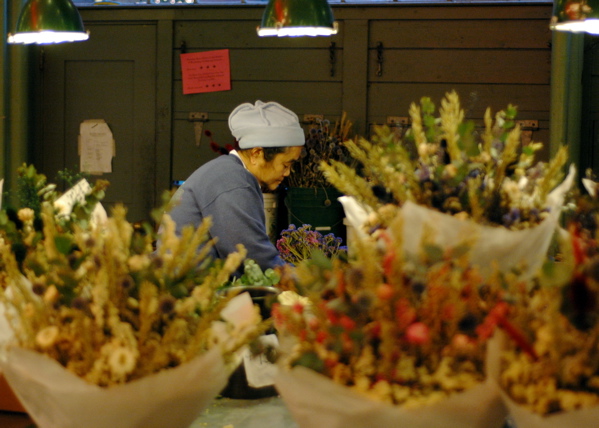
Pike Place Market, Seattle.
Photo taken: Dec. 20, 2005
Dec. 13, 2005

My nephew's egg scrambling technique is unstoppable.
Photo taken: Dec. 12, 2005
Dec. 8, 2005

Nine inches of snow: nature's kickstand.
My new fixed-gear performed admirably in her first winter test. She was as fast, stable and fun as I'd hoped she would be. Despite the conditions my commute took only a few minutes more than usual, and I didn't slide once.
Once again my co-workers are amazed to the point of mocking that I ride in this weather, and my stock replies -- "My only problem is that I get too hot!" "You know a way to get around that is quicker or warmer? Pray tell!" "The best part is passing the snowplows!" -- are filled with less cheer each time they are invoked.
One colleague in particular doesn't conceal what an idiot he thinks I am. That's fine. Many, many years from now I will be too old and feeble to ride my bicycle through the snow. He, on the other hand, will always be a dickhead.
Once upon a time, I have read, Chicago was a stormy, husky, brawling city of big shoulders. It was a city proud to be alive and coarse and strong and cunning. I'm not so sure anymore. Temperatures in the teens and snow barely to the curb now send people into a cowed, trembling tizzy of fur and cashmere.
Weather whiners. The people complaining about the cold now are the same ones who complained about the heat in June. Look, I want to tell them, it's Chicago. Shut the fuck up and deal. Want to spend 15 minutes on a freezing platform so you can ride the train with the flu-ridden sickies? Fine. Want to spend 15 minutes shoveling your car so you can sit an hour in weather-related gridlock? Fine. Me, I want to go as fast and be as warm and as healthy as possible, so I bike. Now leave me alone.
The winter cycling is no longer just about me showing off. It's about me shutting the fuck up and dealing. My way.
Photo taken: Dec. 8, 2005
Dec. 4, 2005

Illinois state cyclocross championships, Montrose Harbor.
Photo taken: Dec. 4, 2005
Nov. 29, 2005

I have no idea.
Photo taken: Nov. 26, 2005
Nov. 24, 2005

"You're wearing shorts today."
"It's not so bad in the sun."
And such is my winter strategy: Denial. It's like Bush's Iraq strategy or the baseball union's steroid strategy or an alcoholic's gin strategy: Deny enough times that a problem exists and it will cease to exist. (And it's just as effective.)
I once had a dormmate whose favorite movie was "Top Gun." Midway through each viewing, right before the scene [SPOILER ALERT] where Mother Goose dies, he'd clasp his hands, rock back and forth and say, "This time Goose won't die ... This time Goose won't die ..."
"This time winter won't come ... This time winter won't come ..."
Photo taken: Nov. 24, 2005
Nov. 13, 2005

Lincoln Square Lanes.
No black lights or lasers, no computerized scoring, and at the bar, no cosmos, just domestic bottles and a half-dozen barflies smoking and watching the Bears game.
Photo taken: Nov. 13, 2005
Nov. 11, 2005

When in February I noted my interest in fixed-gear bikes, I said I was unlikely to get one of my own because I would be a pretender, buying into a niche for the sake of being bad-ass and sexy.
But then I learned about how many roadies use fixies in the winter to improve form and maintain high cadence, and I was keen for a winter ride that would be more fun and faster than the beater mountain bike I've used in winters past.
With those practicalities in mind -- plus, I confess, aspirations for the bad-ass and the sexy; I need all the help I can get, and at 30 I'm beyond caring whether anyone thinks I'm a poser -- I headed to the local fixed specialist.
The shop's owner is a hero when it comes to promoting cycling and servicing fixies and track bikes, and he's generous with his time, knowledge and discounts. But a salesman he's not. In one respect this is refreshing, the indifference I sensed when I announced my intent to buy. Then there were delays in finding the frame I was interested in and getting it built up. In Judaism there is a tradition that when someone seeks to convert, a rabbi refuses them three times to test their commitment. Perhaps that's what was going on. Only on my fourth trip to the shop did I finally sense blessings to own this bike, and that it was OK to convert.
Her name is Marcella. She's a Surly Steamroller, but I'm not a components slut so I can't say much about the rest of her, other than, yes, Mom, there's a brake.
Riding fixed is like learning to ride all over again. I haven't fallen over yet, but I often forget that there is no freewheel and thus no coasting, and when I dismount my legs are bowed and wobbly. Once it becomes second-nature, the fun starts. That's the $900 wager, at any rate.
My bikes are named after whoever enabled their purchase. Charity was a gift. The Colonel was financed by selling my employer's stock. Marcella is named after my friend Marcel, who got me the moonlighting gig that paid for her.
This is different from my computers, for which my naming convention is to choose a virtuous woman from whatever book I'm reading ahead of the purchase. Going back to my college laptop, then, the computers I've known: Phoebe ("Catcher in the Rye"), The Rachel ("Moby Dick"), Madame Psychosis ("Infinite Jest"), Eliza ("Quicksilver") and Petra Cotes ("One Hundred Years of Solitude").
It's true: I may not objectify females, but I feminize my objects.
Photo taken: Nov. 11, 2005
Nov. 1, 2005

Levi has all the ingredients for a pleasant fall day: Patch of sun ... check. Fruit jar of Strongbow ...check. Fighter pilot/reading cap ... check.
Commence laziness.
(I think he's reading a book about polar exploration. He'd already read the Libby indictment a dozen times -- a half-dozen of them out loud -- and was now waiting for the Rove and Cheney sequel: "Lying, Cheating Motherfuckers II: The Reckoning.")
Photo taken: Oct. 30, 2005
Oct. 27, 2005

At the Jackson Park cyclocross race. These two Killjoy guys owned the single-speed race, during which I got a chuckle out of the roadie spectator who heckled: "Derailleurs! On sale at Performance!"
Photo taken: Oct. 23, 2005
Oct. 25, 2005

Saturday I woke on five hours sleep and rode 20 miles down the lakefront to Jackson Park, where my team was hosting a cyclocross race. I'd volunteered to help set up and marshal the course. For the life of me, however, I couldn't find the damn thing. Jackson Park is big, but all I could find were soccer games and fishermen.
After a frustrating hour I finally saw two guys on cyclocross bikes. Are you here for the race? I asked.
"You mean tomorrow's race?"
So Sunday I woke on five hours sleep and rode 20 miles down the lakefront to Jackson park.
I'd never seen cyclocross, a discipline that combines elements of road racing with elements of mountain biking, but it looked like fun. I liked how the slower speed minimized the effects of drafting. There were no weasels here, and all the huffing and puffing suggested that the riders were working much harder than your typical pretty-boy roadie.
When I compared cycling to poker, I speculated on how one could dress and behave like a Fred in order to be underestimated by one's opponents. I wonder whether that's what this guy had in mind with his hairy legs, gym shorts and vintage basketball jersey. (To understand how this was received, imagine someone showing up at a pick-up basketball game in bicycle shorts and jersey.) If there were any race to attempt such a stunt, cyclocross would be it, since there doesn't appear to be any advantage to form-fitting Lycra. I didn't pay that close attention to his single-speed race, but he seemed to know what he was doing, at least more than what one would guess from his get-up.
Photo taken: Oct. 23, 2005
Oct. 20, 2005

At Stan Hywet Hall, Akron, Ohio.
Photo taken: Oct. 15, 2005
Oct. 16, 2005

Photo taken: Oct. 15, 2005
Oct. 14, 2005

Miami.
Photo taken: Feb. 5, 2005
Oct. 10, 2005

It was strange last week, as the air turned crisp and an influx of skinny tourists hit downtown, to know that I would not be running the Chicago Marathon come Sunday. It would be the first I haven't run in 5 years.
I'd hoped to watch, maybe even volunteer, but then came the Fall Fling, the last bicycle races of the year. Saturday would be Stage 3, a road race. Sunday would be the fourth and final stage, another criterium. I'd miss the marathon completely.
I miss some things about running, but not the final week of taper. I recall getting irritable and anxious. There's plenty of nervous energy ahead of a bike race, but it's a subdued, happy nervousness. It's the nervous energy of a blind date, not that of one's own wedding. If one doesn't meet his goals in a bike race, no matter. There will be another one soon enough. A marathoner, on the other hand, invests 18 weeks of training in a single event. Cyclists must train harder and longer, but if we have a bad morning, 18 weeks don't go down the drain.
Saturday's road race comprised three 8-mile loops south of Rockford. I'd been warned of "rollers plus one big hill," but I never did figure out which hill was supposed to be the "big" one. They were all small, barely enough for the small chainring, especially compared to the Wisconsin nutcrackers I cut my teeth on earlier this season.
I started the morning tied with a teammate for third in the overall standings. Walking from the port-o-potty before the race, I passed the host team huddled in a strategy session. "We know xXx has a couple of strong riders," one said, "but we don't know if they're here today." I smiled knowingly.
At the start line a guy in a triathlon-club jersey started moaning loudly and seemingly endlessly about all the teams present. "I thought this was a citizens race! What are teams doing here!?" Minutes earlier I'd been giving this guy advice on his first race, including the correct way to pin his number, which he'd pinned sidways, and this abuse was my reward? (Naturally his name was Fred.)
For my teammate and myself, our decisive moments would come with 3 miles to go. The citizens field was mostly intact and had just passed the 50+ field on Turn 3. The masters were nonchalant about moving to the right so we could get by. As a result, two small breakaways formed as our field spurted through the bottleneck.
My teammate bet that he could keep up with the first group. I put my chips with the second group. We both lost, although in different fashions. Afterward we had our regrets -- 48 hours later the TiVo of my mind is still replaying the endgame -- but deep down we both conceded that we had no choice but to go when and with whom we did. We merely proved that it's possible to play your cards right and still come up short.
My teammate was the first to lose position, turning the lead group of five into a group of four. Driving to the race we had decided that we should speak Italian lest any other riders hear our super-secret scheming, so as my chase group of four approached him I yelled, "Va bene!" Go well! It did no good: He wasn't able to hop on.
The 15-year-old overall race leader was in my break. He took good pulls but he and another rider fell off, leaving me alone with none other than the vociferous Fred from the start line. I exhorted him to trade short pulls with me, but although he rode fast, he pulled much longer than he should have. I knew if he popped I'd have little chance on my own. I had to waste energy and jump past him in order to take the load off. "They're gaining!" I said, looking back and seeing the main pack a few hundred meters back. He didn't seem to think it was possible. (Did Chris Horner's fate at Stage 13 of the Tour de France teach him nothing?)
Sure enough, the pack overcame us with 50 meters to go. I salvaged 13th place, my teammate 17th. The results sent my overall standing from 3rd to a precarious fourth.
Sure, we could have sat in and maybe finished better, but I have an entire off-season to be passive and boring (and don't doubt that I'll take advantage of it).
With seven laps to go in Sunday's criterium, the series' third-place rider, a guy in a full Phonak kit, took off on a flyer. (I remember this guy from my first race in April. He's been sandbagging in the 5/citizens class for years.) His result wasn't liable to shake up the overall standings, so the field let him go.
A lap later, an unattached rider couldn't hold his line on Turn 2 and clipped the front wheel of a rider in a Navigators jersey. Navigators was a point behind me in the standings but a bike ahead of me on the road, so when he went down, I followed. Fortunately we were going only around 22 mph, barely fast enough to do harm. As quickly as I went down I bounced back up. I assessed damages -- 1. Bike: check. 2. Team kit: check. 3. Body: bruised but still useful. -- and waited to reunite with the pack when it swung by next.
Phonak's lead grew to 30 seconds over the next six laps. A few people tried to jump off the front. I pursued each one, but none developed into a break. That's the tough thing about the citizens class: Most people sit in, but then when they do attack they don't know how to organize so that it has a chance of sticking. (Not that I'm any great shakes at breaking away myself.)
On the final backstretch I was on my teammate's wheel and getting ready to jump with him. Meanwhile, an acquaintance from another team shot up the right and called for us to let him lead us out. Unfortunately I'd spent too much time in the wind keeping tabs on the so-called attacks and this time I didn't have enough gas to find his wheel. It's a shame I didn't, because he held on to beat Phonak by a few lengths.
I finished 10th, my teammate 11th. Miraculously, that put me in a three-way tie for third overall, fourth after various tiebreakers were employed. Three fewer seconds in the time trial or one more position in any other race and I would have had third outright. (For my birthday, generous friends chipped in to fund a set of aerobars, so next year those 3 seconds should disappear.) Nonetheless, each of these was a better finish than I ever expected to reach this season.
And now my season is over. I met all my goals, and next year I will upgrade to the next category and start the process all over again. It's already a daunting prospect.
Now, though, I'm feeling the same void that I always felt after a marathon. What now? What do I do with myself when I'm not obliged to ride 50 miles every day? On the one hand, this will be an opportunity to restore balance to my life. Cook more, sleep more, see my friends more. On the other hand, there's an elegant simplicity in a daily to-do list with only three things: Ride. Eat. Go to work. I'll miss that.
Photo taken: Oct. 9, 2005
Oct. 7, 2005

I'd thought about making a list of 30 things I know at 30 that I wish I had known at 20. 3. Time is too valuable to ever be "killed" ... 5. Always check for toilet paper, or always carry small bills ... 8. Don't assume everyone else is any less baffled than you are ...
But then I got to 11 or 12 and realized: Here I am, 30, almost an adult, and after all my travels and adventures, after all my education and work, after all the hearts I've broken and all the hearts I've had broke, all I'm really, really certain of is this: 1. When I was 20 I thought I knew everything, and I still don't know shit.
Photo taken: Oct. 6, 2005
Oct. 5, 2005

County Line Orchard, Hobart, Ind.
Photo taken: Oct. 2, 2005
Sept. 24, 2005

Luxury seating is one of the more regrettable developments in baseball, more regrettable than the designated hitter, more than steroids, more than Bud Selig, more than the Yankees.
More regrettable than a juiced Bud Selig playing DH. For the Yankees.
I find skyboxes anti-democratic and contrary to the game's working-class origins. By pushing upper decks even further into the clouds, they degrade millions more fan experiences than they enrich. They are like the modern city's parking garage, which provides convenience to some but is an eyesore to all.
That said, who am I to refuse an employer who offers a free seat in the company box?
The best part of the skybox? It's not bypassing the lines and bag searches at the front gate. It's not the dessert cart or beer fridge. It's not even the dry, warm shelter during the hourlong rain delay.
The best part of sitting in a skybox is looking down on all the little people, huddled and massive, and thinking: "Hello, little people! Don't you wish you had cake?"
And then thinking: So this is what life would be like as a Republican. I had always wondered.
Photo taken: Sept. 24, 2005
Sept. 20, 2005
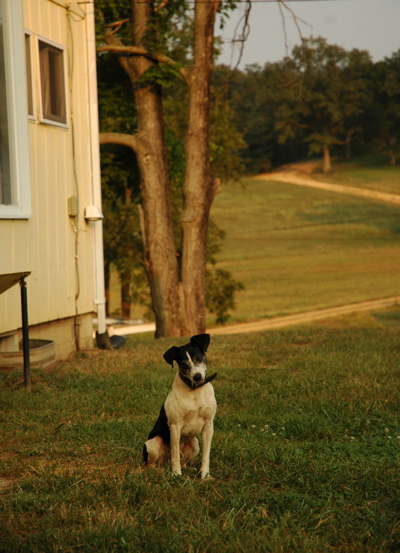
Stumper.
Photo taken: Sept. 10, 2005
Sept. 14, 2005

Sherman Park Criterium.
Photo taken: Sept. 3, 2005
Sept. 12, 2005

The light above Last Chance Ranch, Blackwell, Mo.
Photo taken: Sept. 10, 2005
Sept. 7, 2005

When I compared poker to cycling last week, I mentioned that luck has a role. In Saturday's criterium at Sherman Park I got a first-hand lesson.
My Cat 5 race was the first of the day. I was executing my plan, trying to keep the race safe from the feckless weenies who just sit-in until the final sprint. I got off a few flyers, usually on the heels of a prime, but unfortunately I couldn't get any takers, and I couldn't create a gap big enough to sustain on my own.
With four laps to go I was considering one last jump when I found myself tight on a teammate's wheel heading up the inside. Suddenly I went in and out of a giant pothole. I swore loudly and a few seconds later heard the dreaded hiss of a pinched tube. My race was done. Walking back to the start area I passed a second teammate who had flatted in the same hole.
I would be damned, however, if this was going to be how my UCSF season would end (there are still a few ABR races in October) so on a whim I ante'd up for the 30+ race. I'd never done a masters race. All I knew is that they were F-A-S-T fast, full of riders who've been racing for decades and the occasional national champion. I briefly worried that I could even be a safety hazard among such seasoned riders, but what the heck. I tossed caution to the 10 mph breeze out of the east.
It turned out to be a small field, only 12, and although the pace was indeed high I was feeling comfortable keeping up.
There was a prime lap about 20 minutes in and I found myself at the front of the line. I wanted to get out of the wind but I couldn't get anyone to pull through. Halfway through the lap I slowed dramatically to see if someone would pass, and pass me they did: All 11 of them in a sudden surge, and just like that I was dropped.
So there I was, dropped in yet another race, and feeling pretty sorry for myself. All that work all summer and this is how I fare. Maybe this just isn't for me. Maybe I need to go back to running, which I now find fantastically boring, but at least a guy can suck in relative anonymity.
I was at my nadir, then, when I saw a friendly uniform just up the road. I bore down to his wheel and we quickly scooped up two other riders who'd been dropped. When a prime was announced for the four of us, I jumped without much thought and didn't look back. And by "didn't look back" I mean to say, "I looked back every 10 seconds to see how my gap was holding." Miraculously, it was growing.
And I have my teammate to thank for growth. He was blocking on my behalf, meaning that when he saw me jump he slowed right behind me, creating an obstacle for the other two riders. Granted, he'd later tell me that the other two were in a generous mood and didn't put up much fight, but escaping them gave me the boost of confidence I needed.
I hammered down and caught the next racer, a UofC rider in yellow. I rode with him a lap or two before I was able to ride him off my wheel. I pushed on and quietly passed the next racer before he even noticed I was coming. I caught up to one more rider but couldn't sneak past, and he beat me on the sprint. Still, I felt good about coming in 7th. It my not have come the way I'd expected it, but I had the top 10 finish I was shooting for.
And that's the subtle teamwork that makes cycling such an elegant sport. My mate's block turned my second DNF of the day into a 9th place and then into a 7th. I owe him one and look forward to when he can cash in.
Photo taken by Sandy Weisz: Sept. 3, 2005
Sept. 4, 2005

Of all the races I watched or participated in during Saturday's Sherman Park Criterium -- full race report TK -- the most enjoyable were the children's races. They certainly had the most pathos and drama, even more than the Cat 1/2/3 race in which two rivals spent many of their 30 laps loudly squabbling and swearing at each other.
The contestants were mostly neighborhood kids on an array of BMX bikes, mountain bikes and beaters. In the one-lap race for boys ages 13-15, the riders took off like madmen with the enthusiasm and panache I like to see at the start of a race, but around Turn 1 they realized that a mile was much, much longer than they had imagined. Ten minutes later they dragged themselves across the finish line, thirsty and weary. Many headed straight for the water trough to dunk their heads. The rider above splayed himself across the sidewalk, too exhausted to move another inch.
Photo taken: Sept. 3, 2005
Sept. 2, 2005

What's amazing is that the bride and groom were registered for it.
Photo taken: Aug. 27, 2005
Aug. 31, 2005

I know a rider who teaches for Chicago Public Schools. Cycling is expensive. Since a teacher isn't likely to afford a top-of-the-line bike unless a student steals it for him, he supplements his income by gambling. Any money he wins he plows into his cycling. He's a good rider and an even better poker player, so he's ended up with very nice components.
It's a natural combination, cycling and poker. I just read "Big Deal," Anthony Holden's smart account of a year on the poker circuit -- back in 1988, before it was cool -- and I was struck at how much they have in common. (Granted, I'm obsessed with cycling, if you haven't noticed, so I see everything through its lens, much as how for a person going through a break-up, every love song is about them.)
But I think I might be on to something. Here, then, is why a bike race is like a night at the no-limit Texas hold 'em table. Or, How I learned to stop worrying and love the dudes with the carbon frames.
The deal
A rider's fitness constitutes his hand, and for as long as a rider lasts in a race he is claiming his to be the strongest. That's what a poker player is doing, too. When a cyclist is dropped or a poker player folds, they are saying: "Just kidding. I didn't really have anything."
Some cards -- the length of his legs, the size of his lungs -- were dealt by God; other cards -- his aerobic capacity, his fat-to-muscle ratio -- he dealt himself. Cycling is stud, not draw, so once the race starts there's nothing he can do to improve his hand. All turns on how well he plays it.
Obviously some hands are stronger than others; some riders are blessed with better bodies than others. But the weaker hand often wins in poker. So, too, in cycling, especially in criteriums. The physically weaker rider can win if he sucks the right wheels, makes the right moves and has the right luck.
The key is misrepresenting your hand. People associate poker with the bluff, but bluffing -- tricking your opponents into overestimating your hand -- is risky and rare. More effective is to trick your opponent into underestimating your hand. Make him think you have two pair when you really have trips, a straight when you have a flush. Only after you've done that a hundred times can you trick him into thinking you have a boat when you really have rags.
Anthony Holden tells of the time he arrived at a table of strangers and played the part of tourist. He asks basic questions of the rules ("Do you have to use both concealed cards?"), bungles an attempt at riffling his chips and even intentionally loses a few cheap hands. Once he'd conned them, he attacks and fleeces them blind.
The same gamesmanship happens in cycling. Most guys try to overrepresent: They talk tough, they ride expensive gear, they sport terrifying tattoos. The thinking is that if the field thinks you're an inconquerable bad-ass, it won't bother trying to conquer, and your breakaway can break on its merry way. But it never works. Nobody cares about your carbon-fiber jock.
Far better is to underrepresent your hand. This is what Lance was doing every time he preceded a Tour de France by moaning about illnesses and poor training and how impossible it was going to be to beat such a strong field. Getting caught eating a donut with Sheryl Crow early in 2004 was perhaps his career's most brilliant tactical move. Everyone then assumed he'd show up in July as a fatty with powdered sugar on his lips -- and he proceeded to win one of his easiest Tours.
So how do you get your cycling opponents to underestimate you? Pin your number sideways. Complain about broken shifters. Apologize in advance for your chronic flatulence. Remove a price tag from your bike at the start line. Grow your leg hair. Wear an ugly Primal jersey instead of your team kit. Lean into your chain and get a nice Cat 5 tattoo. Anything to ensure that when you make your move, the reaction of the field will be: "Don't worry about chasing him. He'll pop soon enough. Plus, he farts."
The play
What are the traits of a successful poker player?
Patience.
Intelligence.
Guile.
Endurance.
Aggression.
Panache.
Ruthlessness.
These also happen to be the traits of a successful cyclist, and few riders wouldn't sell their own mother to get more of the same.
Both endeavors demand perfect resource management. In poker, chips are your resources. In cycling, it's energy. The goals are the same: Maximize how much you start with, minimize how much you lose as you go.
This leads to risk management. Is any given risk worth the possible reward? Is a bet worth the pot? Is it worth one's energy to bridge to a breakaway? And when's the right time to make the big bet? Before the flop? Fourth street? The river? Same in cycling. When do you attack? At the bottom of a hill? At the top? On the first lap? At the final sprint?
Minimizing risks and maximizing resources come into play with all of each sport's various moves and plays, many of which are fairly analogous:
Poker: Limping in, or betting the minimum in order to see the flop.
Cycling: Sucking wheel, or hiding in the pack and waiting for opportunities.
Poker: Raising. Best done when weakness is sensed.
Cycling: Attacking. Best done when weakness is sensed.
Poker: Calling, matching someone's raise.
Cycling: Covering an attack or bridging, leaving the pack to join a breakaway down the road.
Poker: Coming over the top, or significantly re-raising a raise. This is an excellent way to hear an opponent's bowels gurgle.
Cycling: Counterattacking, or launching a second attack right when the peloton catches a previous one. Same thing with the bowels.
Poker: Folding. You can't win. You know it. Your opponents know it. You depart with a whimper.
Cycling: Getting dropped, fading from the peloton with no hope of reunion.
Poker: Going all-in, putting all your chips on the table.
Cycling: Hammering, putting all conceivable energy and will into a move.
Poker: Busted. You've gone all-in and lost. Now you're going home.
Cycling: Popped. You've put the hammer down but you just didn't have enough. You don't just fade away. Your legs are crippled from fatigue and lactic burn. And now you're going home.
And of course the stakes in both are no-limit. If you want to lose your house and your kid's college fund, you can. If you want to attempt a hairpin turn at 60 mph, you can.
The finish
And here's the most crucial element. Victory in both hinges on a decisive moment. "I have the two best pair," Holden writes of one such moment. "This is Armaggedon. Do or die."
Sometimes this moment occurs early, sometimes in the last 100 meters or after hours and hours of play. You cannot foresee this moment or plan for it, but the thousands of miles training and hundreds of hours studying "Super/System" have led to it and will determine whether you handle it correctly.
In poker, it's called going all-in. You either double your chips or you go home broke. In cycling, it's called putting the hammer down. From out of nowhere you attack with everything you have, along the way finding things you didn't know you have, knowing that if it succeeds, you've won. If it fails, you will be too knackered to salvage anything from the race. That's the pot, that's the bet. Once you've decided, you don't look back. You just go. You're all-in, baby.
My exterior, I think, looked appropriately cool and collected; inside, I'd been a quivering blancmange of self-doubt right from the starter's pistol. All year I had prided myself on my temperament, nerve, self-discipline, even "heart," all of which had steadied with experience. But did I, in the end, possess the indefatigable, indefinable insight which distinguishes poker's great champions? Had my sheer enjoyment of playing blinded me to the finer points of mind- and card-reading, odds and outs? Or was it just that I didn't have "the right stuff"?
Anthony Holden, "Big Deal"
I'm racing Saturday. Aside from a minor series in October, this will be the last race of the year. Just when I finally feel like I almost know what I'm doing, the season is already over.
For the first time I think I have a good shot at success. I'm in good shape, my bike is in good shape and it's not a very technical course. Plus, it's Cat 5 only, which increases the chance of crashing but should be an easier field.
Funny how my objectives have matured in just four months. In my first race back in April, my goals were simple: Don't crash, don't die. Now I'm more ambitious. I want to either finish in the top 10 or contribute to a teammate finishing in the top three. I'll want to stay away from squirrelly riders during the race and a bunch sprint at the end, so the plan is to attack often, hopefully breaking away early and staying away.
And then it will be time to start planning the winter training regimen, so that I can start next season with the nuts in hand.
Photo taken: Aug. 28, 2005
Aug. 29, 2005

At the Portland World Trade Center, where two college friends had just gotten married.
Photo taken: Aug. 27, 2005
Aug. 25, 2005

Early arrival at the Matteson practice races.
Photo taken: Aug. 16, 2005
Aug. 23, 2005
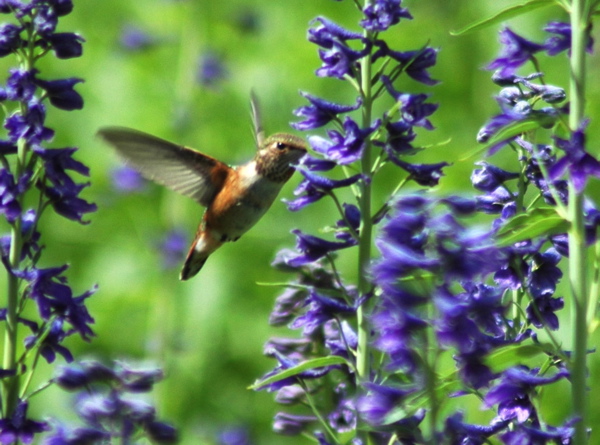
In the Dana Hanging Gardens, Yosemite National Park.
Photo taken: Aug. 5, 2005
Aug. 21, 2005
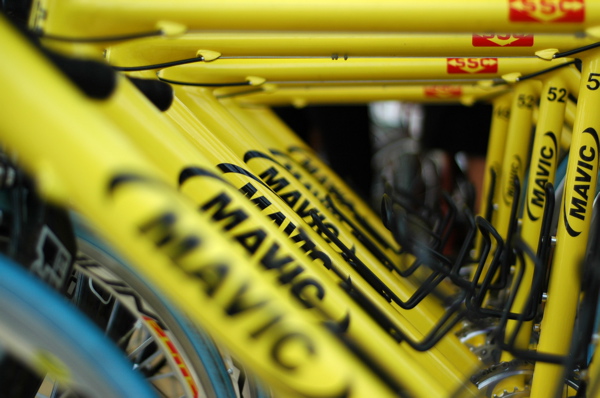
Spare wheel and bike pit at the Downers Grove Criterium.
Photo taken: Aug. 20, 2005
Aug. 18, 2005
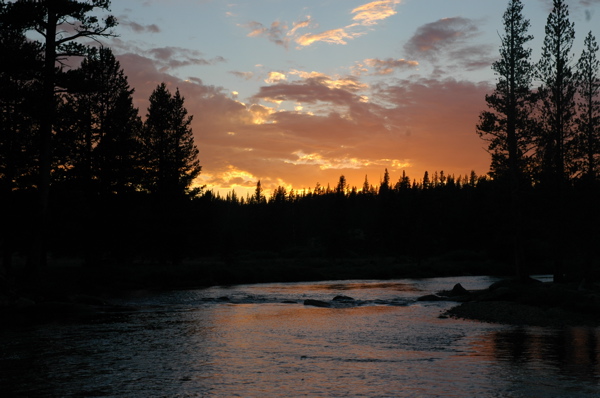
The Tuolumne River near Lembert Dome, Yosemite National Park.
Photo taken: Aug. 5, 2005
Aug. 15, 2005

I didn't finish last. I didn't crash. I didn't die.
I didn't start.
My bike felt loagy toward the end of my warm-up before yesterday's criterium in Winfield, but I chalked it up to fatigue or nerves.
And nervous I was. In the front row of the starting line, standing ahead of more than a hundred riders, the largest field I've ever been in, I had, as George Lucas would put it, a bad feeling about this. I was almost looking for a reason not to compete, and when I felt my front tire, a reason was found: It was flat, probably the victim of a slow leak caused by glass on the ride down to Logan Square in the morning. There was no time to fix the tube, and I had no spare wheels in the pit. I pulled out, changed clothes and started taking pictures.
It sure would have been nice to have had a spare set of wheels.
For weeks I've been debating whether I could afford to upgrade my wheelset. I spent a lot of time in Yosemite thinking about this. Over one shoulder a toga-clad angel squawked something about saving for retirement. Over my other shoulder, a bearded devil in Lycra danced from foot to foot and made promises about visits to the podium. I can fund my IRA later, his airtight logic went, but the only time I could only win races was now.
I resisted temptation. I even went to the bike shop last weekend expecting to buy wheels, but when 20 minutes passed and no salesman had come to help -- because of a coupon I had gone to a place other than my regular local bike shop; never again -- I took it as a sign. (I bought new shoes instead.)
When there is something I want to do but know I shouldn't, I'm big on signs. On destiny. On deflecting responsibility. In the vending machines at work there is a candy bar I like to indulge in that costs $1.10. When the sweet tooth strikes I will say to myself, "If there is a dime in this drawer, it is my destiny to buy a candy bar." I make massages contingent on whether I win at the poker table. If there is gelato across the street, I will say, "If that light turns green within three seconds, it is a sign that a higher power wants me to have some gelato."
Sometimes that three seconds turns into 20 seconds, sometimes into 20 minutes. In any case, there apparently is a higher power that wants me to eat a lot of candy bars and gelato, and who am I to argue? (It's a bit like the joke of the preacher who throws all the offering money into the air. Whatever God takes, God gets. Whatever falls to the earth, the preacher gets.)
So yesterday morning I prepared myself for the possibility of a sign, a revelation, a Post-it note from God: "Buy those wheels. --G."
I wondered what the sign would be. Doves of peace? A hundred-dollar bill in the gutter? A crash? Suddenly there I was, walking my flat tire down the sidewalk because I had no spare, and my destiny was clear. Whether I could afford it or not, I would buy those wheels.
I'm just glad I didn't have to make the decision on my own.
Photo taken: Aug. 14, 2005
Aug. 13, 2005

While we waited for "The Night of the Hunter," orange-jacketed security shooed several dozen Canada geese that had been calling Grant Park home, often from one patch of trees to another and then back. It was like a giant game of keep-away.
The geese flew in large, panicked flocks, an activity that to those of us on the grass was more disconcerting than had they remained standing quietly under the trees.
"Whatever you do," someone nearby said, "don't look up!"
"At least not with your mouth open," I thought to add.
Photo taken: Aug. 9, 2005
Aug. 12, 2005
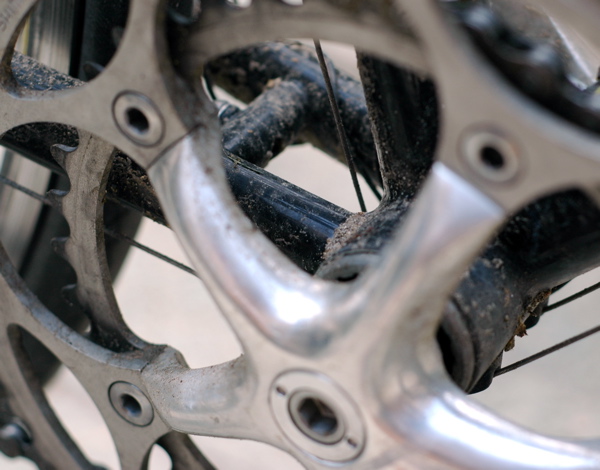
My cycling team has a monthly 10-mile time trial that we use to gauge our progress over the season. A practice of truth, if you will. The final one was this week. I hadn't done well at the last one so I really wanted to shine this time.
I had several advantages going in:
A new, more efficient pedal system.
A rested, conditioned body.
A week spent in the oxygen tents of Yosemite.
But then it looked like I'd be foiled by weather. It stormed Tuesday night and was forecast to storm again Wednesday morning. When I woke up, however, the rain had stopped, so I caffeinated, ate a banana and headed to our start/finish point at Soldier Field.
I forgot that one should never ride down the lakefront after it's rained, as the water and sand conspire to gunk up a bike's every last moving part (see above). But I looked on the bright side: A wet road meant less surface friction to slow me down. Questionable traction discouraged unnecessary braking. And an ominous western sky encouraged haste.
There's not much of a narrative that can be told from a time trial. You pedal hard, you pedal hard some more, and then when you can't pedal hard any more you puke and then pedal even harder.
Right before the finish line I passed my minute woman and came close to passing my two-minute man, the teammates who had started, respectively, one and two minutes before me. My time? I'd nailed it: 25:16, more than two minutes faster than at the start of the summer and a minute faster than my best time. Of all the teammates who have ridden the course this summer, the only ones to have done better are either Cat 3 or soon to be.
Perhaps the time trial is my ideal event, after having little success with the road races or crits. Or maybe it's just the practice time trial, like the quarterback who can hit a tire from 60 yards but can't complete a screen pass during a game. I race again Sunday, so I'll soon see whether this translates into real results. In my only other 4/5 criterium back in May I got dropped hard and early. This time I'd like to keep up for at least the first lap.
Photo taken: Aug. 10, 2005
Aug. 11, 2005
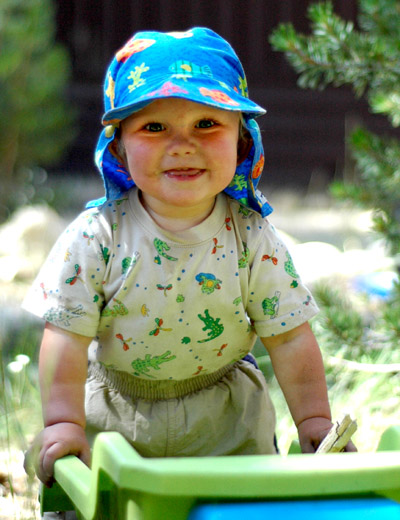
It usually takes about 14 months for me to make a good impression. Right on schedule, then, a great stride was made last week with my nephew, 14 months after I first met him: At the beginning of the trip he would cry as soon as I entered the room. By the end of the trip he'd cry when I left it. (It helped that I would sometimes leave the room carrying his favorite toys. It's a dirty trick to make an uncle feel wanted, but I love him so; all is fair and all that.)
On the trip's last night I stood around the campfire after my brother's ranger talk. He was chatting with visitors and mentioned he was from Wisconsin. Two young women next to me started tittering.
Do you think it's him? He said he's from Wisconsin. It's gotta be. Let's ask him. Yeah, ask him. No, you ask him. No, you ask him.
Hank looked their way and they were silent for a beat, then burst together: "Are you Malcolm's dad!?! He's the GREATEST!"
They'd apparently waited for a shuttle bus with Malcolm and his mother and become big fans.
They were sort of cute, too, but I resisted the urge to point out that I was Malcolm's uncle and, unlike his father, single. Still, it reminded of what great company Malcolm could be around Chicago. Prop him up on the bar and so long as he keeps his fingers out of my Schlitz I'm set.
It wouldn't even have to stop once he's too big to carry. I'm imagining a scene in 20 years when I am 50 and he is 21 and he visits his doddering, still-single uncle in the city. We'll ride our hoverbikes through the park. "This is my nephew," I'll say to the fawning women, "with whom I have common DNA. He pooped today!"
Or maybe I'll just buy a puppy.
Photo taken: Aug. 4, 2005
Aug. 8, 2005

Like the businessman who submits to the cat-of-nine, I am fond of controlled danger, of ordeals with just enough risk to make me hate myself for having entered them willingly but with enough reward to want to do it all again. Comfort, like air conditioning and coffee cream, is for other people.
It's been more than a decade since my last rigorous camping trip and I don't think I've ever done time in the backcountry alone, but for about a year I've been considering a solo trip through Yosemite wilderness. Finally last week I visited my brother and his family -- they spend their summers as rangers in Yosemite's Tuolumne Meadows -- and with borrowed gear embarked on a three-night trek.
The first 48 hours were perfect. I hiked down, through and up the Grand Canyon of the Tuolumne River. Although I saw none of the bear or rattlesnakes I was promised warned about, I didn't see many people, either. I didn't hear a single car horn or check a single RSS feed.
I'd budgeted the entire last day to make the 8-mile, 3,000-foot climb from Pate Valley to Harden Lake, close to the spot where my family would pick me up the next afternoon. The ascent, however, wasn't nearly as difficult as it looked from the canyon's depths and I was at Harden by 1 p.m. Even though my food was down to a half-pound of trail mix and three Landjager sausages, I decided to add an extra 5-mile spur to my trip with a hike to Smith Meadow.
And that's when everything went to hell.
Unknown to me, a large fire had within the past five years swept through the area west of Harden Lake. Large, sooty logs blocked the trail at dozens of points and it was often hard to find my way again on the other side. Switchbacks never switched back. Elsewhere, lush new growth or swampland swallowed the path, such as in the eye-high flowerbed above. (Do you see a trail there?)
The sun played its share of tricks. Shafts of light resembled well-worn paths until the shadows shifted and I found I'd been lured into a dark dead end with no way out and, against belief, no longer a visible way in.
Losing a trail is like climbing a rope and having the rope abruptly turn to air. The last mile, a long descent into the meadow, was the worst. Even when I knew I was on the trail -- which was rare -- I had to clomp violently through the thicket. Thorns and branches scratched and bloodied my beautiful and sultry cyclist legs.
All I could do that last mile was trace the countour lines down to where Smith Meadow was supposed to be and hope for the best. To avoid the brush I balanced across felled logs arrayed like so many pick-up sticks. Every few minutes I whistled for help. None answered. This bombed-out forest held me alone.
It's funny the things you do when you are lost. (I use the word liberally here. I wasn't really lost. I knew exactly where I was. It was the trail that couldn't keep its bearings worth a damn.) Sometimes I headed opposite my intended direction because the ground that way was more navigable, like searching in the kitchen for an item dropped in the pantry because the light there is better.
I took inventory of who was to blame for this mess. Damn the rangers for not posting a sign at the trailhead: "Caveat urbus: Cityfolk beware." Damn the park system for not adhering to the Chicago grid with a cross street every eighth of a mile. And damn that deer bounding from the brush for making this look so easy.
Then I remembered that this is wilderness, and this crisis was why I was there. Wilderness is a state of mind as much as a location. It is a place without roads but, more important, a place without emergency exits. If it weren't for the possibility of getting lost or falling off a cliff or getting mauled by a bear, this would be just a park, and there would be a security guard on a Segway telling me not to loiter and to be gone by sundown.
Finally I was there in my meadow, a small, uninteresting patch of dry grass that rightly earned the small, uninteresting name of "Smith." An hour later a second hiker came through. He was more seasoned than me -- he wore hiking boots, for example, not running shoes -- and he confirmed that that was the worst trail he'd ever been on.
Through it all I never felt I was in real risk. There was plenty of light left. Weather wasn't threatening. The only danger was if a fall immobilized me or if I stumbled upon a napping bear who enjoys being woken up as much as I do.
The remarkable thing is that after two days with no new insights or revelations, it was during this hour of despair that my thoughts congealed the most. I was reaching for my notebook every few hundred yards. I mentally composed postcards to friends. When I reached camp I transcribed them so that if the next day took a turn for the worse, my friends would know that in my final hours I was thinking of clever things to tell them.
The next day did not take a turn for the worse. I still could only approximate the trail, but I was more patient. After four hours the trail became a road and I knew the trip was almost over. I heard the clip-clip-clip of sprinklers. I saw hikers unburdened by overnight packs.
I passed a father with two skipping children. I'd been out of water for an hour. "How much farther to a cold beer?" I asked.
"You're about four minutes away," he said.
Five minutes later I had the week's first and only moment of panic. I couldn't find my wallet. It wasn't in the compartment I'd put it in. It was in none of my pockets. Then I remembered I'd put it in the bear can. Of course. To keep it safe from ursine pickpockets.
The store at the trailhead had no beer, so I settled for a Powerade, a Häagen-Dazs bar and a half-bag of Doritos a motorcyclist in leather traded me for my story.
I had all the limbs and most of the blood I had started with. The Dead played on the store's radio as I sat at a shaded picnic table. Suddenly the adventures of the previous 24 hours seemed small and barely worth mentioning. I was lost, I became unlost, ho-hum.
I blame the ice cream. What honest man can claim hardship or trouble between licks of a Häagen-Dazs?
Photo taken: Aug. 3, 2005
July 30, 2005

What a great Chicago day.
It began with BBQ on the South Side. In the evening, Critical Mass wended through the North Side and wound up at Foster Beach, where the water was warm and the waves were high. Dozens of riders dove in in street clothes, a few in nothing at all. It had been awhile since my last spontaneous night swim. I'd forgotten how fun they are.
Afterward, my friends and I convened at Levi and Stacey's. A man tried to sell us a rubber shark on the way. We declined. We changed into dry clothes and discussed everything from Santorum to santorum over martinis and potstickers.
(Levi has made the martini, forged in a penguin-shaped shaker and served in a proper martini glass with a half-dozen olives, a part of his evening routine. I have yet to acquire the taste for martinis, but I can fathom why one would endure the agony of doing so. What I like is how it mandates patience and lingering. You take a sip, and only after you have forgetten its foulness do you take another sip. An hour later, when you look down into an empty glass, you experience relief and accomplishment. "Well, that's done with, and I am a stronger man for it." (It is also possible that I misunderstand the point of a martini.))
In a few hours I leave for a week in Yosemite, where I'll see my 14-month-old nephew. I imagine that 14 months is an impressionable age, sensory wise, so I'm tempted not to shower. This way can I arrive stinking of BBQ, gin and Lake Michigan and it will lock an association in little Malcolm's mind. The hope is that the next time he ever smells one of the three again -- whether in 10, 20 or 60 years -- he will think fondly of his uncle, and he will follow his nose to the good life.
Photo taken: July 29, 2005
July 29, 2005

At Comiskey a few weeks ago someone mentioned that 35th was the farthest south they'd ever been. "So where do you go for your ribs?" I asked.
In the conversation that ensued it came out that although she worked in Hyde Park, Stacey had never had proper South Side ribs. Today we filled that void in her life. I picked up some ribs, tips and links from Barbara-Ann's and met her, Levi and Sandy on the Midway. She brought Diet Cokes and a large roll of paper towels, and God smiled upon our plans by delivering perfect weather.
A month ago I found one serving to be too much for one person, but two servings today turned out to be the perfect amount for three people and a vegetarian, Levi, who dove into the fries and bread.
Photo taken: July 29, 2005
July 18, 2005

Saturday I joined Cameron (pictured) and Cynthia for the Ride Across Indiana, the RAIN Ride. This photo was taken in Richmond, Ind., 161.3 miles and seven and a half riding hours after leaving Terre Haute.
Last year's RAIN ride marked the first time I'd ever ridden in a group. Even though I didn't know what I was doing or how to work with others, it was transforming. The next morning I watched the Tour with Mikal in Indianapolis, and it was then that I started to put two and two together: Cycling + racing = what I need to be doing with my life. And so it has been. Rare are the moments where one's life shifts this decisively.
I intended to ride this year's RAIN at a moderate pace and stick with Cynthia, a good friend who has done more to advance my cycling than any other person, but, to borrow Robert Pirsig's language, ego got the best of Quality. A recreational ride turned into a personal race. More than anything I wanted to beat last year's gross time of 9:30, just to prove to myself how far I've come. I latched onto fast riders when I could, and I pushed the tempo when it was my turn to pull. As a result, I came in at 9:20, despite hours of rain that washed every last drop of lube from my chain.
Also as a result, I missed out on the social aspect of the ride that helped make last year such a life-changing experience, and I lost contact with Cynthia about 50 miles from the finish.
And then I got home and realized last year's time was in fact 10:30, not 9:30. I'd beaten it by more than an hour.
Another good intention gone awry: Today was supposed to be a rest day. But as of last night my legs weren't feeling as heavy as I thought they would, so at 5 this morning I headed back to Wisconsin for another Superweek road race, 45 miles near Hartford, Wis. I knew this was folly and that the limited recovery would slow me down, but I expect that six months from now, when I'm sipping glogg in my pajamas and looking forlornly out on a snowed-in patio, my regret will be only that I raced too little this year, not that I raced too slow.
One great thing about being so new to cycling is that each race presents a new and fascinating excuse for getting dropped. "I'd have held on if it weren't for the climbing! ... or the descending! ...or the crashing! ... or my cheap-o wheelset!"
Today it was the wind that did me in. I hung with the main pack for a little more than one of the race's five laps. Then we turned into a fierce wind and I wasn't able to cover the gap that had formed between me and the rider in front of me. The wind was a bully's palm on my forehead. The pack, which by that point had been whittled to about half of its original size, drifted away.
This was my sixth road race and the sixth road race in which I've been dropped less than halfway in. But two things have yet to happen following a drop: I've not yet quit, and I've not yet been passed.
Tomorrow's another race, this one on the Milwaukee lakefront, and I'm not expecting to fare much better. It's a technical course with many hairpin turns, and bike handling is a weakness, but this will be my last chance to race for several weeks. Better to have raced and gotten shelled than to have never raced at all.
A final cycling lesson learned today: Never enter a men's room in bare feet after a race. Let's just say there are some Cat 5 racers out there who have trouble holding their lines as long as they're still in their bibs.
Photo taken: July 16, 2005
July 12, 2005
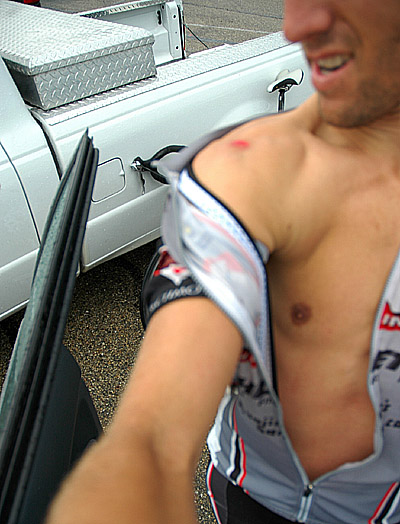
A steady rain began just as we hit the starting line. Water, falling from above and spraying up from below, took its toll on visibility as the crowded field made its way down the narrow, winding road. Traction was but a pleasant memory.
We safely navigated the first few turns but on the rolling hills there was an unsettling amount of braking. Each time someone tapped their brakes up front it would cascade treacherously through the line.
It was in a flat around Mile 4 that disaster finally struck. I was about halfway back in the pack when someone close to the front went down. Like dominoes -- 6 foot, 150 pound, 25 mph dominoes -- the rest of us went down with them.
I now know the sensation of driving off a cliff. When the riders ahead of me took their turn, I had less than a second to ponder the inevitability of it all and hope for the best before I toppled over their bikes and went down myself. My helmet bounced off the pavement and I rolled into the ditch, where immediately two riders landed on top of me.
I crawled out. My water bottles had flown off my bike. I replaced them and started walking down the road. While the sound of bikes colliding and riders swearing still filled the air, I took a quick inventory.
Body: I had minor road rash on my shoulder and had done something unnatural to my ribs, but they only caused me to wither in pain when I took a deep breath, so I made a quick mental note: Don't breathe hard!
Bike: A co-worker who also went down had to help me adjust the front brakes. The handlebars were askew and the hoods were banged up, but it was mostly cosmetic. Everything else appeared functional.
Uniform: One side was covered in mud and later when I reached into a pocket for some gel I pulled out a wad of grass, but there was no new ventilation. Phew. I didn't want to have to buy a new kit.
And that was that: My first race crash.
When a good friend had her first crash this weekend, I reminded her that there are only two kinds of cyclists: Those who have crashed and those who are about to crash. It's been three years and 12,000 miles since my last one, so I suppose I was due for this.
Soon after I was upright I got in a rolling paceline with four other riders: two teammates, the co-worker and an unknown rider. We got a good rhythm going. The unknown chirped, "Keep riding like this and we'll bridge in an hour!" I think we all recognized him for a fantasist. I fell off the paceline soon thereafter -- I could go only so fast without breathing hard -- and the other three would eventually drop out altogether.
I am not very ambitious about starting things, but what I start I like to finish, so I stubbornly rode on. If Dave Zabriskie could ride four stages of the Tour after breaking his ribs, I could certainly ride 30 more miles after breaking mine.
Later I was watching the pros ride their race through the rain. Nearby, two sheriff's cadets controlling traffic huddled under golf umbrellas. "Great day for a bike race, huh?" I said.
"Is it really?"
"No. Actually it's a big pile of suck."
"Oh. I don't really follow this stuff, so I didn't know."
But what he probably also doesn't know is that it's the big piles of suck that make this sport so great.
July 11, 2005
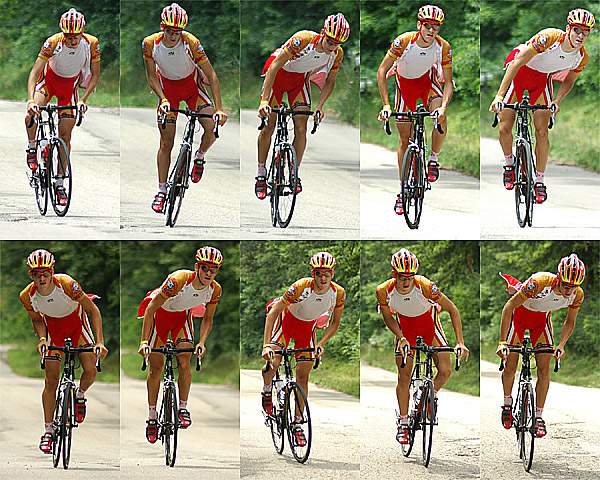
I'd give anything for a picture of this:
I'm climbing Alpine Valley's toughest hill for the fourth and final time. It's the same hill that the junior above is wiggling up. I try to spit, but full expectoration is not achieved. A stream of saliva dangles from my bottom lip all the way to my top tube. I could fling it away with a finger, but I need both hands to tug at my handlebars. I could spit it the rest of the way out, but that would take energy and focus, and my reserves of both are already completely devoted to the climb. So on it dangles for a good 20 seconds.
And it's great. This, friends, is why I cycle, and this is what cycling has done to me: It has literally turned me into a drooling idiot. (I wrote as much in a cranky e-mail to a local newspaper columnist who had belittled the Tour de France. He seems to find golf exciting. Wake me when Michelle Wie is working so hard that a giant loogie dangles from her lip.)
When I tell people how important racing has become to me, I often add, "And just think how much fun I will have once I'm actually competent." Truth is, I still stink. In today's race the pack shelled me after the first of four laps, thanks in part to some tactical miscues that wiped me out heading into a climb. (Bridging to a breakaway? Who do I think I am?) Once again I had to watch as a peloton drifted tantalizingly out of reach.
After I got dropped I was scooped up by a few other riders, one of whom organized a rotating paceline. Unlike at my first race, this time I knew how a rotating paceline worked, so I was able to stick with them.
We finished in a group of six. Even though we were contesting God knows what place, I attacked at the 100 meter mark. I thought it strange, though, that I couldn't see the finish line, and also strange that everyone else was content on my wheel. Nobody was sprinting. Then we passed the 200 meter mark. Blast! They'd put the signs in the wrong order! It was here that everyone jumped and left me in the dust.
As it turns out, that sign didn't say "100 meters." It said "1000 meters." It's not unusual for my vision to be double at the end of the race, but this was the first time it had been decimated.
This is Superweek, so there are races every day. I'm doing another one tomorrow, at a course aptly called the MGA Proving Ground. Another chance to prove myself worthy of calling myself a cyclist.
Photo taken: July 11, 2005
July 9, 2005
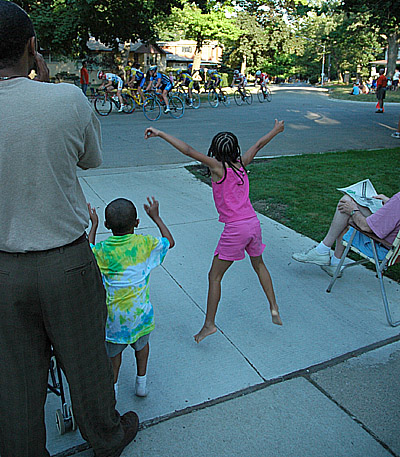
Last Night was the Beverly Hills Cycling Classic, the first event of the 17-day "Superweek," a series of races in Chicago and around Milwaukee. I'm registered for three of them, road races all. If I do well enough, I'll try to squeeze in a few more, maybe even a crit, but I'm not counting on it.
Beverly was a 60-mile criterium for pros and Cat 1's and 2's. The field was a mix of international pros and regional hot shots. This was my first exposure to racing of this caliber, and I was amazed: They were racing at speeds I could probably not even reach, let alone sustain for 2 hours.
I was also amazed at Beverly, a quaint haven of smalltown life on the far South Side. Rolling hills, well-tended lawns, large lots, kids at play, neighbors gathering to gossip, brats grilling in every other driveway -- I had no idea such a diverse neighborhood existed within Chicago city limits. Clean, quiet and pleasant without being overtly upscale or tony. Reminded me of parts of Minneapolis. I almost forgave its many violations of the Chicago grid.
Not that I'd want to live there, or even dine there. I left immediately after the race and hit Lem's BBQ on 75th on my way home. "Your ride all the way here?" said one of the guys behind the bulletproof window, knowing with a single glance that I had come a long, long way. "That's a regular Tour de France. We'll set you up with extra fries for that." Which he did, and which I enjoyed while sitting on the sidewalk outside. (My experience with BBQ suggests that quality is inversely proportional to available seating.)
Photo taken: July 8, 2005
July 8, 2005

Photo taken: June 24, 2005
June 30, 2005

How hot is it? Hot enough to take a plunge in street clothes at dusk? OK, good. Then it's almost as hot as I like it.
Photo taken: June 24, 2005
June 28, 2005

Sandy putts the 27th hole in Baraboo, Wis., a tough par three that I triple-bogeyed, costing me the game.
Photo taken: June 20, 2005
June 27, 2005

A thousand bicycles, their riders wilting from the heat, stream through a gushing fire hydrant.
A panhandler sitting in the shade, his shirt piled on top of his head, accepts my full water bottle on my way into the grocery but still asks for change on my way out.
I yell "Eamus catuli" to the Bridgeport Sox fans and they smile and I am a half-block away before they translate.
A staggering, shirtless wino politely watches our volleyball game. He is confused about a great number of things, most immediately why none of us is subbing out to let him play.
A single loud fan keeps cool the all-night taqueria where the tacos al pastor reveal faded chinese writing on the plate beneath.
These are the moments of a Friday evening in summer. These are the moments for which I choose Chicago as my home. These are the small, satisfying moments I spend all winter looking forward to.
Photo taken: June 24, 2005
June 26, 2005
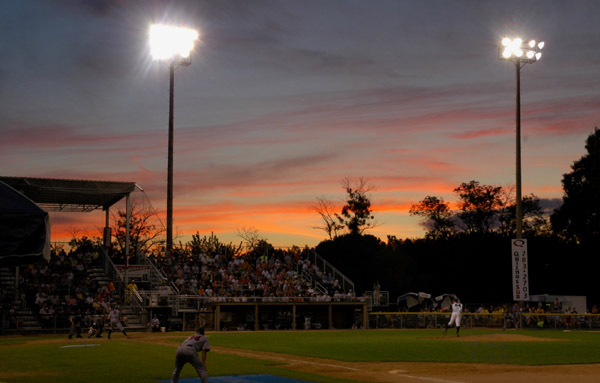
Madison Mallards 5, Lacrosse Loggers 4.
My cousin Mike, at bat above, plays for the Mallards of the Northwoods League, a summer league for college players who either haven't been drafted yet or haven't been drafted high enough to justify leaving college.
It so happened that he was playing in Lacrosse while I was camping nearby, so I took in a game. He went 2 for 4 with a two-run home run that turned out to be the difference.
A few days earlier I had seen him play in Madison and he went 4 for 4, though it was hard to tell with all the loud music, promotions and sound effects, apparently designed to distract fans from any baseball that was going on. I felt like I had gone to Mancow's Morning Madhouse and a baseball game had broken out.
He is the third generation on that side of the family to find success in baseball, all beginning with my grandfather, who coached amateur ball for decades. Thus I found something natural and comforting in seeing "ROHDE" on the back of a jersey, like pulling up to your driveway after a long absence and seeing your name on the mailbox.
Photo taken: June 21, 2005
June 25, 2005

You see things vacationing on a [cycle] in a way that is completely different from any other. In a car you're always in a compartment, and because you're used to it you don't realize that through that car window everything you see is just more TV. You're a passive observer and it is all moving by you boringly in a frame.
On a cycle the frame is gone. You're completely in contact with it all. You're in the scene, not just watching it anymore, and the sense of presence is overwhelming. That concrete whizzing by five inches below your foot is the real thing, the same stuff you walk on, it's right there, so blurred you can't focus on it, yet you can put your foot down and touch it anytime, and the whole thing, the whole experience, is never removed from immediate consciousness.
Robert Pirsig, "Zen and the Art of Motorcycle Maintenance"
Two summers ago I took a camping and cycling trip that stopped in Iowa, Wisconsin and Minnesota. The best roads I found were along the Mississippi north of Lacrosse, Wis., so after a few days camping with friends at Devil's Lake, western Wisconsin is where I returned this week to spend my vacation time.
Once again the riding was sublime. The shaded hills were mean but beautiful -- conversely, the locals were homely but very friendly -- and for every car there were a hundred cows, for every cow a thousand cornstalks. It's here, in the valleys along County Road G, that I will build my training facility once I win my lottery or marry my heiress. (Candidates for the live-in masseuse(s) may submit applications and schedule interviews now.)
Base camp was at Perrot State Park in Trempealeau, Wis. A train parallels the river every thirty minutes. At the Wildflower Cafe, where the French toast is as thick as a bible, the old-timers crowd the counter each morning to, as they were doing two years ago, complain about local government and wonder how bad this drought is going to get.
When I wasn't riding I was reading, watching amateur baseball and enjoying the light of solstice. (Also: swatting mosquitoes. Shaving my legs yesterday was like running a slalom course.)
Even on the most perfect vacation, however, I get solemn. For years I've had a Kundera-like aversion to kitsch, but it gets exaggerated on a trip once I remember that the freedom and relaxation are temporary, that the hours that seem so endless are indeed running out. On a vacation I become sad not only because I cannot forever live this life -- napping with aplomb, riding without a destination, dining without a budget -- but because nobody can. While functional people are enjoying a sunset, vista or other supposedly fun thing, I am quietly exhaling sighs of regret and nostalgia. I know, it's sick, but If ever I seem like I'm not having enough fun, know that it's likely because I'm in fact having too much.
Photo taken: June 22, 2005
June 24, 2005

I'm back. Trip report TK.
Photo taken: June 21, 2005
June 14, 2005
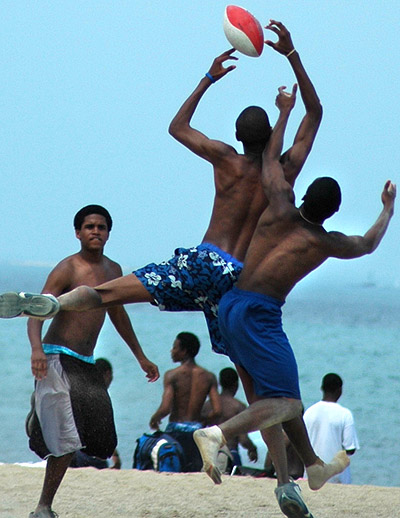
At 31st Street Beach.
Photo taken: June 9, 2005
June 13, 2005
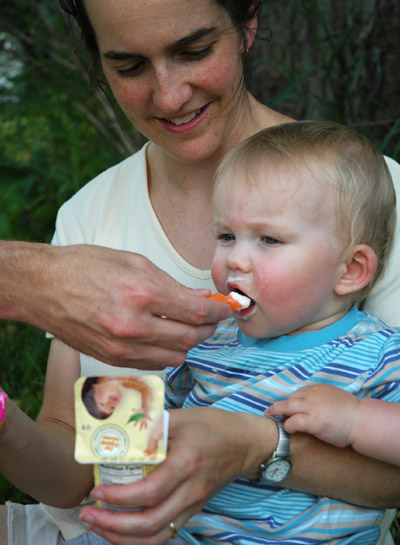
Suzie was having trouble feeding Macolm yogurt without a spoon when I remembered an anecdote Hank told more than 10 years ago. He was at a baseball game where a boy nearby was having the same trouble, so his father whittled a spoon from a carrot. Problem solved.
I asked Hank whether he remembered this. Of course he did. And this reminded Suzie that there happened to be a bag of carrots in the cooler.
So like the pretty girl at the bar who ties a cherry stem into a knot with her tongue, Hank put a baby carrot into his mouth and a minute later withdrew a baby spoon. Voila.
Photo taken: June 11, 2005
June 9, 2005

Yesterday I rode down to the South Side for some ribs and hot links at Barbara-Ann's, a carry-out BBQ joint reputed to be one of the best. I'm not expert enough to judge, but I know what I like -- SWM, 29, spicy, tender and messy, seeks same. Smoking OK. No fatties. -- and I really liked this.
But something unusual happened: I was not able to finish my order. I'd met my match. The thought of another bite made my head hurt. Five bites later my head really hurt. Five bites after that I was ready to pass out.
It was 90 degrees and humid. I sweat profusely as I sat against a Dumpster, the remnants of my meal between my legs. My eyes floated heavenward in defeat and exhaustion.
Five elderly men pulled up in a late-model sedan. One of them looked at me with a look of grave concern. He motioned to his mouth. It took a second but I finally understood: He thought I had been beaten up and left for dead. "No," I mumbled as I waved him off, "it's OK. It's only BBQ sauce."
Photo taken: June 8, 2005
June 6, 2005

You've come a long way, Sweet Baby Malcolm.
Photos taken: June 5, 2004, through June 5, 2005
June 2, 2005

Following the Monona, Wis., Memorial Day parade.
Photo taken: May 30, 2005
June 1, 2005

The South Chicago Wheelmen run a Tuesday night criterium series that is popular for developing riders and others looking to fine-tune their racing skills. Seven dollars buys entry in up to three races on a 1km course. It's loose and informal. Riders are free to get lapped or drop out and jump back in.
This week's races fell less than 36 hours after my marathon, but it would have been a shame to let a rare Tuesday night off work go to waste. I figured I'd go and at least see what it was all about.
I couldn't find a ride, so I joined a few teammates for the bike trip down. We took Kedzie through the length of Chicago, then through Evergreen Park, Merrionnette Park and Alsip. And Blue Island, Robbins and Midlothian. And Oak Forest and the Tinley Creek Forest Preserve.
Three hours and 39 miles after I began, my nose caught the sweet, sweet odor of fresh paint. Finally we were at our destination, the Matteson Ace Hardware paint factory where the series is held.
Of the 65 total laps, I raced only 25 in deference to my aching legs. Though I still hate crits, even limited participation was good practice. I definitely learned a thing or two about tactics and protocol.
The ride home was a delight, especially going through the forest preserve as the sun eased over the horizon.
I got home around midnight. My odometer read 93 miles. It was still pleasant out, so I dropped my heavy bag, ate a banana and headed down to Belmont and back to make it an even hundred.
Photo taken: May 31, 2005
May 27, 2005
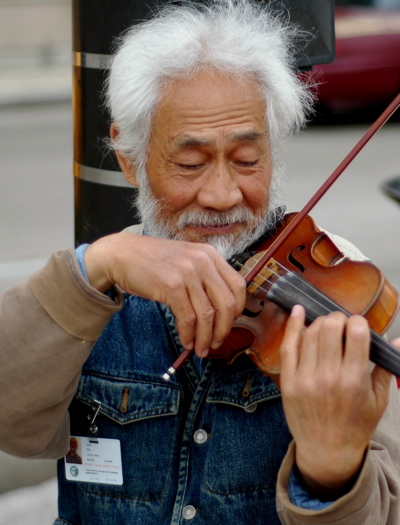
On Michigan Avenue, another brave soldier resisting the mayor's crusade against public music and streetlife. He played with enviable whimsy, but when he sensed the camera he masked it with a very serious, concentrating countenance. Once he had adopted just the right gravity he beckoned the photographer with his pinky, as if to say, "Here, this is the picture you want, not the one where I am smiling at the little girl."
Photo taken: May 25, 2005
May 26, 2005

Washing the fourth of the 45 floors of the Kluczynski Federal Building.
Photo taken: May 23, 2005
May 25, 2005

A dancer checks his hair before taking the stage at the city's Asian-American Festival.
Photo taken: May 23, 2005
May 24, 2005

At the Foster Avenue Beach basketball court. The players put on a good show, but it was all slop. Took 'em 40 minutes to play to 10.
More at Flickr.
Photo taken: May 22, 2005
May 23, 2005
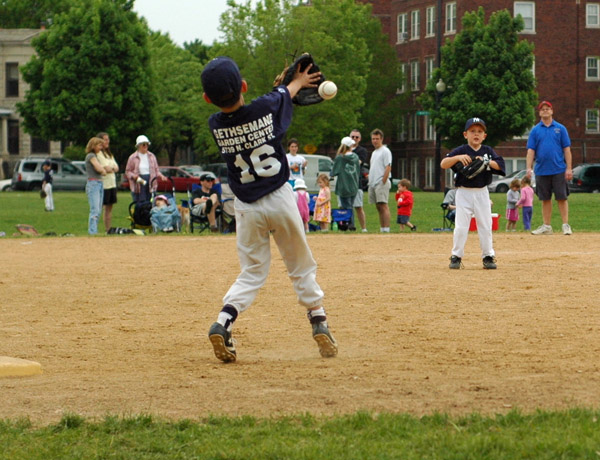
The other team had an ingenious strategy.
Hit the ball to the pitcher. Run to first.
After first baseman drops the ball, run to second, third and perhaps home.
Repeat.
The first base coach was a regular Wendall Kim: "Runrunrunrunrun! Runrunrunrunrun! Runrunrunrunrun!"
Photo taken: May 21, 2005
May 22, 2005

Summer is almost here, meaning the following scene will be re-enacted dozens of times each weekend: The limos will park illicitly on Michigan Avenue, discharging their passengers into the crowds of tourists. While the drivers stall the traffic cops, the photographers will herd the wedding parties into Pioneer Court and frantically capture every permutation of subject: bride and groom, bride and family, bride and maids, groom and best man, ad infinitum.
Photo taken: May 21, 2005
May 19, 2005
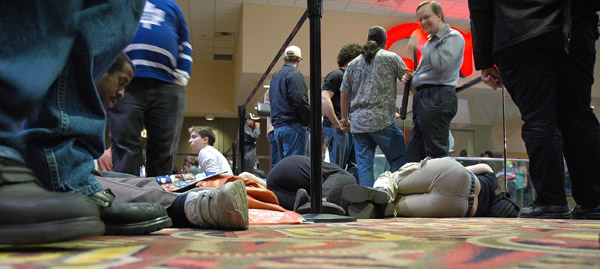
Sith happens.
After work I killed time at Cambridge House, one of River North's last diners. It's doomed for demolition within the year, so as I read and sipped my coffee I took note of all the usual late-night characters. The tourists, the young couples taking breaks from clubbing, the second-shift employees from neighboring hotels picking up their burgers and francheezies. And the truck driver who scolds the waitress for having missed "American Idol" because, Honey, now how is he going to know what happened to Vonzell?
Around 12:30 a.m. I took my place in line at the theater, surrounded by college students and middle-age fans quite amused by the sounds of their own Yoda voices. (The dorkiest of the young dorks had quite fetching girlfriends in tow. WTF? I screwed my fists into my eyes to make sure I was indeed seeing what I was seeing and it wasn't a sleepy-headed hallucination, but it was true: They were hotter than a summer day on Mustafar.)
A dozen screens were in use for the midnight show. It took awhile to flush them out. Then there was a problem with the digital projector. Then there were 20 minutes of trailers. My 3 a.m. show didn't start until 3:50. When I finally got home at 7, my alarm was going off, still set from when I'd woken 25 hours earlier for time-trial practice.
Photo taken: May 19, 2005
May 17, 2005

Mary Chapin Carpenter, Saturday, 8 p.m.
(No, I did not go.)
Photo taken: May 13, 2005
May 15, 2005

Everything was going great until I fell into that ditch.
Saturday's road race was very similar to my last one: three loops for a total of 41 miles near Baraboo, Wis. The course's main hill was much larger, however, a 360-foot climb stretched out over about a mile. Nothing that would challenge a proper cyclist, but significant for us Chicago flatlanders.
Starting up the hill the first time I was near the front of the pack. By the top I'd been gapped by about 30 meters. Fortunately the lead group slowed down in the flat and a few other stragglers and I were able to catch up.
Alas, what goes up must come screaming down, and the descents here were much steeper than the climbs.
On the first of two descents I topped 46 mph, the fastest I have ever gone without the aid of internal combustion.
The second descent had a brief flat spot and a slight turn at its midpoint. Feeling tentative at that midpoint, I tapped my brakes, but that created more of a wobble, so I had a choice: slow down or turn. I chose to slow and quickly ran out of pavement. Fortunately the ground was damp from the night's rain and slurped up my wheels, allowing me to come to a safe but humiliating halt in a grassy ditch.
This would be the last I'd see of the leaders. I hadn't thought I'd be able to stay with them the whole way, but I'd hoped to at least finish a lap with them, and I'd hoped to get dropped because I was going too slow, not because I was going too fast.
I hopped back onto the road and caught up to my teammate Dave. He'd been dropped from the pack back at the hill and had came just short of getting back to the pack. We rode together the rest of the way.
The hill seemed easier each time we took it. Part of that was knowing that there was indeed an end to it, something I wasn't so sure of the first time. The third time we hit it, Dave and I were in a group of five and were 10 meters behind a group of eight from the masters race that had started five minutes after ours. I surged ahead of the 4/5's I was with, and then one by one I passed the masters.
In the flat I was in the middle of the masters pack. I wasn't sure about the etiquette, so I asked whether it was bad form for me to ride with them. "Um, yes," one said, so I peeled off and enjoyed the scenery until Dave and the three others caught up.
Except there weren't three others: It was just Dave and a young rider from Sturgeon Bay. The three of us rode together for the balance and it was almost a replay of Baraboo: I attacked going up the final hill and got a good gap but was unable to hold it long enough. I'd promised Dave that if this happened I'd try to lead him out, but I didn't have enough left to help him much, and the Sturgeon Bay kid beat both of us.
Rain started to fall as we hit the finish line and grew into a downpour as our team debriefed under a tree. We'd have no chance for a cool-down ride, so 24 hours later my legs are still stiff.
Photo taken: May 14, 2005
May 8, 2005

Saturday I competed in my second criterium, the Monsters of the Midway down at University of Chicago.
This one yielded a Schmalz Suck Level of 6.
My first crit was a Cat 5-only affair. There were only 25 riders and the pack stayed together the entire race. Saturday, on the other hand, was both Cats 4 and 5 and there were about 80 riders, nearly all of whom had many more seasons of exerience than me.
My anxiety over riding in such a large, fast group proved unfounded when I got dropped early. Suddenly I had all the space in the world. How early I got dropped I'm not exactly sure. Maybe on the first backstretch, when we hit a headwind. I can remember very little about the first few laps. Usually I'm able to replay every turn of a race in my head, but in this case there's an amnesia.
Around the 10th of the 15 laps the main pack lapped me. They screamed by like a train. At least one screamed at me for not pulling far enough to the right.
I wasn't sure if I was allowed to continue after that, but no official pulled me off and the small group I was with kept going. Our sprints weaved through the faster riders on their cool-down lap. I attempted a bike throw at the finish line to contest 70th place -- this is a guess; officials stop counting after the first 30 or so, so I'll never know my precise placing -- but I was just short.
Beyond my inability to sprint or corner, there are plenty of reasons I don't care for crits, fear of death and dismemberment among them. Mostly I prefer the road race because I find it to be a much more honest test of strength, endurance and character. Yes, there's drafting and tactics, but there's no hiding: The wheat will eventually drop the chaff.
A crit tests other things, such as handling, teamwork and acceleration, noble skills all. But it seems that placement hinges most on how well a rider can weasel a good position on the last lap. (I hope this is an honest observation, and not just the sour grapes of someone yet to finish in the top 80 percent of a crit.)
Me, I just want to ride long, ride hard and ride fast. I'll save my bike handling for when I'm dodging cabs on Michigan Avenue.
Riding home the wind off the lake was so fierce I could barely maintain 15 mph. At the Museum Campus I cut over to city streets, hoping the buildings would block the Hawk for me. I was still wearing my team jersey, so I resisted the usual temptation to flip off Hummers, lest I bring more shame to my squad than I already had.
In Uptown I crossed paths with a guy on a 10-speed with a torn-up leather jacket, coonskin hat and big, droopy mustache. (No, it wasn't Bob Conrad.) Attached to his rear rack were two speakers the size of suitcases. They blasted AC/DC. A bright-orange novelty license plate read "HOFFA."
Something told me that if there were a bad-ass cyclist at this intersection, it wasn't me.
As penance for the day, I headed up to Highland Park this morning to do hill repeats.
Photo taken: May 7, 2005
May 7, 2005

On Michigan Avenue.
Photo taken: May 6, 2005
May 6, 2005
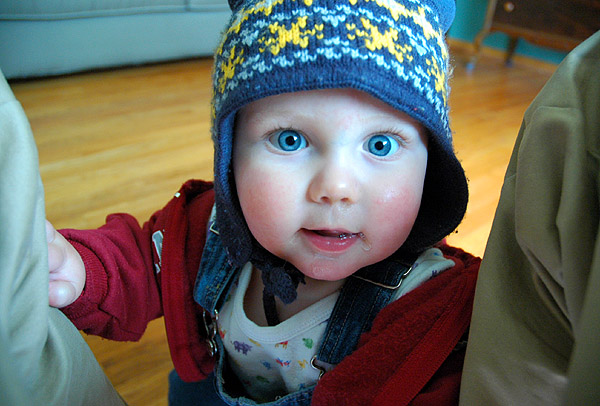
Young blue eyes.
Photo taken: May 1, 2005
May 2, 2005

I'm completely hopeless at this. I brake too often, and at the wrong moments. My back wheel keeps trying to skid out from under me, I wring my way clumsily through the curves. I started this sport too late. My muscles were able to fit themslves to my bike, they actually liked it: muscles are tractable and learn tricks fast. But racing downhill is a matter of nerves, and from the very start my nerves have thought: to hell with you and your bicycle racing.
Tim Krabbe, "The Rider"
Saturday I rented a car and drove to my first road race, a course of three 13.5-mile loops through the hills of southern Wisconsin.
I'd been excited about it for weeks, but my race almost ended before it started.
Knowing that there would be hills, I had earlier in the week looked up "descending" in the index of my cycling book, much like how on the night before his first operation a doctor might look up "surgery, open-heart" in his medical textbook.
One of the things my book advised was to test how fast your bike can go before it starts to shimmy. I never got around to doing this. Suddenly I was on a warm-up ride with my teammates Saturday morning and without even meaning to I was going extremely fast down a steep hill.
30 mph. 35 mph. 38 mph.
And then I had my answer: At exactly 39.6 mph my bike, the Colonel, begins to shimmy like a jug-band handsaw. Duly noted.
Bob was riding behind me and told me later that he was certain I was going down. I was certain, too, and was calculating the best way I could land and protect my bike. Fortunately I was able to tap the brakes gently enough to regain control. I was shaken, but wiser and safer for it.
There were nine of us from my racing team competing. We were all Category 5 riders and the race would be a mix of 4's and 5's, but we figured that we could parlay our numbers into success by taking control of the pace from the start.
Our plan derailed immediately. An initial descent and tailwind conspired to quickly bring the pace to 28 mph, much faster than we had anticipated. A small crash in the first mile created gaps in our line. Then came a steep climb and we were irrevocably strung out.
I had succumbed to tunnel vision on the way up, observing nothing but my breathing and my pedaling. I had no idea what was going on with my other teammates. At the top I saw only one friendly, Dave, but I didn't know if anyone was ahead or how far back people were behind. Should we chase? Should we wait? We hesitated, then joined with some other riders. We wouldn't see another teammate for the rest of the race.
For the next 15 miles Dave and I rode in packs of between three and seven. Between the hills and the bends in the road, it was impossible to tell how far we were from the leaders, or how far we were ahead of the nearest riders behind.
On a bike your consciousness is small. The harder you work, the smaller it gets. Every thought that arises is immediately and utterly true, every unexpected event is something you'd known all along but had only forgotten for a moment. A pounding riff from a song, a bit of long division that starts over and over, a magnified anger at someone, is enough to fill your thoughts.
During a race, what goes round in the rider's mind is a monolithic ball bearing, so smooth, so uniform, that you can't even see it spin. Its almost perfect lack of surface structure ensures that it strikes nothing that might end up in the white circulation of thought.
Krabbe, "The Rider"
Strategy was an afterthought for me, insofar as one can have an afterthought when there is no thought to begin with. My mind was a vacuum, a slave to the road. Pedal, the road said, and I pedaled. Pedal harder, the road said, and I pedaled harder. Obeying the road is all my mind was capable of. Plan a breakaway? Plan a sprint? It would be like a man on the gallows planning a vacation.
At the halfway point Dave and I were in a group of seven when someone took charge and organized a rotating paceline. These guys were out of my league and I got dropped faster than I could say "Wait, how again does a rotating paceline work?"
I rode the next 14 miles with someone from Stone Creek who was also doing his first road race. After a few steep descents and corners I got dropped from him, too, and found myself about 100 meters from his wheel and 100 meters ahead of two unfamiliar riders behind me.
This was a decisive moment: Do I push hard to catch up to the solo rider, or do I relax and create a three-man paceline with the others? The worst thing I could do was to do nothing, to waste energy in limbo. If I were one to find meaning and weight in everyday things, I would suggest that this offered an analogy for many of life's decisions: Struggle and claw for advancement, or relax into comfort and safety? I'm not one for such metaphor, however, and then I got lucky: Topography made the decision for me. We were once again at the steep hill that had earlier broken my team and I was able to climb it better than the Stone Creek rider. I caught up to him easily and never again saw the two riders behind us.
Around the 30-mile mark we caught up with Dave, who had been dropped from the same paceline that had dropped me and was riding alone. The three of us rode together, splitting pulls pretty evenly.
When I have 6 miles to go in a long ride or marathon, I like to project my commute on the balance. 6 miles? That's nothing. That's Foster to Grand. I can do that in my sleep. 5 miles to go? I'm at Montrose Avenue. Easy.
The last big hill came with 2 miles to go (Armitage Avenue). At the top I had created a 20-meter lead over the other two. This was another decisive moment. Anything shorter and I might have held back to work with Dave, but I decided to test what I was capable of. With a mile and a half to go (North Avenue! Hang on!) I had opened a lead of around 100 meters.
Once again my tentativeness on descents and corners did me in. No doubt the scare before the race contributed to my hesitancy. Like Tim Krabbe, I am fearful of descents and corners; I much prefer going up hills than down them. My nerves took away the ground my legs had fought so hard for, and my pursuers caught me a half-mile from the finish (Chicago Avenue).
I was vanquished and wiped out. I didn't even have the good sense to fall behind one of their wheels. Instead I let myself tow them to the finish. An official got excited about a possible sprint, but I had nothing left, and Dave didn't have much more. The Stone Creek guy crossed first, then Dave, then me.
Twenty minutes later I was standing at the officials trailer and reading the results. Of 45 riders, 31 had finished. I was the 22nd. This meant that I had already met the first benchmark of my racing career: finishing in the top half of the field. But then I overheard a rider complaining to an official that his name was not among the results. The official checked the film and sure enough, this rider had finished 8th. So now I was 23rd, and no longer in the top half.
In retrospect, that's exactly how I should have played that finish, even if it were a contest for 21st and not for 1st. I sprint like a school bus, so my only hope was to attack on the last hill and use my climbing abilities to create an insurmountabe lead. It almost worked. If only the last hill were a half-mile closer to the finish. Nonetheless, it pleases me to think how seamlessly theory translated into action. My body didn't need any input from my mind. It just did what it was supposed to do.
Later I was taking pictures of the Cat 1/2 race when two local girls drove up and asked what we were riding for. I think they thought it was a charity ride.
"It's a race!"
"How far?"
"41 miles."
"Ohmygod I'd die!"
My lungs were shot, and I nearly died myself hacking out a laugh.
Photo taken: April 30, 2005
May 1, 2005
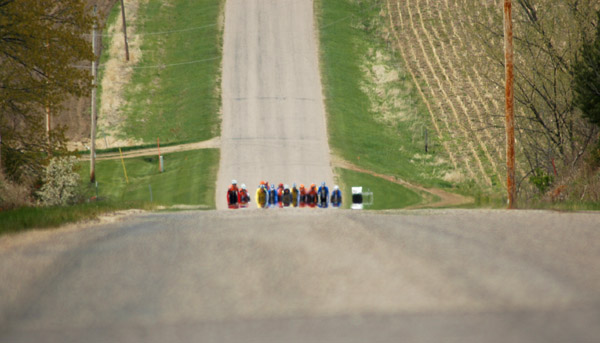
Category 1/2 men ride the Circuit of Sauk in Baraboo, Wis.
Race report TK.
Photo taken: April 30, 2005
April 28, 2005
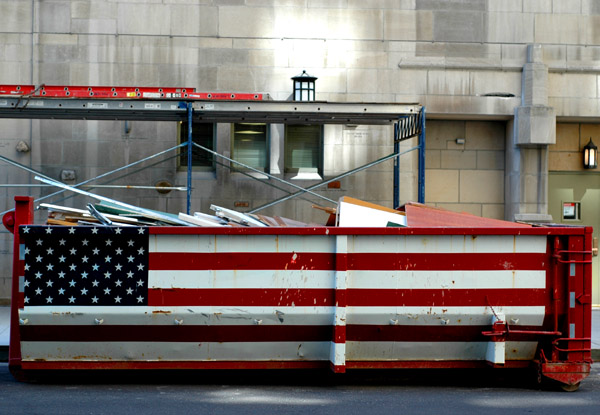
On upper Illinois near Michigan.
Photo taken: April 15, 2005
April 27, 2005
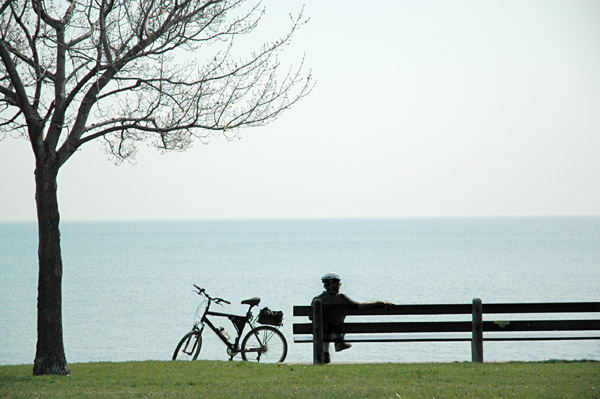
Near Bryn Mawr.
Photo taken: April 19, 2005
April 25, 2005
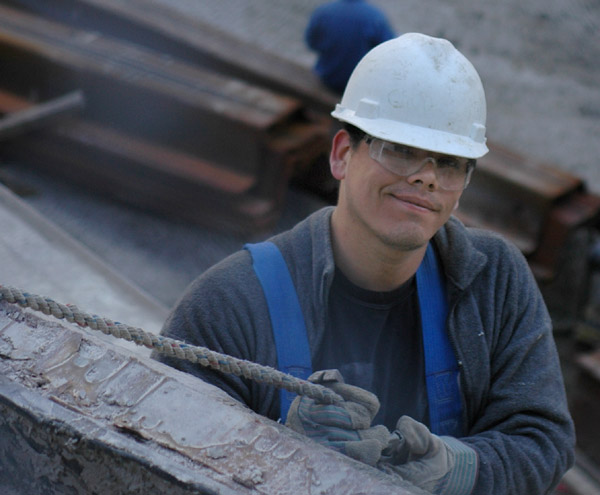
He was tethered high above the construction pit for the Trump Tower. It was one of those rare instances where a person could be at ground level and still fall to his death.
Photo taken: April 15, 2005
April 23, 2005

Boy, what a hassle. So many strange bumps and corners. I'm compelled to salute and thank any woman who has ever shaved her legs on my behalf.
There is schism in the cycling community about whether a rider should shave his legs. The principal argument is that smooth legs make life easier after a crash. (The counterargument is, If you're crashing that much, perhaps racing isn't your destiny.) Most riders, however, would probably concede that shaving is mostly about showing that you're in the club. It's about showing your hairy rivals that you're more serious than they are and that they needn't bother chasing after your attack. One cyclist put it to me in Kesey-ian terms: "You're either on the bus or off the bus. Shaved legs says you're on."
Plus, we work really, really hard to achieve OED-quality definition on our leg muscles. Why hide them behind foliage? It's like hiding a nose job behind a burqa.
In an odd twist, I have in the past year shaved my mother's head and now my own legs. I didn't pay attention enough during college to know what Freud would think of that, nor what he would think about how much I've enjoyed fondling my smooth legs. (Steve Martin said he could never handle being a woman because he "would stay home all day and play with my breasts." My guess is that he could never handle being a cyclist for the same reason.)
I'm sure my co-workers will heckle me next time I wear shorts into the building, but I just shaved my legs for my passions and desires. What the hell have they done for theirs?
Photos taken: April 22, 2005
April 22, 2005
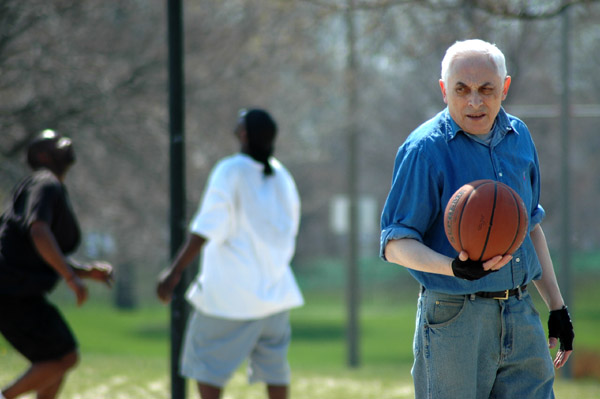
He wore blue jeans and cycling gloves to the Foster Avenue courts and shot from the chest. When younger players made a shot he would squint and give a thumbs-up, but they pretty much ignored him.
Photo taken: April 19, 2005
April 21, 2005
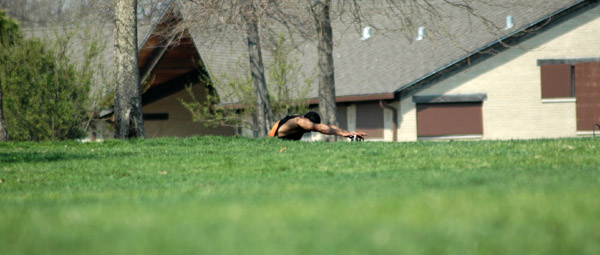
Near Foster and the lake.
Photo taken: April 19, 2005
April 20, 2005
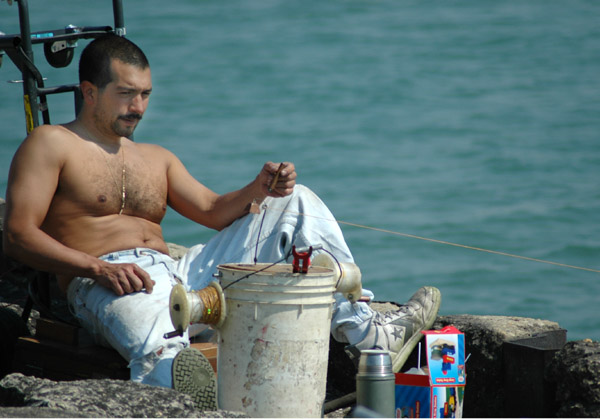
"What's out there?"
"Salmon, I hope."
It took about 20 minutes for him to set up. First he laid out his gear on the rocks: a long net, a bucket, a wooden tackle box and a fire extinguisher(?). He tied his line to a small bell. Then he went to his van to get his dog, Jack, and some lunch. Jack took a leak on the rocks. The guy took a leak into the lake. Finally he was ready to sit down, light his cigar and get to work.
Photo taken: April 19, 2005
April 17, 2005
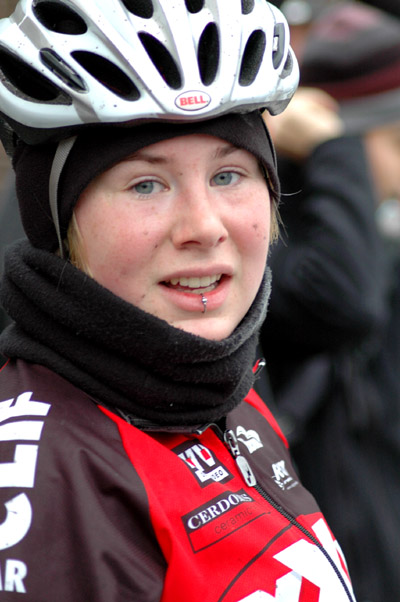
Once I had decided to get into racing, I started looking for a team. I needed a group whose rides started in the city, had morning events and was open to beginners. Most teams I found were based in the suburbs or came across as too insular.
Judging from its Web site, xXx Racing-AthletiCo seemed like the right fit. There were a few xXxers at the alley cat I did in January, including Anita, above, and though I didn't talk with them much, they gave off just the punk-jock vibe I was looking for. Later that week I sent in my first membership dues.
I finally went on my first team ride Saturday morning. It's a weekly ride 16 miles north to Highland park. There were about 40 riders of varied abilities, which kept the pace moderate, around 18 mph.
I'm glad I finally got to meet more members of the team, although it's a funny thing when everyone is in the same jersey and wearing sunglasses and you're processing them out of the corner of their eye: You attach names to bikes rather than faces. "The orange Orbea is Bob ... the black Trek is Phil ..."
In Highland Park we broke into smaller groups. Some would ride straight home. Others would go almost as far as the Wisconsin border. I ended up in a group of six who wanted to do a loop through Ft. Sheridan, another 10 miles.
It was good paceline practice. I was chagrined, however, at how much I struggled to get up the single tough hill we came across. I sprint like a school bus, but my theory has been that my body would be more suited for hills: I'm lighter than most other riders, and running has developed my slow-twitch muscles. So much for that theory.
As a group of six we went faster than before, about 21 mph, and into the wind and with a smaller draft. About 10 miles from home I started to be a drag on the group. I lagged, letting gaps develop and slipping into anaerobic respiration just to keep up. Dropping out became an option, an ominous thought given that my next competitive race would be about as long as this ride and with many more hills and less collegiality.
Just in the nick of time my bike seized. Two calamities had struck: My rear quick-release had come undone and I had a flat. I'm not sure which caused the other, but I was in trouble.
I half-heartedly told the others to go on, but I knew I'd need their help. Fixing flats on a road bike is my bane. I know, I know: Calling yourself a cyclist and not knowing how to change your tire is a bit like calling yourself a fashion model and not knowing how to change your clothes.
Within ten minutes -- hooray for co2 cartridges -- we were rolling, and there was minimal grumbling from my teammates. The worst came a few minutes later: "Let's try to get a rhythm going, eh? We were doing fine until that flat." For me, however, the flat offered the perfect breather, and I was strong the rest of the way.
xXx is notorious for having been started by bike messengers. It now has corporate sponsorships, committees and other trappings of a grown-up racing team, but it still feels like a good fit. Obviously I'm not yet a perfect fit for it, but the plan is to change that by the end of the summer.
Photo taken: Jan. 9, 2005
April 16, 2005
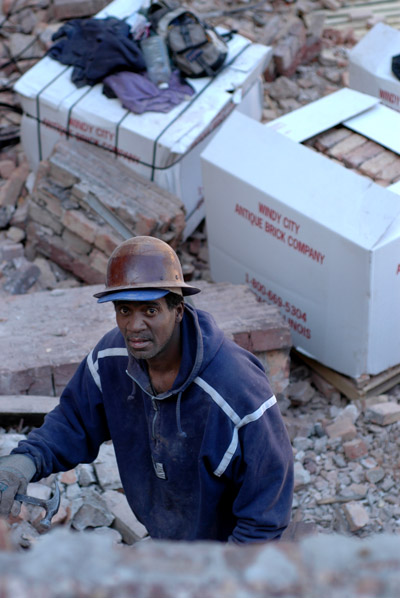
The building behind the Intercontinental has been demolished. For a week a dozen unskilled laborers have been sorting through the rubble and picking out intact bricks to be bundled and sold as antique building materials.
Photo taken: April 15, 2005
April 15, 2005

Where are all the faces?
Chicago is a city of 3 million people, but you'd never know it from its photoblogs and Flickr entries.
With rare exception -- Derek Powazek comes to mind -- we're a timid lot, we photobloggers. We're fearful. We're wary of offending strangers, sensing their nervous looks and desires for privacy. We fail to convey that our cameras are signs of affection.
So instead of taking pictures of people and bringing life to the Web we shoot buildings, quirky signage or, in our most daring moments, the backs of people's heads on the train.
Reluctance to offend or discomfort is a revolutionary concept these days, but it's driving me crazy. The facelessness that results approaches misanthropy, and it gives the false impression that Chicago is a cold, vacant and inanimate place.
I'm as guilty as anyone, but here's my summer goal: More faces and less fear. More smiles, more crying. Fewer parking lots, fewer industrial sites, fewer empty seats.
People are beautiful, and Chicago people are the most beautiful of all. We should show them off.
Photo taken: April 9, 2005
April 11, 2005
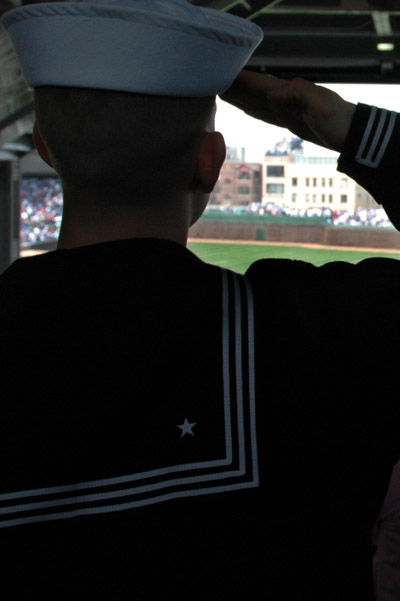
National anthem at Wrigley Field.
Photo taken: April 9, 2005
April 9, 2005

Cubs 4, Brewers 0.
Photo taken: April 9, 2005
April 8, 2005
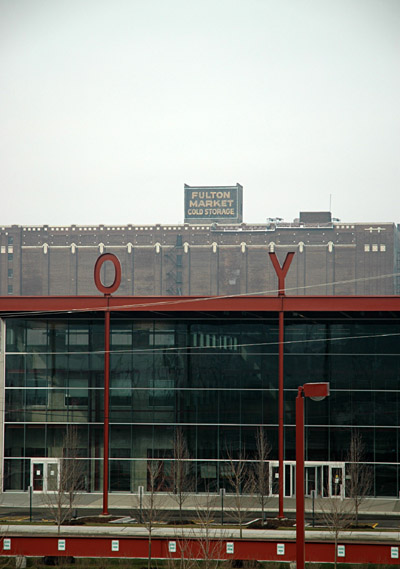
Oy.
Photo taken: March 27, 2005
April 4, 2005

My three goals for my first criterium were met. I didn't die. I didn't crash. I didn't come in last.
The women above who raced after me were not so lucky. I couldn't tell exactly what happened, but two of them went down hard on the final sprint.
There were no crashes in my event, a relief given that it was a Category 5 race. My understanding is that Cat 5 races are full of beginners with dubious bike handling, but everyone seemed confident and experienced. I wonder whether this is like spotting the fish at a poker table. If I look around and can't spot the squirrelly rider, does that mean the squirrelly rider is me?
I have no complaints with my performance, though I made two first-timer mistakes.
With five laps to go I launched an accidental attack. I'd taken a turn too wide and then overshot the pack when I tried to reenter. Suddenly I was about 10 meters ahead and going as fast as I could into the wind. It lasted about 2 seconds as the pack reeled me in faster than anyone could say, "What does that idiot think he's doing?"
Then I misjudged the final sprint. I was in the front third on the final turn and wondering what was about to happen. While I wondered, everyone else was starting their sprint and passing me with ease. I jumped a second late and had to settle for 19th out of 24.
It surprised me how stressful the criterium is. I'm accustomed to marathons, where I'm not competing against anyone but myself. In a bike race, I'm competing against others, and it was strange to have to take them into account.
I sat in the passenger seat on the way home. With every brake and swerve, my fingers twitched as if they were still on the handlebars. My eyes scanned the road for holes to fill and steady wheels to draft behind.
Photo taken: April 3, 2005
April 1, 2005
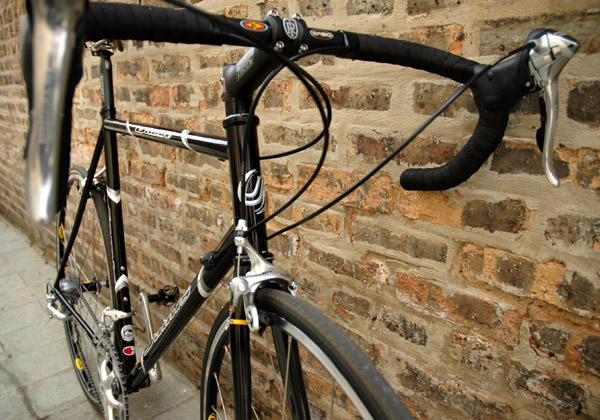
I am now a three-bike household.
Her name is the Colonel. She's fast, sleek and double-butted. Just like I like 'em.
It came down to this Jamis Quest and a LeMond Croix de Fer. I'd wanted to like the Lemond, but I had to concede it was mostly for aesthetics. Lemonds look sexy and European but are made in America. (Just like I like 'em.) The Quest, though, had more jump and better components, and although I'd made made-in-America the tie-breaker, this was no tie.
My first race will be in two days.
I'm sure this is insane, to compete before I've become fully acquainted with a new bike. It will be like driving the Indy 500 in a new car and spending the first few laps fumbling for the cigarette lighter and windshield wipers. But I've been hepped up to race since November. I can wait no longer.
Sunday's race is a 30-minute criterium in St. Charles -- about a dozen laps around a milelong street course.
For weeks I've been visualizing. In the past I have visualized my marathons, but it's always been a single vision: smooth and swift from start to finish. In my mind, dropping out of a marathon is as unimaginable as winning one. For the crit, however, I have four visions, each as likely as the next:
I get dropped hard and early. My only prize is for being first into street clothes.
I keep up with the pack but lack the tactics and skills to break out.
I keep up with the pack but lose confidence on a turn and brake. I start a chain reaction that takes out a dozen riders, several of whom come up to me afterward and offer bribes to ensure that I never race again. As I am lifted into the ambulance I wiggle my toes in the Morse code for "OK, never again." Meanwhile, the race director places a Styrofoam cup in my hand. "Don't forget your teeth."
A winter of bike commuting pays off. Not only do I keep up but on the final lap I join an attack and sprint my way to a podium finish.
More details as they develop.
Photo taken: April 1, 2005
March 29, 2005
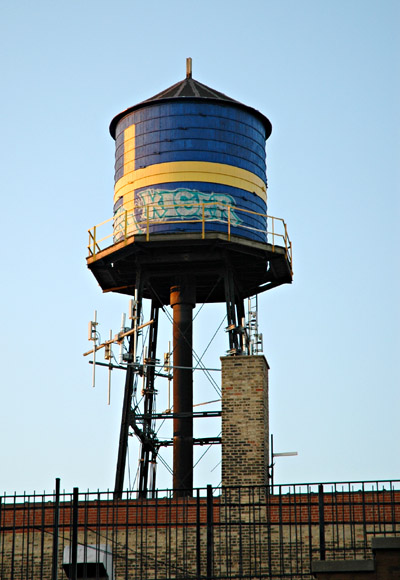
Last summer I overheard some kids talking about Peter Berry, d/b/a King Kiser. He was a graffiti artist who'd fallen onto the tracks in Rogers Park and was killed by a train. A few days later a local newspaper ran both an obituary and a front-page profile. From all accounts he was a decent kid and was well-liked, and since his death "RIP Kiser" tags have been common sights, especially along the Red Line.
But it's one thing to tag alleys and billboards and it's another to mark up beloved community fixtures. It's a shame, then, that Peter Berry's legacy will be the Andersonville water tower and every time someone looks up and says, "What a fucking asshole."
Coincidentally, my building also got tagged this week. It's the first time this has happened since I moved in, which is surprising given our proximity to two public schools. Mostly I was upset that they hadn't taken the time to make it look good. The script was rushed and sloppy, like that of someone whose medium was yellow snow, and I couldn't make out a single word. (Then again, I don't pretend I was supposed to.)
I also grimaced thinking about the money it will cost our tapped condo association to clean it up, but a neighbor tells me that the city has a graffiti clean-up program that has already been notified. Any day now Mayor Daley himself will show up with brushes and industrial-strength solvents.
Photo taken: March 27, 2005
March 28, 2005
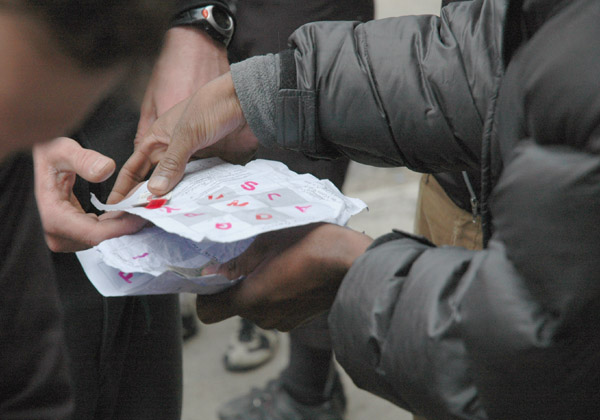
It was a perfect morning for an alley cat race, and Payton put together an outstanding course. He called it Tic Tac Toe, though it more closely resembled Bingo or, a propos, an Easter egg hunt. It tested not only a rider's speed and bike handling but also his guile, game theory and knowledge of Chicago geography.
Each rider was given a unique grid of nine squares. Each square contained an address. At each address was hidden a rubber stamp. The objective was to locate the rubber stamps and use them to mark the grid, with points being awarded for each three-in-a-row. There was also a time incentive, so a rider had to decide how many rows it paid to pursue. No good collecting the maximum eight if it took all morning to do so.
The race kicked off with a bonus sprint from Pilsen to 141 N. Wabash, and for me this was the most exciting part of the day. I was riding a proper road bike, not the lumbering winter bike I'd used at the first stage, so I could keep up with the leaders this time. We left Pilsen in a pack of about 15, but when we hit downtown I called "Clear!" at an intersection and was surprised to look back and find nobody there: We were down to nine. I was the ninth.
I fought to hang on. At one point I got dropped -- getting dropped from a paceline is surprisingly emotional, like getting ditched by your friends at the mall, and it invites the same insecurities: I'm not good enough ... They don't love me ... Why am I the way I am? -- but I dug deep to rejoin the group and enjoy the twin benefits of its slipstream and its sense of direction.
We were heading up State near Marshall Field's when the group suddenly stopped: It had overshot the destination, which appeared to be the subway entrance at State and Monroe. The two riders ahead of me dismounted and started running down the stairs with their bikes, shoes clicking and clacking on each granite step. I followed, and sure enough a race official was waiting for us at the bottom. Thus I was third to complete the sprint -- my first podium finish!
In full stride I grabbed a ticket from the official -- the ticket would prove the order of our finish -- and dashed up the escalator to start completing my grid. I'd mapped out what I thought was an efficient way to complete two rows, but I couldn't find the rubber stamp that Payton had hidden at 31 W. Jackson -- I scoured the Red and Blue Line stations but somehow couldn't find the pedway that connected them -- so I ended with four stamps but only one row. Nonetheless, I was the second person to arrive at the finish line, West Town Bikes, so I earned an enormous time bonus, and I finished in fifth place overall.
Great stage, Payton. Now to get Tic Tac Toe added to the Tour de France.
Photo taken: March 27, 2005
March 21, 2005
I'm drawn to the handwritten "going out of business" signs -- or, as in two of the cases here, "business is going elsewhere" signs -- that are so common in a city in flux. Each one hints at untold pathos and drama, and the worse the grammar, the more I am drawn to them.
This first is a favorite. It belongs to a store that sells phone cards and shoes -- talk about synergy -- that had been located a few doors south of Broadway and Bryn Mawr but moved into the corner space when the discount clothing store closed this winter. Now it has moved back, and the move apparently took four hours longer than expected.

Broadway and Bryn Mawr.

4620 N. Broadway St.
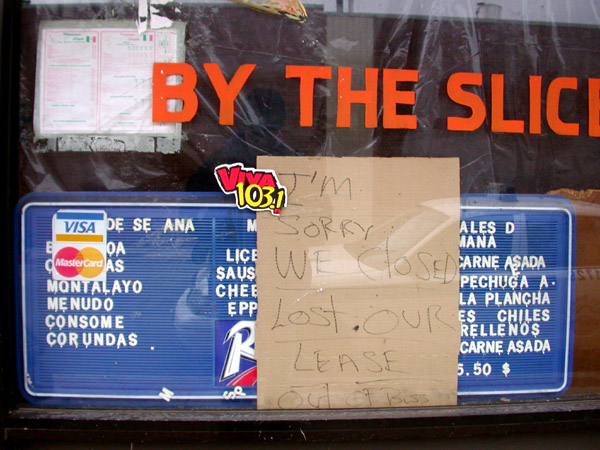
5525 N. Clark St.
Photos taken: March 18, 2005; Jan 12, 2005; Nov. 30, 2004

I've got a ticket to ride. And a sticker.
To review: Earlier this year I competed in my first race. Then I joined a racing team, and now I have a racing license. This week I will probably buy my first racing bike.
My guess is that most people would have done all that in the reverse order.
In cycling your age is rounded up, so my "racing age" is a premature 30. It's official: I'm a senior citizen. In baseball, geezers are called "old timers," but in endurance sports like running and cycling, they we are called "masters," and I am eligible to race as a "master," a label that belies my total lack of experience and talent.
Photo taken: March 19, 2005
March 19, 2005

Good morning.
Photo taken: March 13, 2005
March 18, 2005
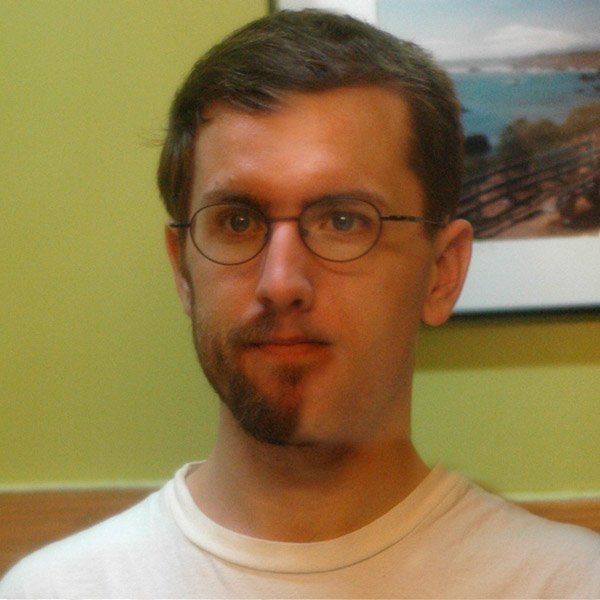
To protest a disagreeable work assignment, I went on a grooming boycott for five weeks. I still showered, usually, but went without shaving.
Granted, this was about as mature as the time in college when I "protested" a particularly boring professor by not studying for his final. This will teach him! But this time it worked. Awareness was raised. Concessions were made.
To celebrate a return to my old schedule, I indulged in a professional shave, my first.
My barber is a throwback, the classic white man's barber. He is not a stylist. He runs a barbershop, not a salon, and for $13 you get exactly what you came for: a straight eye for the straight guy. Bad jokes are told, baseball wisdom is exchanged, the weather is bemoaned.
There are Maxims and Stuffs among the magazines, and I'm sure a guy could get something racier if he asked for it, but there's never any need: There are never more than two customers there, and the wait is never long. Usually when I arrive my barber is waiting in the chair smoking a cigarette, or there is a note on the door saying he's out to lunch and will be back by 3.
As I sat with a hot towel wrapped around my face, my nose sticking out like a periscope, I wondered how much longer this place would last. It can't be much longer, and I file it and other white-man barbershops with the many civic institutions -- bowling alleys, corner hardware stores, hot dog stands -- that are fading away as my city changes. Surely this location will soon be a bank or gourmet grocery or -- deep, mournful sigh -- a salon.
For the record: A shave and haircut? 232 bits, plus a 32-bit tip.
Photos taken: March 17-18, 2005
March 15, 2005
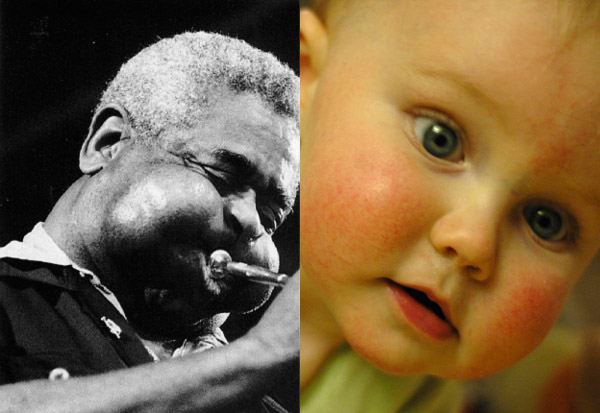
Separated at birth?
I worry about his lung capacity, however, and what it means for his trumpet career. He didn't cry or wail once over the weekend. Instead he expresses distress with series of hoarse bleats. Sounds like a ton-ton from "Empire Strikes Back."
Photo taken: March 12, 2005
March 14, 2005
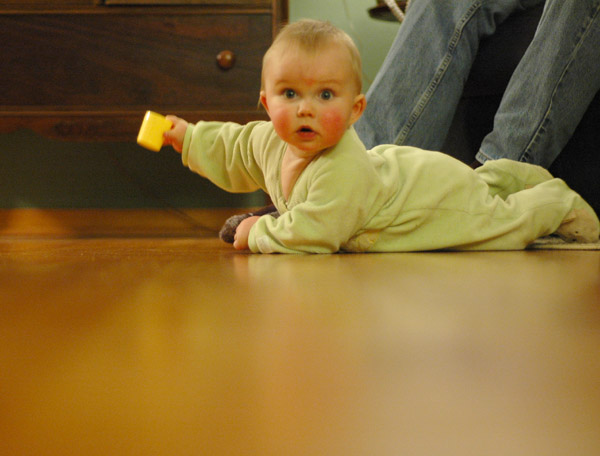
This is how my nephew Malcolm occupies himelf when he isn't blogging.
He's not quite crawling. When he pursues an objective -- his father is a frequent one -- he rolls over and over until he reaches it. Or he'll do a five-point army crawl, with his elbows, thighs and belly touching the ground. He tends to favor one of his legs when he does this, so it's as if he's a wounded soulder dragging a bum leg across no-man's land, except with more giggling.
Photo taken: March 12, 2005
March 11, 2005

From BP Bridge.
Photo taken: March 5, 2005
March 8, 2005
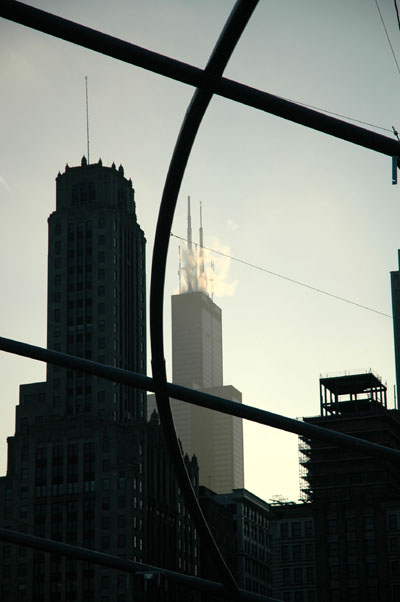
Sears Tower lets off steam at dusk.
Photo taken: March 5, 2005
March 7, 2005
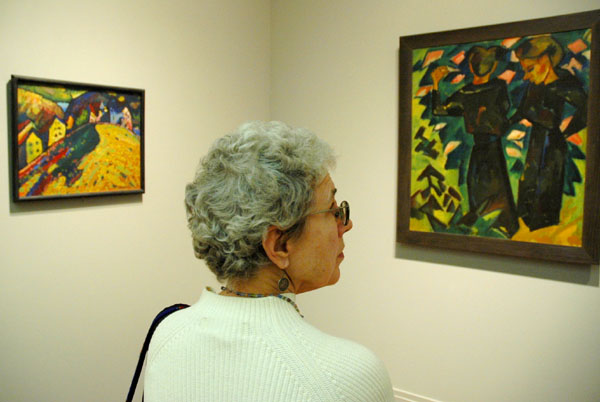
Mom at the Art Institute.
Photo taken: March 5, 2005
March 5, 2005
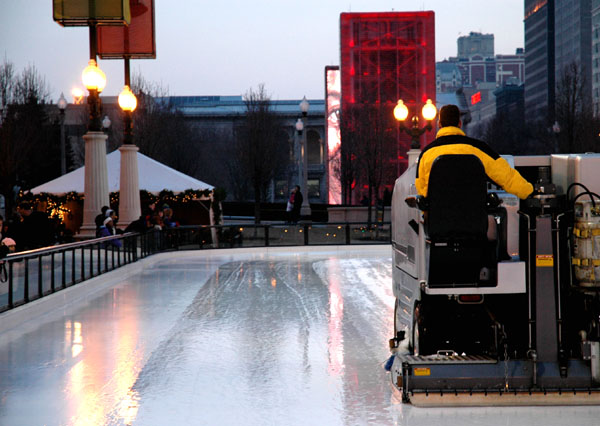
Zamboni time at the McCormick Tribune Ice Rink.
Photo taken: March 5, 2005
March 2, 2005
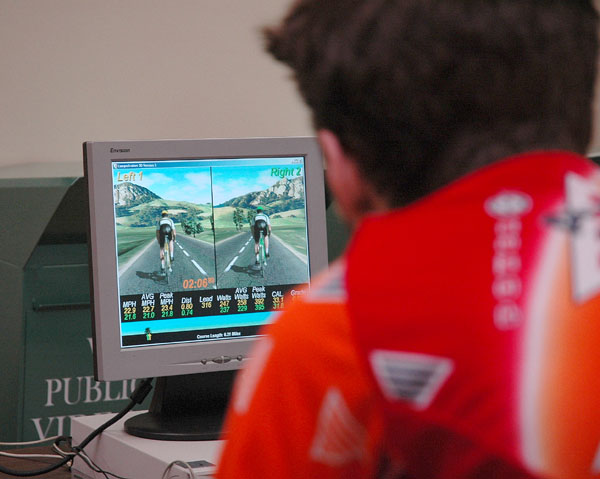
I rode in my second race this weekend. In January I had done an alley cat race, but this was my first sanctioned race, a 10K time trial in Wheaton.
It is still winter in Illinois. The cold is no obstacle to alley cats, but the spandex crowd is a more delicate bunch, so the race was held indoors on trainers. Riders are racing against the clock but ride head-to-head against an opponent. Split-screen digital avatars show their status. It's like a NASCAR race being held at an arcade with Pole Position and a sack of quarters.*
I knew going in that it was a little ridiculous. The $25 entry fee was a lot of money to spend just for 15 minutes on a trainer. That's almost $2 a minute. I have hired I have read, in the New Yorker, of hookers who cost less by the minute. Nonetheless, a co-worker had done it and reported that it was fun, so I decided to give it a go.
Before the race a volunteer gave me some basic advice. Go smooth to start, he said, to get a feel for the trainer. At three miles start going hard and fast, then gas it for the final 200 meters.
The trainer was similar to the one I've been using at home, but at home I can do easily do 10K in under 15 minutes. It must not be calibrated correctly. The resistance here was much greater. As soon as I started I knew I'd have to gut it out just to break 17 minutes.
My racing partner was about 15 years older than me. He matched my 21 mph pace for the first three miles, tailing me by about 5 yards. I wanted to yell at him to stop drafting. Once I goosed it to 23-25 mph, however, he fell from vision -- insofar as he disappeared from the screen but continued to pedal three feet to my right.
By the end I was in my highest gear -- I'm still learning; would I have been better in a lower gear but with a higher cadence? -- and giving it everything. Between wheezes I growled. Had I not been plugged into my sprint mix I might have let up. Head down and blind to the finish line, I finished in 16:35. Slower than fair, but faster than middling.
I'm not licensed yet so I raced as a "citizen" and was the second of three citizens in my age group. Had I been with the Cat 4 riders I would have finished 16th out of 40.
While I cooled down, the volunteer I'd talked to earlier asked how I did.
"Personal record," I said.
He was thrilled. He slapped his hands together, then caught himself short. "Hey, didn't you say this was your first time?"
"Yes, and?"
He said I don't get to claim a PR until I've done a race twice. So I guess I'll do it again, but I'll wait until April when there will be one held at Navy Pier. This was fun but wasn't worth leaving city limits for.
* I described the race at the Oscar party Sunday night. Someone suggested that a footrace could be held using treadmills, in which case two people could hold a ribbon and run toward the winner as he finishes. I thought it was a brilliant idea.
Photo taken: Feb. 27, 2005
Feb. 28, 2005
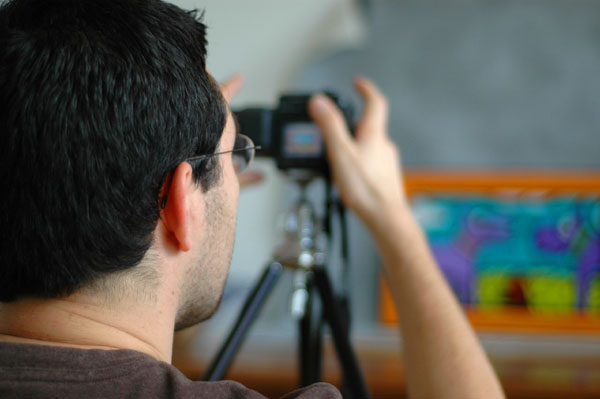
For four years Sandy and I have volunteered at the Inspiration Cafe, an organization that provides meals, job training and other important services for those in need in Uptown. The Cafe's major fundraiser is an annual art auction, a gala sale of dozens of juried pieces donated by local artists.
It was at last year's auction that I bought my very first piece of art, an abstract painting of an El platform at sunrise. What's funny is that earlier that day I had helped hang the art and came very close to hanging it upside down. Such is abstract art.
Later, during the silent auction, an older gentleman was looking at it and asked for my help in seeing the El. "I just don't see it," he said. I studied it and suggested where the platform was. A few more moments and I could make out the El speeding by. The more I looked at it the more I liked it. It reminded me of countless Thursday mornings bicycling down Broadway, parallEl, to cook breakfast at the Cafe.
"Well, I just don't see it," he said, "but I like it." He put in a bid at $55. Once he left, I put in a bid at $60 and later increased it to $85 in order to win.
This year's auction is March 18. This weekend Sandy and I photographed all the art to be auctioned. Sandy will put the pictures online. There are a lot of great pieces this year, some of which I'll surely bid on. Perhaps I'll make my second art purchase, though you are encouraged to try to stop me.
Photo taken: Feb. 26, 2005
Feb. 22, 2005
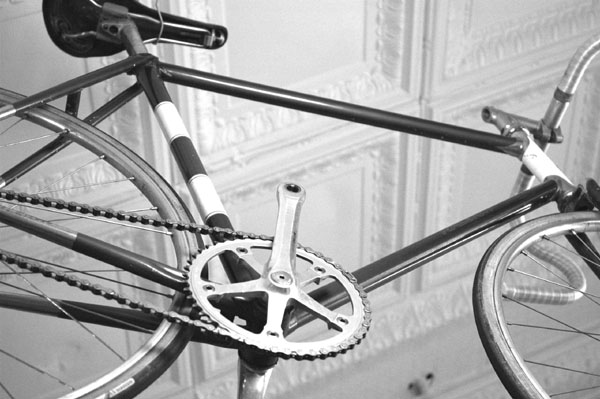
At Boulevard Bikes.
I have a fetish for fixed-gear bikes. My eyes follow fixed-gear messengers as they glide down the street, and when I see a fixie parked I will stop for a few seconds to study and admire it.
The fixie makes perfect sense in Chicago, where the only hills are overpasses and it behooves a rider to have fewer parts that can get gunked up by salt and oil. But I could never have one of my own.
There are two ways to get a fixie: build one or buy one. I lack the mechanical proficiency to build one (my lack of bike know-how deserves a separate post and probably a proper scolding, too) and I haven't the spare cash to buy one.
And even if I could buy one, I'd be a pretender. I'd be trying to buy into a cachet. I'd be the type derided in "High Fidelity," the kind of guy who shaves his head and then claims to have always been punk.
Photo taken: Jan. 9, 2005
Feb. 18, 2005

Gus watched through her Treo.
Photo taken: Feb. 5, 2005
Feb. 17, 2005
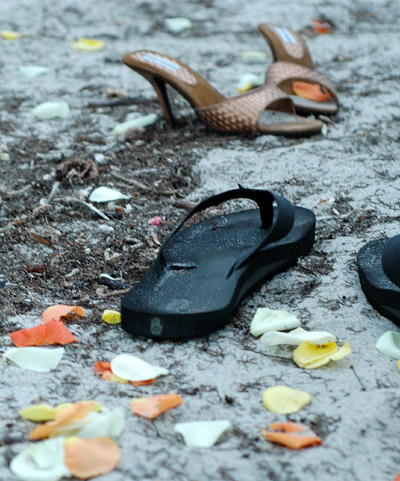
The groom wore flip-flops.
Photo taken: Feb. 5, 2005
Feb. 16, 2005

Photo taken: Feb. 5, 2005
Feb. 14, 2005
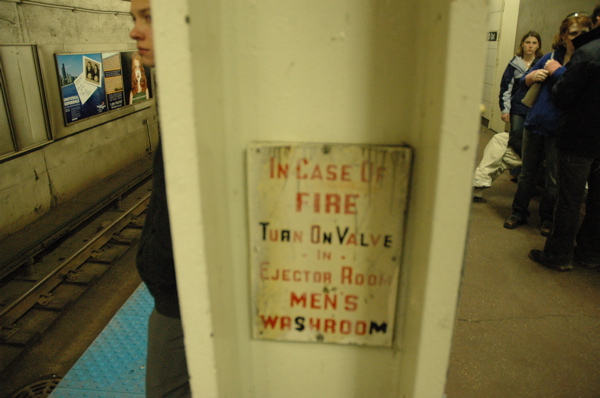
At the Grand stop on the Red Line.
I was not aware CTA stations had men's washrooms. Nor Ejector Rooms within them. Nor valves that I should turn on in case of fire.
I'm trying to imagine what the Ejector Room is like. I'm thinking it's an escape pod that CTA employees can climb into during emergencies, like the one R2-D2 and C-3PO use to escape from the Imperial boarding party. Perhaps the Ejector Room blasts the pod thousands of feet into the air, high enough for a parachute to be activated, allowing the CTA employees to float down to the safety of Lake Michigan. And of course there is a valve, a valve to be turned on in the last moment before ejection, a valve that releases millions of gallons of water into the subway bowels to put out any fires.
Note to self: Get condo board's permission to build an Ejector Room.
Photo taken: Feb. 11, 2005
Feb. 13, 2005

At the Garfield Park Conservatory.
Photo taken: Feb. 12, 2005
Feb. 11, 2005

This is one of my favorite murals in the city, on the back of the Hotel Intercontinental, of all places. The adjacent building is being demolished, and I presume the condos that will rise will obscure the whales.
The mural was one of my first impressions of downtown Chicago. This was spring of 1998. Some friends and I were going to a taping of "The Jerry Springer Show." Ivan was an intern there and had gotten us tickets. We parked near NBC Tower, and I remember looking up to see this. "What a great city," I thought. "Whales! Up a building!"
Photo taken: Feb. 10, 2005
Feb. 9, 2005
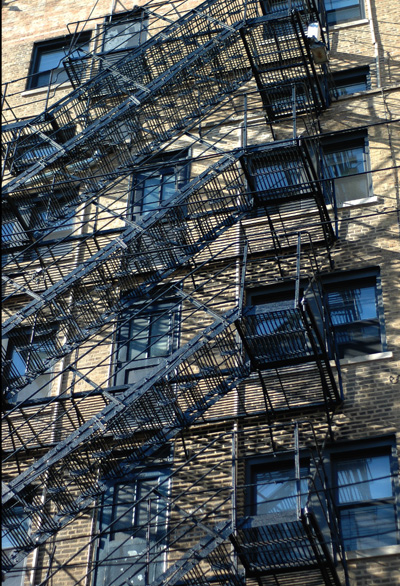
There were many reasons why California disagreed with me. One was the absence of fire escapes. And by "fire escapes" I mean to say "fire-escape parties."
Once a Chicago party has crested, people invariably head to the fire escape for some quiet time and some air. This is my favorite part of a Chicago party. It's a self-selecting group, but usually it's the people I came to spend time with in the first place.
Some will smoke. Some will lean on the railing and peel at their beer labels. And a pretty girl will sit on the step below you, point to her shoulders and use her eyebrows to say, "Rub, mister?"
It's a moment impossible in a flat land without fire escapes.
Photo taken: Feb. 3, 2005
Feb. 8, 2005

Sandy won by 20.
Photo taken: Feb. 3, 2005
Feb. 7, 2005
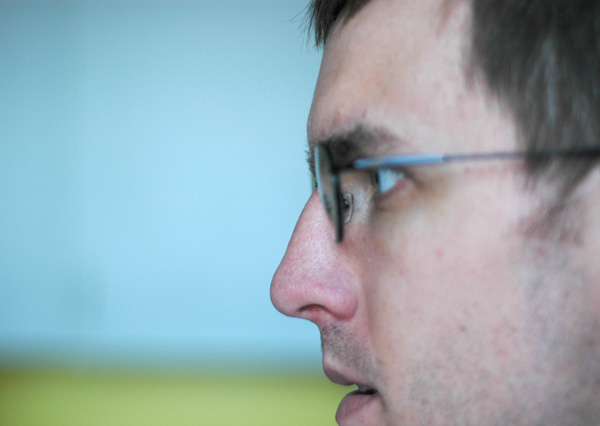
Based almost entirely on Matt's advice I invested in a 50mm f/1.8 lens. I couldn't wait for the sun to come up in the morning so I could play with it. Here's one of the first test shots. Dig that shallowness!
The depth of field is impressive, too.
Photo taken: Feb. 3, 2005
Feb. 5, 2005
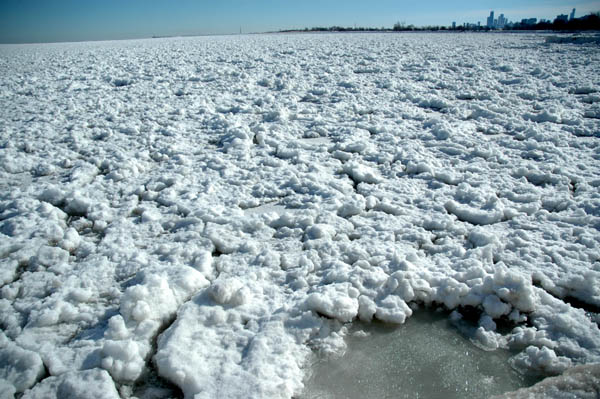
The skyline, from near Foster Avenue Beach.
Photo taken: Jan. 27, 2005
Feb. 4, 2005
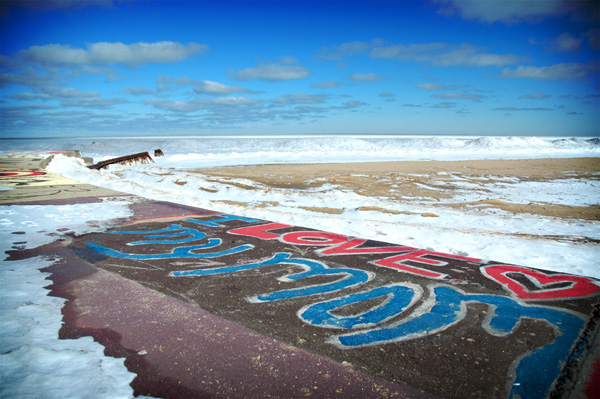
Near Foster Avenue Beach, with fake Lomo affect applied afterward.
In all things purity, and for me that includes photography. I'm suspicious of photos that have been manipulated in the lab in Photoshop. It speaks to my journalism background: I believe that any photo, whether a .jpg or a print, should faithfully depict what the photographer saw through her viewfinder.
Add some extra contrast here and some masking there and a photo ceases to be a photo and starts to be an illustration or a drawing or a lie. For this reason I tend to be dismissive of the Flickr group Technique: Too many of the threads have to do with aftereffects. For me, technique stops once the shutter is released.
But this photo needed some help. I'd accidentally been overexposing everything I shot at the rocks on this day but I was keen on salvaging this shot. Thus the fake Lomo effect, which I hope elevates a bad photo to an average one.
Photo taken: Jan. 27, 2005
Feb. 2, 2005
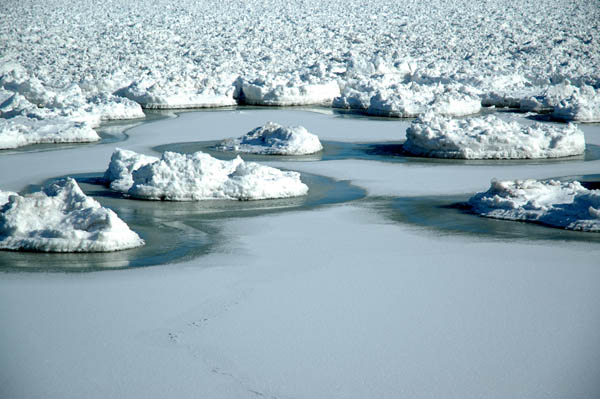
Near Lawrence Avenue.
Photo taken: Jan. 27, 2005
Feb. 1, 2005
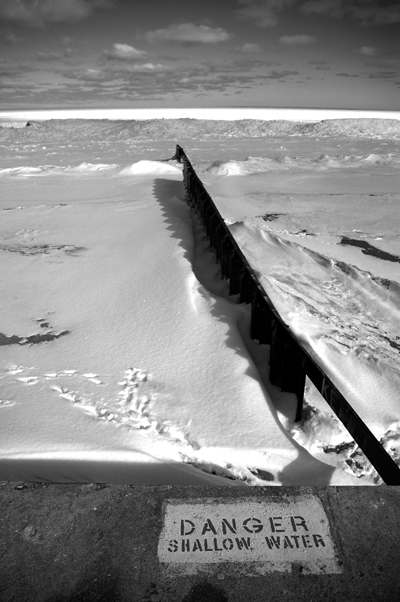
Foster Avenue Beach.
Photo taken: Jan. 27, 2005
Jan. 29, 2005
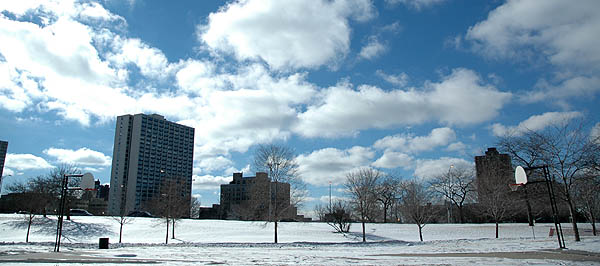
Basketball court at Foster Avenue Beach.
Photo taken: Jan. 27, 2005
Jan. 28, 2005
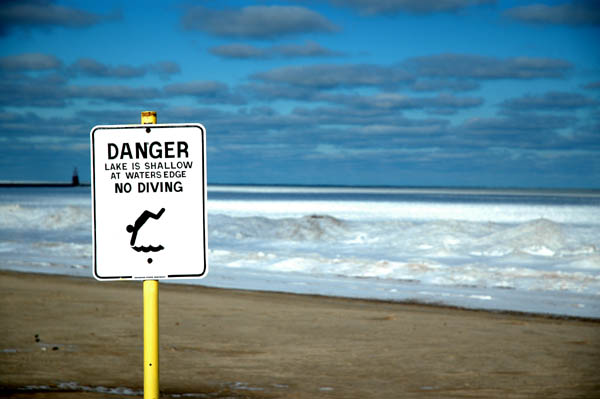
Foster Beach.
Photo taken: Jan. 27, 2005
Jan. 27, 2005
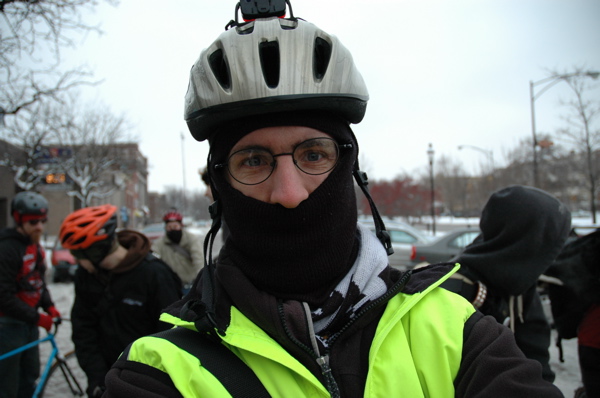
More on why it's important to bike to work during winter, which I try to do at least three times a week: On the off chance that people see me and do not say, "Look at that bad-ass who rode in during a blizzard," I can at least hope they say: "Look at that pansy Luke. If he can ride to work in the middle of winter, what excuse will I have not to ride come June when it's pleasant out?"
Photo taken: Jan. 9, 2005
Jan. 26, 2005
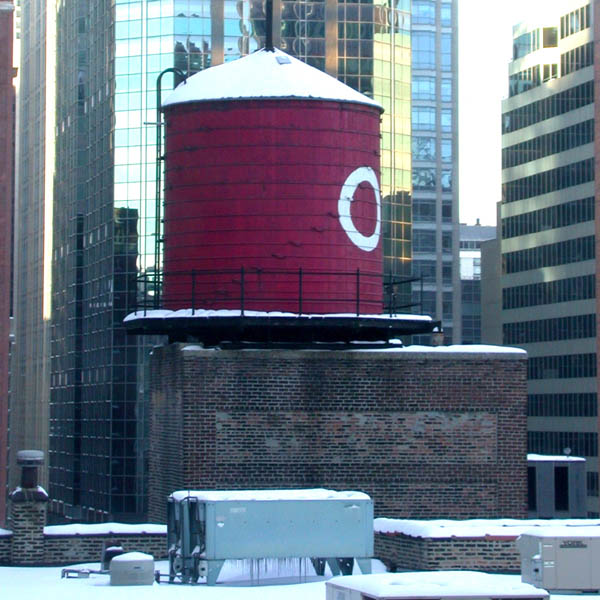
The Optimus water tower, at Grand and St. Clair. I'm not aware of any other rooftop towers left in River North, and there are few left anywhere downtown.
Photo taken: Jan. 23, 2005
Jan. 25, 2005
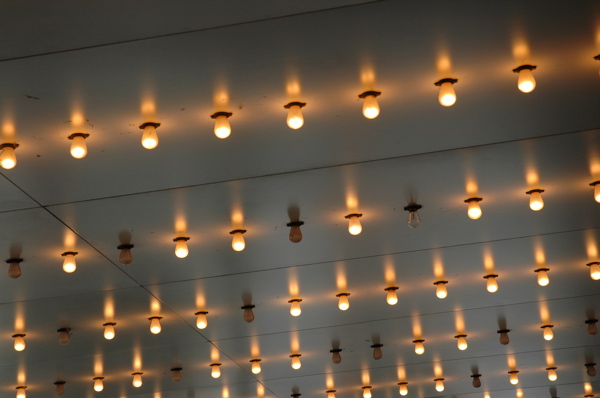
Outside the Esquire.
Photo taken: Jan. 3, 2005
Jan. 23, 2005
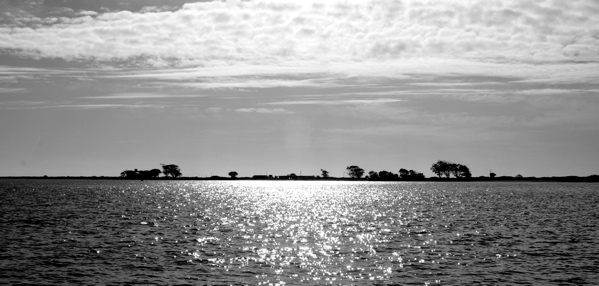
Humboldt Bay.
Photo taken: May 8, 2004
Jan. 22, 2005
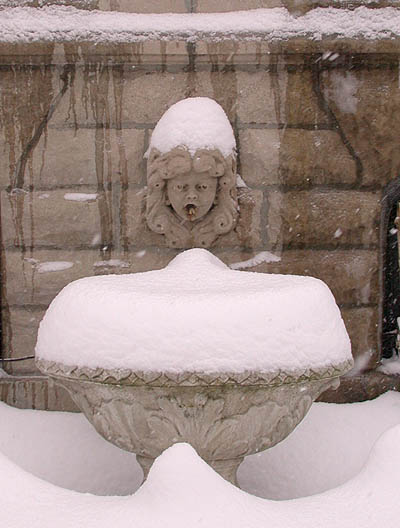
On Berwyn.
Photo taken: Jan. 22, 2005
Jan. 21, 2005
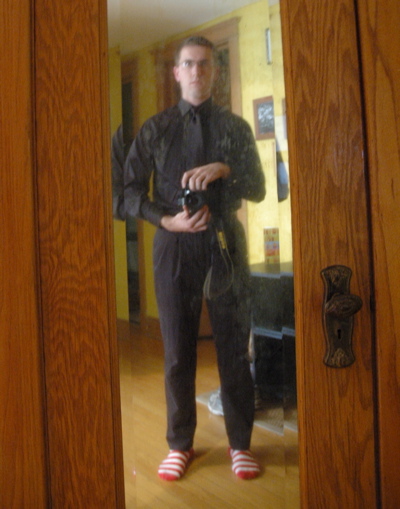
I wear the black for the poor and the beaten down,
Livin' in the hopeless, hungry side of town,
I wear it for the prisoner who has long paid for his crime,
But is there because he's a victim of the times.
And I wear it for the thousands who have died,
Believin' that the Lord was on their side,
I wear it for another hundred-thousand who have died,
Believin' that we all were on their side.
Johnny Cash
To show my enthusiasm for the inauguration, I wore black to work. The get-up got scores of double-takes, though probably more for the tie than for the black. Since my interview I've worn a tie inside the building fewer than a dozen times, usually on Election Day.
By the end of the night I conceded that I looked less like "subtle political statement" than "gangster intern."
Photo taken: Jan. 20, 2005
Jan. 20, 2005

It's Mom's birthday today, and this is perhaps my favorite picture of her. She's holding her grandson Malcolm, and there's something about it that captures her essence, equal parts focus, empathy and skill.
I've cycled 160 miles in one day and run 26 miles on several others, but when it comes to feats of endurance and strength I have nothing on her.
Photo taken: Aug. 27, 2004
Jan. 18, 2005

Near Foster and Glenwood.
Photo taken: Jan. 12, 2005
Jan. 16, 2005
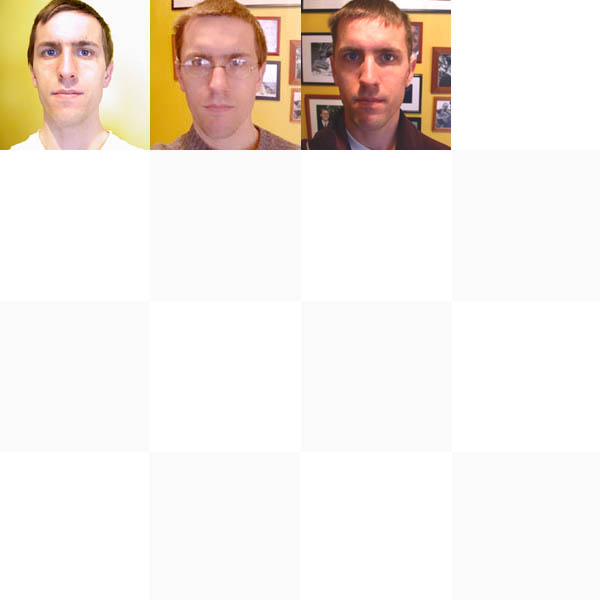
I started taking annual pictures when I moved into my place two years ago. In retrospect I should have chosen a spot that gets better light.
Photos taken: Jan. 16, 2003; Jan. 16, 2004; Jan. 16, 2005
Jan. 14, 2005
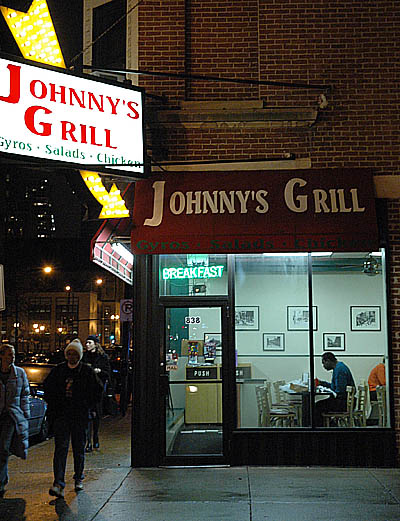
One of downtown's last great dumpy hot dog stands, near State and Chicago.
And that's pretty much what I told the proprietor, a beefy man of indistinct ethnic origin whom I hadn't seen smoking outside, when he came over and asked why the hell I was taking a picture of his dumpy hot dog stand.
Photo taken: Dec. 30, 2004
Jan. 12, 2005
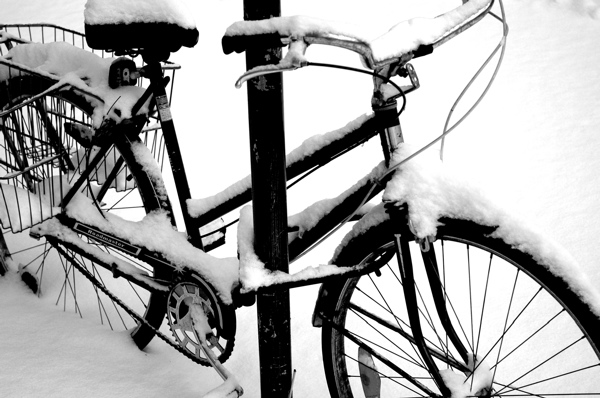
On Bryn Mawr, near Glenwood. Always breaks my heart to see a bicycle left out in weather like this.
Photo taken: Jan. 6, 2005
Jan. 10, 2005
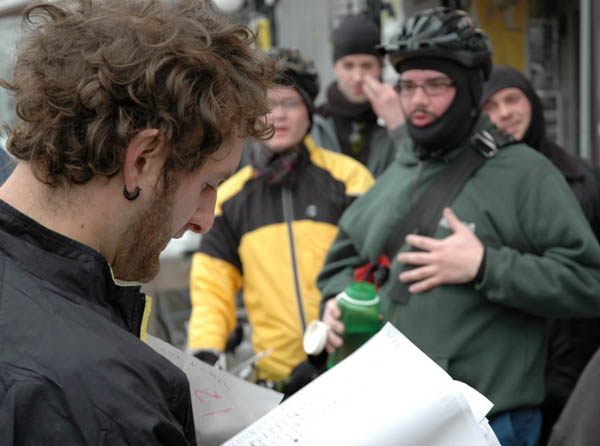
In interviews with riders that I've read and in conversations I've had with them, the same thing always comes up: The best part was the suffering ...
After the finish all the suffering turns to memories of pleasure, and the greater the suffering, the greater the pleasure. That is Nature's payback to riders for the homage they pay her by suffering. Velvet pillows, safari parks, sunglasses: People have become woolly mice ... Nature is an old lady with few suitors these days, and those who wish to make use of her charms she rewards passionately.
That's why there are riders.
Suffering you need; literature is baloney.
Tim Krabbe, "The Rider"
Upon reading "The Rider" this fall I decided that 2005 would be the year I started racing. In the book, the narrator starts his career at 29 and finds it isn't too late to have success. Having just turned 29, I took this as a sign.
My racing career started sooner than I expected when Bob invited me to the prologue to the 7th Annual Tour da Chicago, a multistage alley cat race.
The first heat was an 11-mile out-and-back from Boulevard Bikes in Logan Square to Kopi Cafe in Andersonville. Of 51 riders, 26 would advance. I was riding Faith, my mountain bike -- I don't allow Charity, my road bike, out in winter -- and didn't expect to advance past the first heat. Indeed, I got dropped immediately. A half-mile from the checkpoint I passed a 12-strong paceline going the opposite way on Foster, meaning that after only five miles, I was a mile behind the leaders.
Just about everyone had a better bike and more experience, but knowledge of far-north geography -- stoplight patterns, which streets were likely to be plowed, which streets were one-way and in which direction -- was an advantage unique to me. It probably earned me two or three spots in the results.
There was a moderate headwind on the return trip. Four of us drafted together down Damen and Diversey, though it wasn't nearly as organized as a proper paceline. By the time we got to Logan we were down to three. A sprint -- not my strength -- appeared imminent. On the final turn to Kedzie, however, we found ourselves looking into the business end of an Econoline van. We halted at the curb. I got to a slower restart than the other two, but after they both wiped out in the slush I was able to be first to the finish line.
In the picture the race coordinator is reading off the names of the 26 riders who would advance to the second heat. My name would not be called, sending me flashbacks of various game-show and middle-school basketball team tryouts.
I recognized a reporter and photographer from a local newspaper. Bob lamented their presence. "They did nothing to build this, yet they seek to benefit." His position is at once correct and untenable. The media did nothing to build the Tour de France or the Super Bowl, either.
Still, he's right: There is the danger that once the newspaper validates the coolness of an alley cat race, the next stage will attract the city's squares, trendoids or, worse, cops. I myself would not have been there had I not read about it in the Reader last year, and I was well aware that surrounded by messengers and mechanics I was The Square in the Room. (If I were ever not TSitR I might have been uncomfortable.) But at the next stage I will be there not because I'd read about it, but because I was at the last stage and it kicked ass.
Photo taken: Jan. 9, 2005
Jan. 9, 2005

Anybody who wants to work out the mathematics can be a limit player and chisel out an existence. You just have to condition yourself to sit there and wait ...
Limit poker is a science, but no-limit is an art. In limit, you are shooting at a target. In no-limit, the target comes alive and shoots back at you.
Jack Strauss, as quoted in A. Alvarez' "The Biggest Game in Town"
We usually play dealer's choice, which means all sorts of froufrou variations like Anaconda, Follow the Queen and anything more dignified than placing cards to our foreheads, but tonight we played no-limit Texas hold 'em. Serious poker, serious stakes. The buy-in was $20. Blinds started at .25/.50 and escalated every 45 minutes.
I did OK for myself. I've been playing some limit online with play money but I figured the edge it gave me would be modest at best. Limit may teach you how to play, but it doesn't teach you how to bet.
Fortunately for me, my opponent in the showdown assumed I knew what I was doing. Ben figured a weak pre-flop raise meant I had less than the pocket kings that I did. I won the hand, momentum shifted, and when he went all-in on the flop with a pair of pocket jacks, my set of 7's stood up.
I don't know how Stephen Elliott does it. He must take notes. His Poker Reports for McSweeney's are full of the personality, mood and nuance that make poker worthwhile. He somehow recounts all the minute details that I usually have forgotten by the next morning, forming them into a whole that transcend the parts' sum. That's what writers do, I guess. I don't even remember that many hands. Sandy remembers that I knocked him out with two pair -- 10's and 6's -- but my mind was too distracted by my heart's palpitations to remember anything of consequence.
Photo taken: Jan. 8, 2005
Jan. 7, 2005
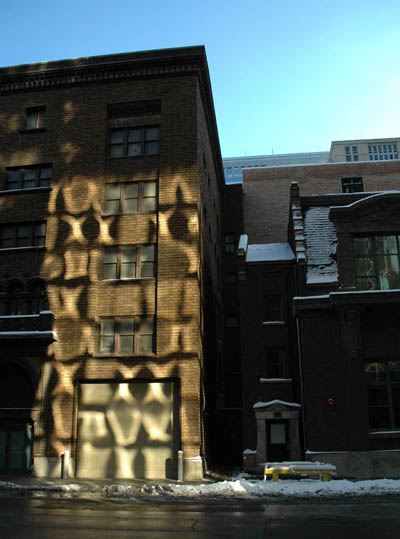
Light was bouncing off a skyscraper and casting an interesting pattern on Bloomingdale's.
Photo taken: Jan. 6, 2005
Jan. 6, 2005

Hancock Center.
Photo taken: Jan. 3, 2005
Jan. 5, 2005
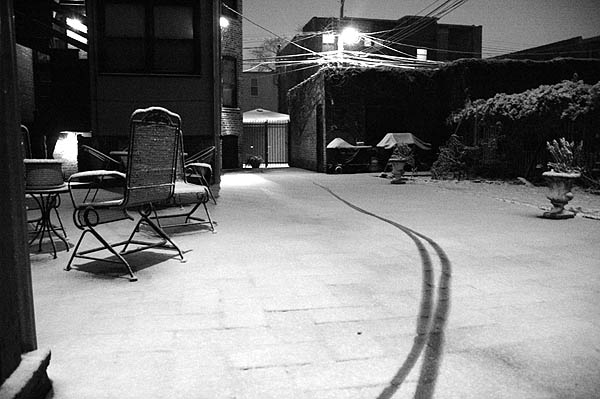
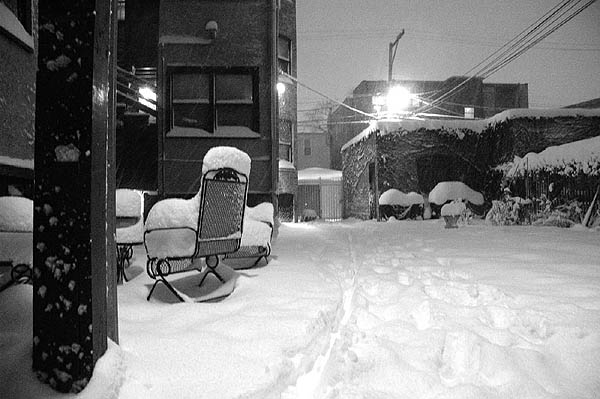
I always make a point of commuting by bike during the season's first heavy snow. I like to think that the tracks in the morning will set an example for my neighbors -- and be a reminder of who the biggest bad-ass in the building is.
Photos taken: Jan. 4-5, 2005
Jan. 3, 2005
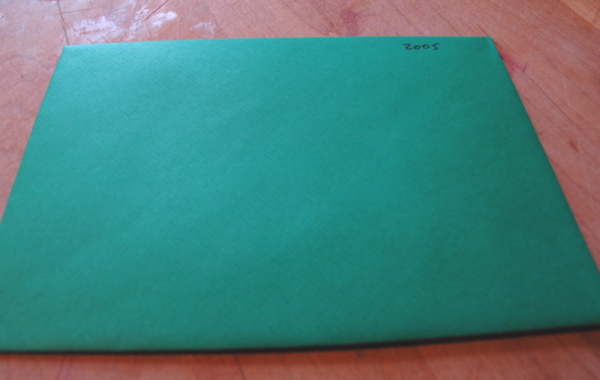
I started making resolutions and sealing them in envelopes in 1999. There are 13 for 2005.
My record so far:
1999: 3 for 22
2000: 11 for 24
2001: 13 for 31
2002: 3 for 17
2003: 9 for 20
2004: 3 for 20
Total: 42 for 134
.313. Sammy Sosa should be so productive. Then again, I've always been more about average than hitting home runs.
Photo taken: Jan. 2, 2005
Jan. 2, 2005
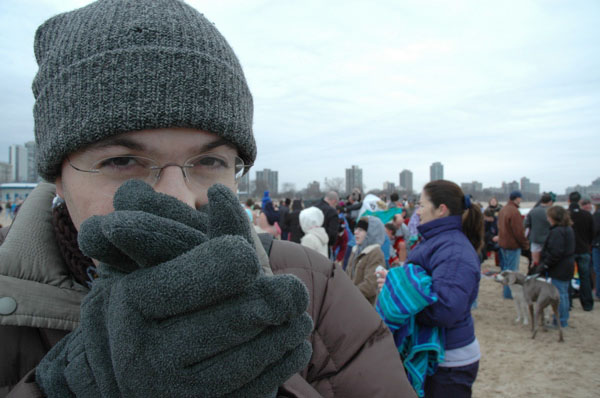
The human body loses heat in three areas: the groin, the armpits and the head. Submerging all three (in Chicago, the head must be dunked for the plunge to be official) can cause hypothermia, leaving the victim drowsy, confused and uncoordinated. It also leads to a massive spike in blood pressure.
Julie Deardorff, Chicago Tribune, Jan. 2, 2005
This was my second time doing the North Avenue Beach polar bear swim. I don't remember there being ice in 2004. To get to the water this year we had to walk gingerly across four feet of jagged, icy shoreline. It was, ho ho, the polar opposite of walking barefoot across hot coals.
Sandy agreed to be my caddy, and it's a good thing he did. Coming out of the water I was disoriented and couldn't find where I'd left my things. I was frantic. But just when I thought my feet had become solid blocks of ice and I'd never tap-dance again, I saw Sandy waving my towel, like a battle flag rising out of the fog of war.
Drowsy? Check. Confused? Check. Uncoordinated? Check. But that's how I spend the first few hours of most days, so I don't know if the water is entirely to blame.
Photo taken: Jan. 1, 2005
Jan. 1, 2005
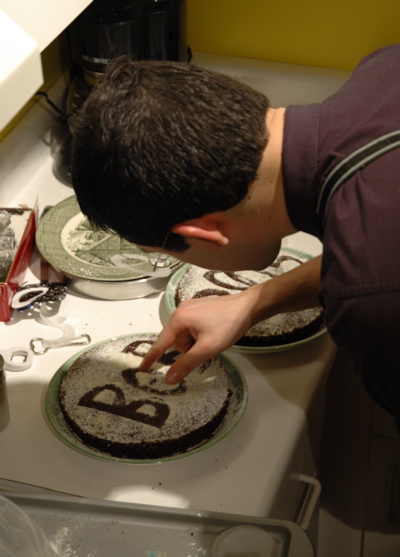
On Bob's 30th birthday he and I co-hosted a New Year's party. Sandy and Sarah made the cake.
It turned out to be one of the better parties I've been to, and I say this with all the modesty you've come to expect from this blog.
The only unpleasantness came from a gentleman -- a friend of a friend of Bob's -- who left a little bit of himself on the back patio. I was up at 10:30 this morning cleaning it up. He apparently liked our radishes, which is remarkable. Have you ever seen someone actually eat the radishes off a vegetable platter? I have not, but I have now seen what happens when one uneats them. A cracking start to the year.
Photo taken: Dec. 31, 2004



























































































































































